- How it works
Published by Robert Bruce at August 29th, 2023 , Revised On September 5, 2023

Biology Research Topics
Are you in need of captivating and achievable research topics within the field of biology? Your quest for the best biology topics ends right here as this article furnishes you with 100 distinctive and original concepts for biology research, laying the groundwork for your research endeavor.
Table of Contents
Our proficient researchers have thoughtfully curated these biology research themes, considering the substantial body of literature accessible and the prevailing gaps in research.
Should none of these topics elicit enthusiasm, our specialists are equally capable of proposing tailor-made research ideas in biology, finely tuned to cater to your requirements.
Thus, without further delay, we present our compilation of biology research topics crafted to accommodate students and researchers.
Research Topics in Marine Biology
- Impact of climate change on coral reef ecosystems.
- Biodiversity and adaptation of deep-sea organisms.
- Effects of pollution on marine life and ecosystems.
- Role of marine protected areas in conserving biodiversity.
- Microplastics in marine environments: sources, impacts, and mitigation.
Biological Anthropology Research Topics
- Evolutionary implications of early human migration patterns.
- Genetic and environmental factors influencing human height variation.
- Cultural evolution and its impact on human societies.
- Paleoanthropological insights into human dietary adaptations.
- Genetic diversity and population history of indigenous communities.
Biological Psychology Research Topics
- Neurobiological basis of addiction and its treatment.
- Impact of stress on brain structure and function.
- Genetic and environmental influences on mental health disorders.
- Neural mechanisms underlying emotions and emotional regulation.
- Role of the gut-brain axis in psychological well-being.
Cancer Biology Research Topics
- Targeted therapies in precision cancer medicine.
- Tumor microenvironment and its influence on cancer progression.
- Epigenetic modifications in cancer development and therapy.
- Immune checkpoint inhibitors and their role in cancer immunotherapy.
- Early detection and diagnosis strategies for various types of cancer.
Also read: Cancer research topics
Cell Biology Research Topics
- Mechanisms of autophagy and its implications in health and disease.
- Intracellular transport and organelle dynamics in cell function.
- Role of cell signaling pathways in cellular response to external stimuli.
- Cell cycle regulation and its relevance to cancer development.
- Cellular mechanisms of apoptosis and programmed cell death.
Developmental Biology Research Topics
- Genetic and molecular basis of limb development in vertebrates.
- Evolution of embryonic development and its impact on morphological diversity.
- Stem cell therapy and regenerative medicine approaches.
- Mechanisms of organogenesis and tissue regeneration in animals.
- Role of non-coding RNAs in developmental processes.
Also read: Education research topics
Human Biology Research Topics
- Genetic factors influencing susceptibility to infectious diseases.
- Human microbiome and its impact on health and disease.
- Genetic basis of rare and common human diseases.
- Genetic and environmental factors contributing to aging.
- Impact of lifestyle and diet on human health and longevity.
Molecular Biology Research Topics
- CRISPR-Cas gene editing technology and its applications.
- Non-coding RNAs as regulators of gene expression.
- Role of epigenetics in gene regulation and disease.
- Mechanisms of DNA repair and genome stability.
- Molecular basis of cellular metabolism and energy production.
Research Topics in Biology for Undergraduates
- 41. Investigating the effects of pollutants on local plant species.
- Microbial diversity and ecosystem functioning in a specific habitat.
- Understanding the genetics of antibiotic resistance in bacteria.
- Impact of urbanization on bird populations and biodiversity.
- Investigating the role of pheromones in insect communication.
Synthetic Biology Research Topics
- Design and construction of synthetic biological circuits.
- Synthetic biology applications in biofuel production.
- Ethical considerations in synthetic biology research and applications.
- Synthetic biology approaches to engineering novel enzymes.
- Creating synthetic organisms with modified functions and capabilities.
Animal Biology Research Topics
- Evolution of mating behaviors in animal species.
- Genetic basis of color variation in butterfly wings.
- Impact of habitat fragmentation on amphibian populations.
- Behavior and communication in social insect colonies.
- Adaptations of marine mammals to aquatic environments.
Also read: Nursing research topics
Best Biology Research Topics
- Unraveling the mysteries of circadian rhythms in organisms.
- Investigating the ecological significance of cryptic coloration.
- Evolution of venomous animals and their prey.
- The role of endosymbiosis in the evolution of eukaryotic cells.
- Exploring the potential of extremophiles in biotechnology.
Biological Psychology Research Paper Topics
- Neurobiological mechanisms underlying memory formation.
- Impact of sleep disorders on cognitive function and mental health.
- Biological basis of personality traits and behavior.
- Neural correlates of emotions and emotional disorders.
- Role of neuroplasticity in brain recovery after injury.
Biological Science Research Topics:
- Role of gut microbiota in immune system development.
- Molecular mechanisms of gene regulation during development.
- Impact of climate change on insect population dynamics.
- Genetic basis of neurodegenerative diseases like Alzheimer’s.
- Evolutionary relationships among vertebrate species based on DNA analysis.
Biology Education Research Topics
- Effectiveness of inquiry-based learning in biology classrooms.
- Assessing the impact of virtual labs on student understanding of biology concepts.
- Gender disparities in science education and strategies for closing the gap.
- Role of outdoor education in enhancing students’ ecological awareness.
- Integrating technology in biology education: challenges and opportunities.
Biology-Related Research Topics
- The intersection of ecology and economics in conservation planning.
- Molecular basis of antibiotic resistance in pathogenic bacteria.
- Implications of genetic modification of crops for food security.
- Evolutionary perspectives on cooperation and altruism in animal behavior.
- Environmental impacts of genetically modified organisms (GMOs).
Biology Research Proposal Topics
- Investigating the role of microRNAs in cancer progression.
- Exploring the effects of pollution on aquatic biodiversity.
- Developing a gene therapy approach for a genetic disorder.
- Assessing the potential of natural compounds as anti-inflammatory agents.
- Studying the molecular basis of cellular senescence and aging.
Biology Research Topic Ideas
- Role of pheromones in insect mate selection and behavior.
- Investigating the molecular basis of neurodevelopmental disorders.
- Impact of climate change on plant-pollinator interactions.
- Genetic diversity and conservation of endangered species.
- Evolutionary patterns in mimicry and camouflage in organisms.
Biology Research Topics for Undergraduates
- Effects of different fertilizers on plant growth and soil health.
- Investigating the biodiversity of a local freshwater ecosystem.
- Evolutionary origins of a specific animal adaptation.
- Genetic diversity and disease susceptibility in human populations.
- Role of specific genes in regulating the immune response.
Cell and Molecular Biology Research Topics
- Molecular mechanisms of DNA replication and repair.
- Role of microRNAs in post-transcriptional gene regulation.
- Investigating the cell cycle and its control mechanisms.
- Molecular basis of mitochondrial diseases and therapies.
- Cellular responses to oxidative stress and their implications in ageing.
These topics cover a broad range of subjects within biology, offering plenty of options for research projects. Remember that you can further refine these topics based on your specific interests and research goals.
Frequently Asked Questions
What are some good research topics in biology?
A good research topic in biology will address a specific problem in any of the several areas of biology, such as marine biology, molecular biology, cellular biology, animal biology, or cancer biology.
A topic that enables you to investigate a problem in any area of biology will help you make a meaningful contribution.
How to choose a research topic in biology?
Choosing a research topic in biology is simple.
Follow the steps:
- Generate potential topics.
- Consider your areas of knowledge and personal passions.
- Conduct a thorough review of existing literature.
- Evaluate the practicality and viability.
- Narrow down and refine your research query.
- Remain receptive to new ideas and suggestions.
Who Are We?
For several years, Research Prospect has been offering students around the globe complimentary research topic suggestions. We aim to assist students in choosing a research topic that is both suitable and feasible for their project, leading to the attainment of their desired grades. Explore how our services, including research proposal writing , dissertation outline creation, and comprehensive thesis writing , can contribute to your college’s success.
You May Also Like
Welcome to the most comprehensive resource page of climate change research topics, a crucial field of study central to understanding […]
How many universities in Canada? Over 100 private universities and 96 public ones, the top ones include U of T, UBC, and Western University.
A preliminary literature review is an initial exploration of existing research on a topic, setting the foundation for in-depth study.
Ready to place an order?
USEFUL LINKS
Learning resources, company details.
- How It Works
Automated page speed optimizations for fast site performance
150 Actual Biology Research Paper Topics
Table of contents
- 1 What Is Biology? What Topics Might Biologists Study?
- 2 How to Choose a Topic for Biology Research Paper?
- 3.1 15 Developmental Biology Topics For Research
- 3.2 15 Immune System Biology Research Topics
- 3.3 15 Cell Biology Research Topics
- 3.4 15 DNA Research Topics
- 3.5 15 Molecular Biology Research Topics
- 3.6 15 Neurobiology Research Topics
- 3.7 15 Abortion, Human cloning, and Genetic Researches Topics
- 3.8 15 Environmental and Ecology Topics for Your Research
- 3.9 15 Plant Pathology Biology Research Topics
- 3.10 15 Animals Biology Research Topics
- 3.11 15 Marine Biology Research Topics
- 3.12 15 Zoology Research Topics
- 3.13 15 Genetics Research Topics
- 3.14 15 Biotechnology Research Topics
- 3.15 15 Evolutionary Biology Research Topics
Biology is one of the most magnetic fields of study these days. If you want to be a biologist or scientist in the future, there is no better time to start than right now. Biology research topics covered in this article will keep you busy and interested. Writing a research paper is one of the best ways to dip your toes into the field. Before doing that, you need to know some good topics for the research paper . They should be suitable for biology students rather than cutting-edge researchers. On Papersowl.com , we provide as many biology research paper examples as possible so that you have a huge choice.
What Is Biology? What Topics Might Biologists Study?
Biology is simply the study of everything that has a form of life. It includes investigations on plants, animals, and everything found in the environment. It is about studying how life forms grow, develop, and interact with each other. Biology essay topics for research encompass all these and more.
This science uncovers many fields where various life forms are studied. It makes sense to look through these fields to help you decide which suits you the best.
Plant Biology research topics are about studying the plants around us. They disclose information about their existence as a part of the ecosystem, their life cycle, resources they can give us, their ability to preserve them from climate changes, and so on. There are many ideas to choose from, but you must focus on a specific one.
Human Biology research topics are all about us. These topics focus on different body parts, such as the human brain, the human immunological system, the nervous system, etc. In addition, you can discuss DNA modifications in humans and explain why genetic disorders occur in your research projects. Various cell research is also common today.
Biology research topics on the environment are in great demand too. For example, climate change is becoming a more significant threat every day. By studying environmental topics in biology for projects and research, we can come up with ways to combat them and preserve ecosystems.
Microbiology research topics delve into things we can’t see. There are trillions of microbes and bacteria all around us. Knowing about them is essential to understanding what makes us sick and how to fight against them. All microbiology research paper topics are pretty complicated yet very engaging to include in your paper research.
Molecular biology topics dive even deeper into the level of atoms and molecules. The various medicines and drugs we take were all created through molecular-biology research. It is one of the areas full of ideas, but there is yet to be much evidence. Science is advancing in this realm but still needs a lot of time. Topics of molecular biology will need days for research only.
Keep in mind that there are more ideas and variations of this science. We offer more examples in further sections of the article about developmental biology, marine biology, evolutionary biology, etc. Explore them and make your writing appealing and meaningful in the eyes of a professor.
How to Choose a Topic for Biology Research Paper?
When choosing a biology project topic, you must be aware of one or more fields of science. Biology research is critical to the present world. By doing research, we can learn more about genetic disorders, immune disorders, mental health, natural disease resistance, etc. Knowing about each of these could save lives in the future.
For those who may not have the time or resources to do their own research, there are research paper writing services that can provide assistance with the project. And we are always here to help you find your own topic among interesting biology research topics. Here we prepared some useful tips to follow.
- Tip 1: The level of interest matters Pay attention to one that interests you, and you might have ideas on how to develop the topic. Passion is fundamental in research, after all.
- Tip 2: Explore the topic Try to narrow things down a bit. If the topic is too broad, you may not be able to cover all aspects of it in one research paper. If it is too narrow, the paper could end up too short. Analyze the topic and the ways to approach it. By doing so, you can strike a balance between the two.
- Tip 3: Discover the recent developments To make your research paper touchable with the present day, you must explore the latest developments in the field. You can find out what kind of research has been done recently by looking at journals. Check out research papers, topics, research articles, and other sources.
- Tip 4: Ensure to get enough resources When choosing a topic, make sure it has plenty of resources available. For example, a research paper on xenobiology or cutting-edge nanobiology might sound attractive. Still, you might have difficulties getting data and resources for those unless you are a researcher at a government lab. Data, resources, complex numbers, and statistics are all invaluable to writing a paper about these topics.
That is why we have selected a range of biological topics. The topics on this list are all hopefully exciting topics for research you could write an excellent paper on. We should also add that easy biology topics to research are rare, and a writer usually needs days to prepare and start writing. Yes, biology research topics for high school students are a bit easier, but still, they need time to explore them.
On the other hand, biology research topics for college students are far more complex and detailed. Some people prefer evolutionary biology research paper topics, and we can agree with this claim. These research areas do have a lot of potential and a lot of data to support the claims. Others prefer cell biology research topics that are a bit specific and fun. Anyway, with this article’s list of easy biology research topics, you will surely find the one matching your interest.
For those who may not have the time or resources to do their own research, there are provide assistance with the project.

Top Research Biology Paper Topics
This section contains a large selection of research biology paper topics. You will be able to find one that will suit you the best. The only thing left is to decide what variation of science you prefer. Whether you’re interested in microbiology, genetics, or any other type of science, you’ll find a topic to get you started. If you’re ever stuck or need some extra help, you can always pay someone to write your paper for you. So, take a look, and choose the perfect topic for your project!
15 Developmental Biology Topics For Research
Exploring the processes of how cells grow and develop is exciting. The human body contains millions of cells, and it’s interesting to research their behavior under different conditions. If you feel like writing about it, you can find some interesting biology topics below.
- How do stem cells form different tissues?
- How are tumors formed?
- Duplication of genomes
- Plasticity of development
- Different birth defects
- Interactions between genes and the environment
- Anticancer drugs mixtures
- Developmental diseases: Origin
- Drosophila Oogenesis
- Most deadly viruses
- Most deadly bacteria in the world
- How do germs affect cells?
- How does leukemia start?
- Development of the cardiovascular system in children
- How do autoimmune diseases start and affect the human body?
15 Immune System Biology Research Topics
For decades, many scientists and immunologists have studied the human immune system and tried to explain its reaction to various pathogens. This area allows you to deepen into it and reveal how a body protects itself from harmful impact. Look over the biology research questions below and find your match-up.
- How does the human body’s immune system work?
- The human immune system: How to strengthen it?
- What makes the immunological system weaker?
- The notion of auto-immune diseases and their effect on the body’s immune system
- The global HIV/aids epidemic
- What methods are used to prevent the spread of hives?
- Living with auto-immune diseases
- Genetics and the immune system: effects and consequences
- How do immune disorders affect the body, and what causes them?
- Are allergies signs of worrying about an immune disorder?
- DNA modification in solving immune disorders
- Stress as the biggest ruiner of the immunological system
- Vaccines as strong supporters of the immunological system
- The perception of vaccines in society
- Why do some people refuse vaccines and put others around them in danger?
15 Cell Biology Research Topics
Cell study might seem challenging yet very engaging. It will be a good idea to compare various types of cells and compare them in animals and plants. Make your choice from the list of cell biology research topics below.
- The structure of an animal cell
- Mitochondria and its meaning in cell development
- Cells classification and their functions
- Red blood cells and their function in transporting oxygen
- White blood cells and their responsibility to fight diseases
- How are plant cells different from animal cells?
- What would it be if animals had a function to photosynthesize?
- Single-celled organisms: What is it, and how do they work?
- What processes do cells go through in division?
- Invasion of bacteria into the body
- Viruses – alive or not?
- Fungi: their reproduction and distribution
- Cancer cells: Why are they so dangerous?
- What methods are used to kill cancer cells?
- The role of stem cells and their potential in a body

15 DNA Research Topics
The variety of biology research topics for college students might impress you a lot. This is a science with a large field of investigation, disclosing much scientific information to use in your project. The notion of DNA and its gist are also excellent options to write about.
- The structure of the human DNA
- The main components of a DNA chain
- Why does DNA have a double-helix spiral structure?
- The purpose of chromosomes
- MRNA and its relation to DNA
- Do single-celled organisms have DNA?
- Do viruses have DNA?
- What happens if you have too many or too few chromosomes?
- Analyzing the structure of DNA using computers
- Uses for the DNA of extinct organisms like mammoths and dinosaurs
- Storing non-genetic information in DNA
- Can you write a computer program into human DNA?
- How does radiation affect DNA?
- Modifying DNA to treat aids
- Can we fight cancer through DNA modification?
15 Molecular Biology Research Topics
Do you prefer to research molecules’ chemical and physical composition? We gathered some molecular biology research topics to make your choice easier.
- The structure and components of a gene
- How do molecules move in and out of a cell?
- The basic building blocks of life
- How are drugs designed for humans?
- How is a vaccine designed to target a specific disease?
- Dominant genes vs. recessive genes
- Prion disease – why is it so dangerous?
- Hormones and their function in the body
- Developing artificial hormones from other animals
- How to carry out a western blot?
- Testing and analyzing DNA using PCR
- The three-dimensional structure of a molecule
- What is DNA transcription, and how is it used?
- The structure of a prion
- What is the central dogma of molecular biology?
15 Neurobiology Research Topics
The more you dive into science, the more exciting things you find. That’s about biology. Here, you can choose biology research topics for high school and try to reveal more simply.
- Nervous system: its structure and function
- Neurons as unique cells playing a central role in the nervous system
- What is the maximum reaction speed in a human?
- Reaction speed: how to improve it?
- Research on Organic Farming
- What are the symptoms of Alzheimer’s disease?
- Why do we feel happy or sad?
- Headaches in terms of Neurobiology
- What are the reasons for neurobiological degeneration?
- Myths and reality of Amnesia
- What causes Alzheimer’s Disease, and what are the consequences of the disease?
- What is the treatment for Spinal Cord Injury?
- Studies on Narcolepsy and Insomnia: What are the causes?
- Is there a connection between Mental Health and Neurobiology?
- Emotions in terms of their reflection in the brain
15 Abortion, Human cloning, and Genetic Researches Topics
There are so many scientific researches and theories that society accepts or neglects. You can operate different notions and try to explain them, reflecting their advantages and downsides for a human being. We gathered some enticing life science research topics for high school students that might interest you.
- The controversy around abortion: legal or not?
- Can abortion be safe?
- Human cloning – reality vs. science-fiction
- The goals of cloning humans
- Are human cloning and transplantation ethical?
- Having a “perfect child” through gene therapy: Is it a myth?
- How far has gene therapy gone in genetic research?
- Advantages and disadvantages of gene therapy
- How gene therapy can help beat cancer
- How gene therapy can eliminate diabetes
- The opportunity to edit genes by CRISPR
- DNA modifications in humans to enhance our abilities – an ethical dilemma
- Will expensive gene therapy widen the gap between the rich and the poor?
- Cloning: the good and the Bad for a Generation
- The disadvantages of cloning
- Free unlimited checks
- All common file formats
- Accurate results
- Intuitive interface
15 Environmental and Ecology Topics for Your Research
The nature around us is so enormous and includes many branches to investigate. If you are keen on the environment and how ecology affects it, the list of follow-up biology paper topics might be helpful to you.
- The theory of evolution
- How does natural selection work?
- How do living organisms adapt to their environment?
- The concept of divergent and convergent evolution
- Building a sustainable environment
- Development of environment-friendly cities
- How to control population growth?
- Why have recycling resources become so essential in the modern world?
- The effect of plastic on the environment
- What are the global consequences of deforestation?
- What can we expect when losing biodiversity?
- Ecological damage: How to prevent it?
- How can GMO products affect ecology?
- Cloning endangered or extinct species: Is it a good idea?
- Is climate change the main reason for disrupting ecology?
15 Plant Pathology Biology Research Topics
Many factors impact human health and the quality of food products matters. These easy biology research topics will be useful if you want to describe the connection between those two concepts.
- How do plants protect themselves from diseases?
- How to increase the plant’s resistance to diseases?
- Diseases distribution among plants
- The banana pandemic
- How do herbicides influence plants?
- Corn blight
- Can any plant diseases affect humans?
- The issue of stem rust and its impact on wheat
- What approaches are used to struggle against invasive plants and affected weeds?
- Fertilizers: their pros and cons on plants
- Plant disease genetics: its system and structure
- What is the connection between ecological changes and plant diseases?
- Modifications on food production because of plant diseases
- How do fungal and viral diseases appear in plants?
- The sweet potato virus
15 Animals Biology Research Topics
It’s hard to find someone who doesn’t like animals. If you are curious about animals scientifically, here you are with biology research paper topics in this field.
- Classification of animals
- Land-based life: its evolution history
- Controversies about keeping animals as pets
- Is it ethical to test drugs and products on animals?
- Why do nature reserves against zoos?
- Evidence on prehistoric aquatic animals growing giant
- What species of animals are vegan?
- Animals and their social behavior
- Primate behavior
- How intelligent can other primates be?
- Are wolves and dogs intelligent?
- Domesticating animals
- Hibernation in animals
- Why animals migrate
- Should we bring back extinct animals?

15 Marine Biology Research Topics
The marine theme is engaging as it reveals so many interesting facts about life forms dwelling under the water. You can make your paper look captivating using biology topics in marine below.
- How acidification affects aquatic environments
- Evolution in the deep sea
- What’s the meaning of camouflage mechanism in sea life?
- Consequences of oil spills on marine life
- Oldest marine species
- How do whales communicate with each other?
- How blind fish navigate
- Are marine shows and aquariums ethical?
- The biology and life cycle of seabirds
- How jellyfish are immortal
- Plankton ecology
- Difference between freshwater and seawater marine life
- Coral reefs: their importance and evolution
- Saving and restoring coral reefs
- Life in the deep-sea ocean trenches
15 Zoology Research Topics
Zoology can be an excellent choice to write about if you are close to animal studies. Look at biology topics to research and choose the one that fits your interest most.
- Asian elephants and human speech patterns
- Oyster genomes and adaptation
- Darwin’s work in the Galápagos Islands
- Asian carp: Invasive species analysis
- Giant squids: Fact vs. fiction
- Coyote and wolf hybrid species in the United States
- Parasites and disease
- Migration patterns of killer bees
- The treatment of species in Melville’s Moby Dick
- Biodiversity and plankton
- The role of camels and the development of Africa and the Middle East
- Muskellunge and adaptive creek mechanisms to small water
- Ants and cooperative behavior among species
- Animal communication and the origin of language
- Speech in African Gray Parrots
15 Genetics Research Topics
Writing about modifications caused on the gene level is pretty challenging but very fascinating. You can select one among the biological questions for research and bring up a meaningful paper.
- Genetics and its role in cancer studies
- Can genetic code be confidential?
- Is it possible to choose the sex of a person before birth?
- Genetics as a ray of hope for children with an intellectual disability
- What factors in human genetics affect behavior?
- Is it somehow possible to improve human personality through genetics?
- Are there any living cells in the gene?
- Fighting HIV with gene mutations
- Genetic mutations
- How addictive substances affect genes
- Genetic testing: is it necessary?
- Cloning: positive or negative outcome for future generations
- Pros and cons of genetic engineering
- Is the world ready for the bioethics revolution?
- The linkage between genetics and obesity
15 Biotechnology Research Topics
The way scientists conduct research today is magnificent. Implementing high-tech innovations in biology research brings new opportunities to study the world. What are these opportunities? Explore biotechnology research topics for college students and disclose the best options for you.
- Biotechnology used in plant research
- What is the contribution of biotechnology to food?
- Pharmacogenetics: What is it, and how it works?
- How are anti-cancer drugs produced to be effective?
- Nanotechnology in DNA: How to isolate it?
- Recent nanotechnology used in HIV treatment
- What biotech apps are used to detect foodborne pathogens in food systems?
- Genotypes research: Why are they tolerant and sensitive to heavy metal?
- High-tech solutions in diagnosing cancer
- Forensic DNA and its latest developments
- Metabolic changes at the level of cells
- Nanotechnology in improving treatments for respiratory viruses
- The latest biotech discoveries
- Digital evolution: bioresearch and its transformation
- The concept of vaccine development

15 Evolutionary Biology Research Topics
Knowing how life forms started their existence is fundamental. And more interesting is to look through the evolution of many processes. If you find this trend of research more engaging, we outlined evolutionary biology research paper topics to diversify your choice.
- Darwin’s concept’s impact on science
- The evolution concept by Lamarck
- Origins of the evolutionary theory
- Evolution acceptance: a belief vs. a theory?
- Evolutionary in microbiology
- Development of robotics
- Revealing differences: human brain & animal brain
- Preservation of biological resources
- Transformations in aging
- Adaptive genetic system
- Morphometrics’ history
- Developmental theory and population genomics
- Bacteria ecology’s evolution
- Biological changes: impact and evolution
- Infectious diseases and their profession
The world of science and biology is vast, making research tedious. Use our list of interesting biology research topics to choose the best issue to write your own paper.
However, it is still hard to prepare a high-quality biology research paper, even with a brilliant topic. Not all college students can do it. Do you feel like you need some help? Then buy biology paper from our professional writers! Our experts will choose the best biology experimental research topics for you and can bring up top-level papers within the shortest time. Additionally, if you need help with a statistics project related to biology, our team of experienced professionals is equipped to provide you with the utmost quality of research and analysis.
Readers also enjoyed

WHY WAIT? PLACE AN ORDER RIGHT NOW!
Just fill out the form, press the button, and have no worries!
We use cookies to give you the best experience possible. By continuing we’ll assume you board with our cookie policy.
- How It Works
- PhD thesis writing
- Master thesis writing
- Bachelor thesis writing
- Dissertation writing service
- Dissertation abstract writing
- Thesis proposal writing
- Thesis editing service
- Thesis proofreading service
- Thesis formatting service
- Coursework writing service
- Research paper writing service
- Architecture thesis writing
- Computer science thesis writing
- Engineering thesis writing
- History thesis writing
- MBA thesis writing
- Nursing dissertation writing
- Psychology dissertation writing
- Sociology thesis writing
- Statistics dissertation writing
- Buy dissertation online
- Write my dissertation
- Cheap thesis
- Cheap dissertation
- Custom dissertation
- Dissertation help
- Pay for thesis
- Pay for dissertation
- Senior thesis
- Write my thesis
212 Unique Biology Research Topics For Students And Researchers
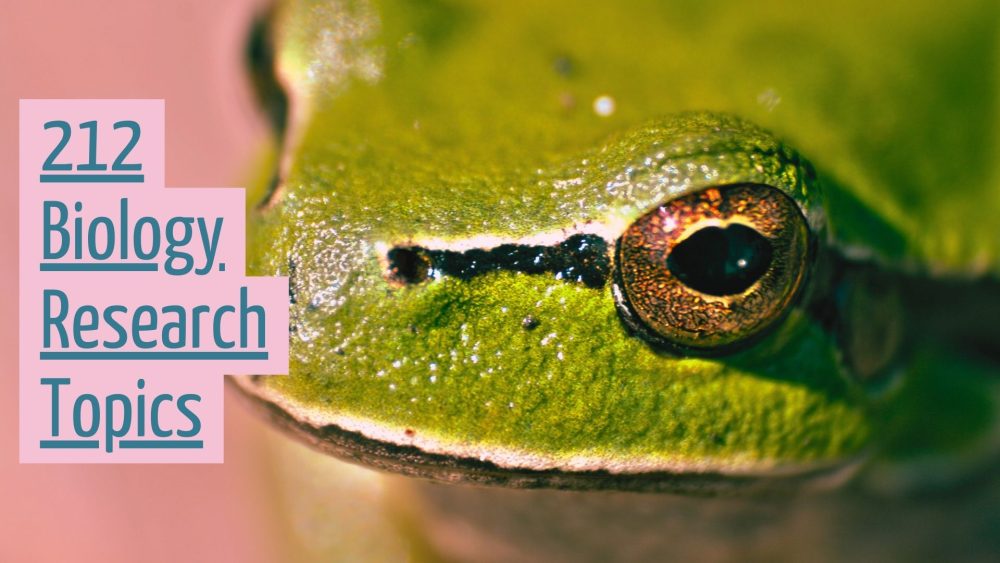
Every student studying something related to biology — botany, marine, animal, medicine, molecular or physical biology, is in an interesting field. It’s a subject that explores how animate and inanimate objects relate to themselves. The field unveils the past, the present, and what lies in the future of the relationship between the living and nonliving things.
This is precisely why you need custom and quality biology topics for your college and university essay or project. It’ll make it easy to brainstorm, research, and get to writing straight away. Before the deep dive, what is biology?
What Is Biology?
Everyone knows it’s the scientific study of life, but beyond that, biology facilitates the comprehension of living and nonliving things. It’s a branch that explores their anatomy, behavior, distribution, morphology, and physiology.
For example, it understands how genes are classified and constituted into generations. It encompasses various branches, including botany, medicine, genetics, ecology, marine biology, zoology, and molecular biology.
Here are what some of these mean:
Botany: This study of plants examines their structure, physiology, ecology, economic importance, and distribution, among others. It also deals with their biochemical processes, properties, and social interactions between plants. It extends to how plants are vital for human life, survival, and growth and how they play a significant role in stabilizing environmental health. Zoology: Zoology studies animal behavior, brain, structure, physiology, class, and distribution. It’s the general study of the lives of both living and extinct animals. It explains animal classification, the animal kingdom, evolution, habitat, embryology, and life span. Physiology: Physiology deals with the daily functions of the human body: How it works and the factors that make it work. It examines molecular behavior, the chemistry and physics behind locomotion, and how the cells in the living organisms’ body function. It helps understand how humans and animals get sick and what can be done to alleviate pain. Microbiology: Dealing with microorganisms, it examined how viruses, algae, fungi, bacteria, protozoa, and slime molds become parts of human life. They’re regarded as microbes, which play substantial roles in the human biochemical processes, including climate change, biodegradation, biodeterioration, food spoilage, biotech, and epidemiology. Marine Biology: This is the scientific study of organs in the sea. It understands their family classification, how they survive, and what makes wild marine animals different from domesticated and consumable ones. It also explores their interaction with the environment through several processes. The marine biologist studies marines in their natural environment, collects data on their characteristics, human impact on their living, and how they relate with themselves.
Now that you know all these, here are some custom biology topics to research for your university or college essay and paper.
Controversial Biology Topics
There are many controversial subjects in every field, and biology isn’t exempt from controversy. If you’d like to create an original essay through diverse opinions, here are biology topics for you:
- What are your thoughts on the post-Roe V Wade world?
- How can the post-Roe V Wade policy affect developing countries looking up to America for their laws?
- Abortion and feminism: discuss
- Does saving life justify cloning?
- Explain the principle of abortion in medical practice
- The effects of cloning in medicine
- How does genetics contribute to obesity?
- Explain why a parent could have Hepatitis B virus and only one of five offspring have the virus
- Is homosexuality really in the gene?
- How does depression correlate with genetics?
- Additives and how they affect the genes
- Examine how genetic mutations work
- Discuss the grounds that you could prove for legalizing human cloning
- Which is more immoral: Human or animal cloning?
- How is nanotechnology different from biotechnology?
- Discuss the manifestation of nanotechnology in science
- Explain three instances where public opinion has held back scientific inventions
- How does transgenic crop work?
- Would you say genetically modified food is safe for consumption?
- Explain why sexual abuse leads to trauma.
Biology Research Paper Topics
You’d need to write an extensive paper on biology one day. This could be when you’re in your final year in college or the university or submitting to a competition. You’d need Biology topics to research for brainstorming, and here are 30 of them:
- Stem cells and tissue formation processes
- Why are there different congenital disabilities?
- Mixtures in anticancer drugs?
- What are the complexities of existing HIV drugs?
- What is the contribution of chemotherapy to cancer?
- Examine the chemotherapy process and why it doesn’t work for some patients.
- Explain the origin of developmental diseases
- How do germs affect the cells?
- What are the consequences of the sun on the white person’s and black person’s skin?
- Why are some diseases treatable through drugs while some are not?
- Scientific lessons learned from COVID-19 and ideas to tackle the next virus
- If animals are carriers of the virus, what should be done to them?
- Examine five animals in extinction and what led to it
- Discuss the subject of endangered species and why people should care
- Is a plant-based diet sustainable for human health?
- Account for the consequence of living on Mars on human health
- Discuss the inconveniences involved in space travel
- How does space flight contribute to environmental disasters
- Discuss the emergence of leukemia
- Explain how the immune systems in humans work
- Evaluate the factors that weaken the immunological system
- What would you consider the deadliest virus?
- Autoimmune: what is it, origin and consequences
- Immune disorder: origin and how it affects the body
- Does stress affect the ability to have sex?
- Contribution of vaccine to eradicating disease: Discuss
- What are the complexities in taking the Hepatitis B vaccine while being positive?
- Allergies: why do humans have them?
- DNA modification: how does it work?
- Explain the misconceptions about the COVID-19 vaccines.
Interesting Biology Topics
Biology doesn’t have to be boring. Different aspects of biology could be fun to explore, especially if you’ve had a flair for the study since your elementary school classes.
You can either write an essay or paper with the following interesting biology research topics:
- Human emotions and conflicts with their intellectual intelligence
- Emotions: Its influence on art and music and how the perception of art influences the world
- The consequences of marijuana and alcohol on teenagers
- Compare and contrast how alcohol affects teenagers and adults
- Discuss the contributions of neuroscience to the subject of emotional pain
- Explain how the brain process speech
- Discuss the factors that cause autism
- Explain what is meant when people say humans are animals
- Why do scientists say humans are pessimists?
- Factors contributing to the dopamine levels human experience
- How does isolation affect the human brain?
- What factors contribute to instinctive responses?
- Noise pollution: how it affects living organisms
- Fire ecology: The contributions of plants to fire outbreak
- Explain the science behind how hot temperature, soil, and dry grass start a fire
- Microbes: what do you understand by bioremediation?
- Explain urban ecology and the challenges it pokes to solve
- Discuss how excessive internet usage affects the human memory
- Evaluate how conservation biology contributes to the extinction prevention efforts
- Discuss the role of satellites and drones in understanding the natural world
- Why do we need space travel and studies?
- Explain the limitations of limnology studies
- What are infectious-disease-causing agents all about?
- Discuss what epigenetics studies encompass
- Why is cancer research essential to the world?
- Discuss climate change: Governments are not interested, and there is no alternative
- How is behavioral science studies a core part of the understanding of the world?
- Discuss the issues with genetic engineering and why it’s a challenge
- Evaluate the strengths and weaknesses in the arguments for a plant-based diet
- Create a survey amongst students of biology asking why they chose to study the course.
Biology Research Topics For College Students
If you find any of the above beyond your intellectual and Research capacity, here are some topics you can handle. You can use these for your essays, projects, quizzes, or competitions.
These custom yet popular biology research topics will examine famous personalities and other discourse in biology:
- Effects of the human hormone on the mind
- Why do men get erect even when they’re absentminded?
- How does women’s arousal work?
- How can melatonin be valuable for therapy?
- Risky behavior: Hormones responsible for the risk
- Stem and cloning: what is the latest research on the subject?
- Hormones: changes in pregnancy
- Why do pregnant women have an appetite for random and remote things?
- The role of physical activities in hormone development
- Examine the benefits and threats of transgenic crops
- The fight against COVID-19: assess current successes
- The fight against smallpox: assess current successes
- The fight against HIV: history, trends, and present research
- Discuss the future of prosthetic appliances
- Examine the research and the future of mind-controlled limbs
- What does cosmetic surgery mean, and why is it needed?
- Analyze the meaning and process of vascular surgery
- Discuss the debate around changes in genital organs for males and females in transgender bodies
- How do donors and organ transplants work?
- Account for the work of Dr. Malcom E Miller
- Discuss the contribution of Charles Darwin to human evolution
- Explain the trends in biomedicine
- Discuss the functions of x-rays in botany
- Assess the most efficient systems for wildlife preservation
- Examine how poverty contributes to climate hazards
- Discuss the process involved in plant metabolism
- The transformation of energy into a living thing: discuss
- Prevention for sexually transmitted disease: What are the misconceptions?
- Analyze how the human body reacts to poison
- Russian Poisoning: What are the lessons scientists must learn?
- COVID-19: Discuss the efforts by two or three governments to prevent the spread
- Discuss the contributions of Pfizer during the pandemic.
Marine Biology Research Topics
This subject explains orgasms in the sea, how they survive, and their interaction with their environment. If you have a flair for this field, the following Biology research topics may interest you:
- Discuss what quantitative ecology through modeling means
- Smallest diatoms and marine logistics: discuss
- How is the shark studied?
- Acidification of seas: Causes and consequences
- Discuss the concept of the immortality of Jellyfishes
- Discuss the differences between seawater and freshwater in marine study
- Account for some of the oldest marine species
- Discuss the evolution of the deep sea
- Explain whales’ communication techniques
- What does plankton ecology encompass?
- The importance of coral reefs to seawater
- Challenges that encompass geological oceanography
- How tourism affects natural animal habitat
- Discuss some instances of the domestication of wild marine animals
- Coastal zone: pros and cons of living in such areas
- How do sharks perceive enemies?
- Analyze why some animals can live in water but can’t live on land
- Explain how plants survive in the sea
- Compare and contrast the different two species of animals in the water
- How can marine energy be generated, stored, and used?
Molecular Biology Research Topics
Focusing on the construct of cells and analysis of their composition, it understands the alteration and maintenance of cellular processes. If you’d like to focus on molecular biology, here are 15 good biology research topics for you:
- Ethical considerations in molecular genetics
- Discuss the structure and component of the gene
- Examine the restrictions in DNA
- What are the peculiarities in modern nucleic acid analysis
- What goes into the Pharmaceutical production of drugs
- Evaluate the building blocks of life
- Discuss the systems of RNA translation to protein
- PCR: How DNA is tested and analyzed
- Why is prion disease so dangerous?
- Compare and contrast recessive genes vs. dominant genes
- Can there be damage to the human DNA, and can it be repaired?
- Constraints in the research of microarray data analysis
- Protein purification: How it evolves
- Objectives of nucleic acid
- Explain the structure of a prion.
Biology Research Topics For High School
Your teachers and professors will be awed if you create impeccable essays for your next report. You need to secure the best grades as you move closer to graduation, and brainstorming any of these popular biology research topics will help:
- Identify the most endangered species
- The challenges to animal extinction
- What are the things everyone should know about sea life?
- Discuss the history of genetics
- Explain the biological theory of Charles Darwin
- How did the lockdown affect social interaction?
- Why do some people refuse the vaccine?
- Origin of genetics
- What is animal hunting, and why is it fashionable
- Explain the evolution of a virus
- Role of lockdown in preventing deaths and illnesses
- Invasive species: What does it mean?
- Endangered animals: How do they survive in the face of their hazards?
- Lockdown and their role in reducing coronavirus transmission
- Vaccine distribution: Ideas for global distribution
- Why can viruses become less virulent?
- Discuss the evolution of the world
- Explain the evolution of the planet
- Explain what Elon Musk means when he says life on Mars is possible
- What does herd immunity mean?
- Flu: why is there a low incidence in 2020?
- Relationship between archaeology and biology
- Antiviral drug: What it means
- Factors leading to the evolution of humans
- Give instances of what natural selection means
- What is considered the dead branches of evolution
- Whale hunting: What it means and the present trends
- Who is Stephen Jay, and what is his role in paleontology?
- Origin of diseases: why must humans fall sick?
- Why are humans called higher animals?
Human Biology Research Topics
Human biology understands humans and their relationship between themselves and their environment. It also studies how the body works and the impediments to health. Here are some easy biology research topics to explore on the subject:
- How do gut bacteria affect the brain?
- What are the ethical concerns around organ transplants?
- The consequence of alcohol on the liver
- The consequences of extreme salt on the human body
- Why do humans need to deworm regularly?
- The relationship between obesity and genetics
- Genetically modified foods: Why are they needed?
- How sun exposure affects human skin
- Latest trends: Depression is hereditary
- Influence of music on the human brain
- What are the stages of lung cancer
- Forensic DNA: latest trends
- How visual consumptions affect how humans think
- What is the process that leads to pregnancy?
- Explain the role of nanotechnology in HIV research
- Discuss any experiment with stem cells you know about
- Explain how humans consume food
- Discuss the process of metabolism as well as its criticality to human health
- Explore the consistent challenges technology poses to human health
- Explain the process of body decay to a skeleton.
Cell Biology Research Topics
There are many evolutionary biology research paper topics formed not by the nomenclature but for what they stand for. Cell biology is one of the most complex branches of the field.
It examines minor units and the living organisms that make them up. The focus is on the relationship between the cytoplasm, membrane, and parts of the cell. Here are some topics to explore for your scientific dissertation writing :
- How does chromatin engage in the alterations of gene expression?
- What are the usual cell infections, and why does the body have immunity defections?
- Identify and account for the heritage of Robert Brown in his core career focus
- Explain the structure of the animal cell and why It’s what it is
- Identify the cells in the human body as well as their functions
- Explain a scenario and justify the context of animals photosynthesizing like plants
- Why do bacteria invade the body, and how do they do it?
- Why are mitochondria considered the powerhouse of the cell
- Use the molecular analysis tool to explain multicellular organisms
- Examine how the White blood cells fight disease
- What do you understand about the role of cell biology in the treatment of Alzheimer’s Disease
- What are the latest research methods in cell biology?
- Identify the characteristics of viruses and why they threaten human existence.
- Discuss the differences between DNA and RNA
- What part of the body is responsible for human functionality for as long as the individual wants?
Get Biology Research Help As Soon As Possible
Creating the best essays or papers is easier now that you have custom biology research topics. However, you may still need support writing your paper beyond these topic ideas. After all, the first stage of writing like experts is brainstorming ideas and researching which is most feasible to write about.
If you truly want to wow your professor or teacher but can’t afford to dedicate all the required time, here’s an alternative. You can hire writing helpers online for quality papers at a cheap price, and we can help with that. We are a team of writers with many years of writing experience for students in Europe and North America. You can even buy thesis online with us, as well as editing services.
Each paper is assigned to writers with expertise in a specific field. This enables them to provide in-depth analysis as your assignment requires. We’re based online, which means you won’t have issues with accessibility and availability. Just tell us what you need, and we will get it done.

Leave a Reply Cancel reply
Your email address will not be published. Required fields are marked *
Comment * Error message
Name * Error message
Email * Error message
Save my name, email, and website in this browser for the next time I comment.
As Putin continues killing civilians, bombing kindergartens, and threatening WWIII, Ukraine fights for the world's peaceful future.
Ukraine Live Updates
49 Most Interesting Biology Research Topics
August 21, 2023

In need of the perfect biology research topics—ideas that can both showcase your intellect and fuel your academic success? Lost in the boundless landscape of possible biology topics to research? And afraid you’ll never get a chance to begin writing your paper, let alone finish writing? Whether you’re a budding biologist hoping for a challenge or a novice seeking easy biology research topics to wade into, this blog offers curated and comprehensible options.
And if you’re a high school or transfer student looking for opportunities to immerse yourself in biology, consider learning more about research opportunities for high school students , top summer programs for high school students , best colleges for studying biomedical engineering , and best colleges for studying biology .
What is biology?
Well, biology explores the web of life that envelops our planet, from the teeny-tiny microbes to the big complex ecosystems. Biology investigates the molecular processes that define existence, deciphers the interplay of genes, and examines all the dynamic ways organisms interact with their environments. And through biology, you can gain not only knowledge, but a deeper appreciation for the interconnectedness of all living things. Pretty cool!
There are lots and lots of sub-disciplines within biology, branching out in all directions. Throughout this list, we won’t follow all of those branches, but we will follow many. And while none of these branches are truly simple or easy, some might be easier than others. Now we’ll take a look at a few various biology research topics and example questions that could pique your curiosity.
Climate change and ecosystems
The first of our potentially easy biology research topics: climate change and ecosystems. Investigate how ecosystems respond and adapt to the changing climate. And learn about shifts in species distributions , phenology , and ecological interactions .
1) How are different ecosystems responding to temperature changes and altered precipitation patterns?2) What are the implications of shifts in species distributions for ecosystem stability and functioning?
2) Or how does phenology change in response to climate shifts? And how do those changes impact species interactions?
3) Which underlying genetic and physiological mechanisms enable certain species to adapt to changing climate conditions?
4) And how do changing climate conditions affect species’ abilities to interact and form mutualistic relationships within ecosystems?
Microbiome and human health
Intrigued by the relationship between the gut and the rest of the body? Study the complex microbiome . You could learn how gut microbes influence digestion, immunity, and even mental health.
5) How do specific gut microbial communities impact nutrient absorption?
6) What are the connections between the gut microbiome, immune system development, and susceptibility to autoimmune diseases?
7) What ethical considerations need to be addressed when developing personalized microbiome-based therapies? And how can these therapies be safely and equitably integrated into clinical practice?
8) Or how do variations in the gut microbiome contribute to mental health conditions such as anxiety and depression?
9) How do changes in diet and lifestyle affect the composition and function of the gut microbiome? And what are the subsequent health implications?
Urban biodiversity conservation
Next, here’s another one of the potentially easy biology research topics. Examine the challenges and strategies for conserving biodiversity in urban environments. Consider the impact of urbanization on native species and ecosystem services. Then investigate the decline of pollinators and its implications for food security or ecosystem health.
10) How does urbanization influence the abundance and diversity of native plant and animal species in cities?
11) Or what are effective strategies for creating and maintaining green spaces that support urban biodiversity and ecosystem services?
12) How do different urban design and planning approaches impact the distribution of wildlife species and their interactions?
13) What are the best practices for engaging urban communities in biodiversity conservation efforts?
14) And how can urban agriculture and rooftop gardens contribute to urban biodiversity conservation while also addressing food security challenges?
Bioengineering
Are you a problem solver at heart? Then try approaching the intersection of engineering, biology, and medicine. Delve into the field of synthetic biology , where researchers engineer biological systems to create novel organisms with useful applications.
15) How can synthetic biology be harnessed to develop new, sustainable sources of biofuels from engineered microorganisms?
16) And what ethical considerations arise when creating genetically modified organisms for bioremediation purposes?
17) Can synthetic biology techniques be used to design plants that are more efficient at withdrawing carbon dioxide from the atmosphere?
18) How can bioengineering create organisms capable of producing valuable pharmaceutical compounds in a controlled and sustainable manner?
19) But what are the potential risks and benefits of using engineered organisms for large-scale environmental cleanup projects?
Neurobiology
Interested in learning more about what makes creatures tick? Then this might be one of your favorite biology topics to research. Explore the neural mechanisms that underlie complex behaviors in animals and humans. Shed light on topics like decision-making, social interactions, and addiction. And investigate how brain plasticity and neurogenesis help the brain adapt to learning, injury, and aging.
20) How does the brain’s reward circuitry influence decision-making processes in situations involving risk and reward?
21) What neural mechanisms underlie empathy and social interactions in both humans and animals?
22) Or how do changes in neural plasticity contribute to age-related cognitive decline and neurodegenerative diseases?
23) Can insights from neurobiology inform the development of more effective treatments for addiction and substance abuse?
24) What are the neural correlates of learning and memory? And how can our understanding of these processes be applied to educational strategies?
Plant epigenomics
While this might not be one of the easy biology research topics, it will appeal to plant enthusiasts. Explore how epigenetic modifications in plants affect their ability to respond and adapt to changing environmental conditions.
25) How do epigenetic modifications influence the expression of stress-related genes in plants exposed to temperature fluctuations?
26) Or what role do epigenetic changes play in plants’ abilities to acclimate to changing levels of air pollution?
27) Can certain epigenetic modifications be used as indicators of a plant’s adaptability to new environments?
28) How do epigenetic modifications contribute to the transgenerational inheritance of traits related to stress resistance?
29) And can targeted manipulation of epigenetic marks enhance crop plants’ ability to withstand changing environmental conditions?
Conservation genomics
Motivated to save the planet? Conservation genomics stands at the forefront of modern biology, merging the power of genetics with the urgent need to protect Earth’s biodiversity. Study genetic diversity, population dynamics, and how endangered species adapt in response to environmental changes.
30) How does genetic diversity within endangered species influence their ability to adapt to changing environmental conditions?
31) What genetic factors contribute to the susceptibility of certain populations to diseases, and how can this knowledge inform conservation strategies?
32) How can genomic data be used to inform captive breeding and reintroduction programs for endangered species?
33) And what are the genomic signatures of adaptation in response to human-induced environmental changes, such as habitat fragmentation and pollution?
34) Or how can genomics help identify “hotspots” of biodiversity that are particularly important for conservation efforts?
Zoonotic disease transmission
And here’s one of the biology research topics that’s been on all our minds in recent years. Investigate the factors contributing to the transmission of zoonotic diseases , like COVID-19. Then posit strategies for prevention and early detection.
35) What are the ecological and genetic factors that facilitate the spillover of zoonotic pathogens from animals to humans?
36) Or how do changes in land use, deforestation, and urbanization impact the risk of zoonotic disease emergence?
37) Can early detection and surveillance systems be developed to predict and mitigate the spread of zoonotic diseases?
38) How do social and cultural factors influence human behaviors that contribute to zoonotic disease transmission?
39) And can strategies be implemented to improve global pandemic preparedness?
Bioinformatics
Are you a data fanatic? Bioinformatics involves developing computational tools and techniques to analyze and interpret large biological datasets. This enables advancements in genomics, proteomics, and systems biology. So delve into the world of bioinformatics to learn how large-scale genomic and molecular data are revolutionizing biological research.
40) How can machine learning algorithms predict the function of genes based on their DNA sequences?
41) And what computational methods can identify potential drug targets by analyzing protein-protein interactions in large biological datasets?
42) Can bioinformatics tools be used to identify potential disease-causing mutations in human genomes and guide personalized medicine approaches?
43) What are the challenges and opportunities in analyzing “omics” data (genomics, proteomics, transcriptomics) to uncover novel biological insights?
44) Or how can bioinformatics contribute to our understanding of microbial diversity, evolution, and interactions within ecosystems?
Regenerative medicine
While definitely not one of the easy biology research topics, regenerative medicine will appeal to those interested in healthcare. Research innovative approaches to stimulate tissue and organ regeneration, using stem cells, tissue engineering, and biotechnology. And while you’re at it, discover the next potential medical breakthrough.
45) How can stem cells be directed to differentiate into specific cell types for tissue regeneration, and what factors influence this process?
46) Or what are the potential applications of 3D bioprinting in creating functional tissues and organs for transplantation?
47) How can bioengineered scaffolds enhance tissue regeneration and integration with host tissues?
48) What are the ethical considerations surrounding the use of stem cells and regenerative therapies in medical treatments?
49) And can regenerative medicine approaches be used to treat neurodegenerative disorders and restore brain function?
Biology Research Topics – Final thoughts
So as you take your next steps, try not to feel overwhelmed. And instead, appreciate the vast realm of possibilities that biology research topics offer. Because the array of biology topics to research is as diverse as the ecosystems it seeks to understand. And no matter if you’re only looking for easy biology research topics, or you’re itching to unravel the mysteries of plant-microbe interactions, your exploration will continue to deepen what we know of the world around us.
- High School Success

Mariya holds a BFA in Creative Writing from the Pratt Institute and is currently pursuing an MFA in writing at the University of California Davis. Mariya serves as a teaching assistant in the English department at UC Davis. She previously served as an associate editor at Carve Magazine for two years, where she managed 60 fiction writers. She is the winner of the 2015 Stony Brook Fiction Prize, and her short stories have been published in Mid-American Review , Cutbank , Sonora Review , New Orleans Review , and The Collagist , among other magazines.
- 2-Year Colleges
- Application Strategies
- Best Colleges by Major
- Best Colleges by State
- Big Picture
- Career & Personality Assessment
- College Essay
- College Search/Knowledge
- College Success
- Costs & Financial Aid
- Dental School Admissions
- Extracurricular Activities
- Graduate School Admissions
- High Schools
- Law School Admissions
- Medical School Admissions
- Navigating the Admissions Process
- Online Learning
- Private High School Spotlight
- Summer Program Spotlight
- Summer Programs
- Test Prep Provider Spotlight

“Innovative and invaluable…use this book as your college lifeline.”
— Lynn O'Shaughnessy
Nationally Recognized College Expert
College Planning in Your Inbox
Join our information-packed monthly newsletter.
I am a... Student Student Parent Counselor Educator Other First Name Last Name Email Address Zip Code Area of Interest Business Computer Science Engineering Fine/Performing Arts Humanities Mathematics STEM Pre-Med Psychology Social Studies/Sciences Submit
- Privacy Policy

Home » 350+ Biology Research Topics
350+ Biology Research Topics

Biology is a vast field of study that explores the diverse aspects of life, from the smallest organisms to the complex ecosystems they inhabit. With new discoveries being made every day, the field of biology is constantly evolving and expanding. As a result, there are numerous research topics within biology that can capture the imagination of students, researchers , and professionals alike. Whether you’re interested in genetics, ecology, microbiology, or any other subfield of biology, there is no shortage of fascinating topics to explore. In this post, we will discuss some of the most compelling biology research topics that you can delve into.
Biology Research Topics
Biology Research Topics are as follows:
- The role of gut microbiota in human health and disease.
- The effects of climate change on animal behavior and physiology.
- The molecular mechanisms of cancer development and progression.
- The evolutionary origins of human language.
- The impact of pesticides on insect populations and ecosystems.
- The genetic basis of aging and longevity.
- The ecological importance of microbial communities in soil.
- The physiology and behavior of marine mammals.
- The molecular mechanisms of viral infections.
- The evolutionary history of flowering plants.
- The ecological impacts of invasive species.
- The role of epigenetics in gene regulation and disease.
- The evolution of social behavior in animals.
- The physiology and ecology of birdsong.
- The impact of antibiotics on gut microbiota and human health.
- The role of the microbiome in psychiatric disorders.
- The evolutionary history of human migrations.
- The ecological and physiological effects of light pollution on animals.
- The mechanisms of cell division and differentiation.
- The ecological impacts of deforestation.
- The molecular mechanisms of drug addiction.
- The genetic basis of plant resistance to pests and diseases.
- The evolutionary history of human diet and nutrition.
- The molecular mechanisms of neurodegenerative diseases.
- The ecology and evolution of sexual selection.
- The physiological and behavioral effects of air pollution on animals.
- The role of epigenetics in plant development and stress response.
- The evolutionary history of animal domestication.
- The molecular mechanisms of genetic diseases.
- The ecological impacts of climate change on plants.
- The evolutionary history of human mating systems.
- The physiological and behavioral effects of noise pollution on animals.
- The genetic basis of intelligence and cognitive abilities.
- The ecological and physiological effects of ocean acidification on marine organisms.
- The molecular mechanisms of immune system function and dysfunction.
- The evolutionary history of human social structures.
- The ecological impacts of plastic pollution on marine ecosystems.
- The genetic basis of animal migration.
- The physiological and behavioral effects of light and dark cycles on animals.
- The ecological and evolutionary dynamics of symbiosis.
- The molecular mechanisms of gene regulation and expression.
- The evolutionary history of human disease resistance.
- The ecological impacts of overfishing on marine ecosystems.
- The genetic basis of animal communication.
- The physiological and behavioral effects of temperature changes on animals.
- The ecological and evolutionary dynamics of parasitism.
- The molecular mechanisms of circadian rhythms.
- The evolutionary history of human social cognition.
- The ecological impacts of urbanization on wildlife.
- The genetic basis of antibiotic resistance in bacteria.
- The impact of climate change on insect population dynamics.
- The role of the microbiome in the development of autoimmune diseases.
- The genetic basis of complex human diseases such as diabetes and heart disease.
- The evolution of plant secondary metabolites and their ecological functions.
- The effects of anthropogenic noise on animal communication and behavior.
- The molecular mechanisms of protein synthesis and folding.
- The role of RNA in gene expression and regulation.
- The ecology and evolution of microbial symbioses in plants.
- The physiological and behavioral effects of air temperature changes on animals.
- The genetic basis of crop domestication and improvement.
- The evolution of reproductive strategies in animals.
- The impacts of plastic pollution on terrestrial ecosystems.
- The molecular mechanisms of stem cell differentiation and regeneration.
- The ecological dynamics of predator-prey interactions.
- The role of gut microbiota in the regulation of host metabolism.
- The genetic basis of host-pathogen coevolution.
- The evolution of social cognition and cooperation in animals.
- The ecological and physiological effects of wildfires on ecosystems.
- The molecular mechanisms of transcriptional regulation in eukaryotic cells.
- The role of microorganisms in soil nutrient cycling and ecosystem functioning.
- The genetic basis of plant-pathogen interactions.
- The ecology and evolution of microbial communities in the ocean.
- The physiological and behavioral effects of water pollution on aquatic organisms.
- The molecular mechanisms of protein degradation and turnover.
- The impact of urbanization on pollinator populations and plant-pollinator interactions.
- The genetic basis of insecticide resistance in pests.
- The evolution of animal cognition and perception.
- The ecological and evolutionary dynamics of host-parasite interactions.
- The role of epigenetic modifications in plant adaptation to environmental stress.
- The physiological and behavioral effects of endocrine disruptors on animals.
- The molecular mechanisms of DNA replication and repair.
- The impact of ocean warming on coral reef ecosystems.
- The genetic basis of animal personality traits.
- The ecology and evolution of microbial symbioses in animals.
- The physiological and behavioral effects of light quality on plants.
- The molecular mechanisms of RNA editing and splicing.
- The role of microbial communities in plant-pathogen interactions.
- The ecological and evolutionary dynamics of seed dispersal.
- The genetic basis of animal coloration and pattern.
- The impact of climate change on plant phenology and productivity.
- The molecular mechanisms of signal transduction in cells.
- The role of microbial communities in the human gut-brain axis.
- The ecology and evolution of animal migrations.
- The physiological and behavioral effects of chemical pollution on animals.
- The genetic basis of animal development and morphogenesis.
- The evolution of animal social behavior and communication.
- The ecological dynamics of plant-pollinator networks.
- The molecular mechanisms of intracellular trafficking and transport.
- The role of microbial communities in the degradation of pollutants.
- The ecological and evolutionary dynamics of species interactions in ecological communities.
- The role of epigenetics in cancer development and progression.
- The molecular basis of antibiotic resistance in bacteria.
- The impact of climate change on biodiversity and ecosystem functioning.
- The genetic basis of aging and age-related diseases.
- The evolution of social organization in primates.
- The ecological dynamics of plant-fungal interactions.
- The role of microbiota in immune system development and function.
- The molecular mechanisms of DNA damage and repair.
- The physiological and behavioral effects of climate change on marine organisms.
- The genetic basis of human variation and diversity.
- The evolution of sexual selection and mate choice in animals.
- The ecological and evolutionary dynamics of species invasions.
- The role of microbiota in brain function and behavior.
- The molecular mechanisms of immune system activation and regulation.
- The physiological and behavioral effects of pollution on wildlife.
- The genetic basis of behavioral disorders and mental illness.
- The evolution of plant-pollinator mutualisms.
- The ecological dynamics of predator-prey coevolution.
- The role of microbiota in metabolic diseases such as obesity and diabetes.
- The molecular mechanisms of protein-protein interactions and signaling.
- The genetic basis of complex traits such as intelligence and personality.
- The evolution of animal communication and language.
- The ecological and evolutionary dynamics of mutualistic interactions in ecological communities.
- The role of microbiota in the development and maintenance of gut homeostasis.
- The molecular mechanisms of neurotransmitter synthesis and release.
- The physiological and behavioral effects of artificial light at night on wildlife.
- The genetic basis of developmental disorders such as autism and ADHD.
- The evolution of host-parasite coevolution and adaptation.
- The ecological dynamics of plant-herbivore interactions.
- The role of microbiota in the regulation of metabolism and energy balance.
- The molecular mechanisms of membrane transport and signaling.
- The physiological and behavioral effects of habitat fragmentation on wildlife.
- The genetic basis of circadian rhythms and sleep disorders.
- The evolution of animal cognition and decision-making.
- The ecological and evolutionary dynamics of trophic cascades.
- The role of microbiota in the development and function of the respiratory system.
- The molecular mechanisms of epigenetic inheritance.
- The physiological and behavioral effects of endocrine disruptors on wildlife.
- The genetic basis of developmental plasticity and adaptation.
- The evolution of animal social learning and culture.
- The ecological dynamics of predator-prey interactions in aquatic systems.
- The role of microbiota in the regulation of host immunity and inflammation.
- The molecular mechanisms of RNA interference and gene silencing.
- The physiological and behavioral effects of climate change on migratory animals.
- The genetic basis of drug addiction and substance abuse disorders.
- The evolution of animal cooperation and conflict resolution.
- The ecological and evolutionary dynamics of niche construction.
- The role of microbiota in the regulation of host-microbe interactions.
- The molecular mechanisms of gene regulation by non-coding RNAs.
- The role of epigenetics in gene expression and regulation.
- The molecular mechanisms of DNA damage response and repair.
- The impact of environmental toxins on human health.
- The evolutionary origins of viruses and their impact on hosts.
- The genetics of aging and age-related diseases.
- The impact of ocean acidification on marine organisms.
- The molecular basis of cancer development and progression.
- The genetic basis of behavior in animals.
- The impact of environmental stressors on plant growth and productivity.
- The evolution of sex determination and sexual selection.
- The role of the immune system in host-microbe interactions.
- The molecular mechanisms of circadian rhythms and sleep.
- The impact of air pollution on respiratory health.
- The genetic basis of speciation and hybridization.
- The role of neurotransmitters in brain function and behavior.
- The ecological dynamics of microbial communities in soil.
- The impact of climate change on biodiversity and ecosystem services.
- The molecular mechanisms of viral entry, replication, and release.
- The genetics of plant domestication and diversification.
- The role of mitochondrial DNA in aging and disease.
- The impact of deforestation on ecosystem functioning.
- The molecular basis of drug addiction and treatment.
- The genetic basis of adaptation and evolution in response to environmental change.
- The role of gut-brain signaling in behavior and disease.
- The impact of noise pollution on wildlife populations.
- The genetic basis of plant morphology and development.
- The role of the microbiome in disease susceptibility and resistance.
- The ecological dynamics of plant-insect interactions.
- The impact of agricultural practices on soil health and biodiversity.
- The molecular mechanisms of gene regulation in development and disease.
- The genetic basis of complex traits in humans and animals.
- The role of cytokines in immune response and inflammation.
- The ecological dynamics of microbial communities in aquatic ecosystems.
- The impact of plastic waste on marine ecosystems.
- The molecular mechanisms of genome stability and repair.
- The genetics of rare and common genetic diseases.
- The role of the endocannabinoid system in health and disease.
- The ecological dynamics of competition and cooperation in populations.
- The impact of light pollution on wildlife behavior and ecology.
- The genetic basis of animal migration and navigation.
- The role of the microbiome in host metabolism and energy balance.
- The impact of climate change on agricultural productivity and food security.
- The molecular mechanisms of epigenetic inheritance and transmission.
- The genetics of human brain development and disorders.
- The role of pheromones in animal communication and behavior.
- The ecological dynamics of host-microbe-pathogen interactions.
- The effect of diet and nutrition on gut microbiome diversity and composition.
- The ecology and evolution of microbial interactions in the soil.
- The role of epigenetic modifications in cancer development and progression.
- The impact of climate change on marine biodiversity and ecosystem functioning.
- The molecular mechanisms of mitochondrial respiration and ATP synthesis.
- The role of non-coding RNAs in gene regulation and disease.
- The evolution and diversification of flowering plants.
- The effects of artificial light at night on animal behavior and physiology.
- The genetic basis of adaptation to extreme environments.
- The ecology and evolution of plant-microbe interactions.
- The physiological and behavioral effects of noise pollution on wildlife.
- The molecular mechanisms of DNA methylation and histone modification.
- The role of microbial communities in the cycling of nutrients in aquatic ecosystems.
- The evolution of animal color vision and perception.
- The ecological and evolutionary dynamics of mutualistic interactions.
- The impact of deforestation on soil fertility and carbon storage.
- The molecular mechanisms of viral replication and pathogenesis.
- The role of microorganisms in the biodegradation of plastics.
- The ecology and evolution of microbial communities in the human gut.
- The physiological and behavioral effects of climate change on birds.
- The impact of invasive species on native ecosystems.
- The genetic basis of developmental disorders and intellectual disabilities.
- The evolution of animal behavior and communication in response to anthropogenic change.
- The ecological dynamics of soil carbon sequestration and storage.
- The role of microbial communities in the decomposition of organic matter.
- The physiological and behavioral effects of air pollution on plants.
- The molecular mechanisms of cellular differentiation and tissue development.
- The ecology and evolution of plant-animal interactions.
- The genetic basis of resistance to herbicides and pesticides in crops.
- The impact of urbanization on bird diversity and distribution.
- The role of microorganisms in the cycling of carbon and nitrogen in soil.
- The ecological and evolutionary dynamics of invasive species interactions.
- The physiological and behavioral effects of climate change on reptiles and amphibians.
- The role of microbial communities in the degradation of petroleum hydrocarbons.
- The genetic basis of plant development and growth.
- The evolution of animal migration and dispersal.
- The impact of land use change on freshwater biodiversity.
- The molecular mechanisms of membrane transport and ion channels.
- The role of microorganisms in the cycling of sulfur and phosphorus in soil.
- The physiological and behavioral effects of ocean acidification on marine organisms.
- The genetic basis of behavior and personality traits in humans.
- The evolution of plant reproductive strategies and pollination systems.
- The ecological and evolutionary dynamics of predator-prey coevolution.
- The impact of environmental stressors on gene expression and epigenetics.
- The evolution of sexual reproduction and mating systems in plants.
- The role of microorganisms in bioremediation of contaminated sites.
- The physiological and behavioral effects of climate change on fish.
- The molecular mechanisms of chromatin remodeling and gene regulation.
- The genetic basis of adaptation to high altitude environments.
- The ecology and evolution of plant-insect interactions.
- The impact of pesticide use on insect biodiversity and ecosystem functioning.
- The role of microorganisms in nitrogen fixation and cycling.
- The genetic basis of neurodegenerative diseases and cognitive decline.
- The evolution of social behavior and cooperation in animals.
- The ecological and evolutionary dynamics of plant invasions.
- The physiological and behavioral effects of noise pollution on humans.
- The molecular mechanisms of RNA splicing and alternative splicing.
- The role of microorganisms in biogeochemical cycling of trace elements.
- The genetic basis of adaptation to extreme temperatures.
- The ecology and evolution of microbial communities in soil and water.
- The impact of climate change on insect phenology and distribution.
- The molecular mechanisms of protein folding and misfolding.
- The role of microorganisms in biodegradation of environmental pollutants.
- The evolution of animal cognition and intelligence.
- The ecological and evolutionary dynamics of predator-prey interactions.
- The impact of anthropogenic noise on marine mammals.
- The role of microorganisms in biofilm formation and quorum sensing.
- The genetic basis of speciation and hybridization in plants.
- The evolution of parental care and offspring development in animals.
- The ecological and evolutionary dynamics of food web interactions.
- The physiological and behavioral effects of air pollution on human health.
- The molecular mechanisms of transcriptional regulation and gene expression.
- The role of microorganisms in plant growth promotion and disease suppression.
- The genetic basis of adaptation to drought stress in crops.
- The ecology and evolution of microbial interactions in the ocean.
- The impact of land use change on soil erosion and nutrient cycling.
- The molecular mechanisms of autophagy and programmed cell death.
- The role of microorganisms in biodegradation of pharmaceuticals.
- The genetic basis of immune system variation and disease susceptibility.
- The evolution of animal social networks and communication systems.
- The ecological and evolutionary dynamics of biodiversity loss.
- The physiological and behavioral effects of light pollution on nocturnal animals.
- The molecular mechanisms of DNA repair and genome stability.
- The role of microorganisms in the production of biofuels and bioplastics.
- The genetic basis of adaptation to salinity stress in plants.
- The ecology and evolution of microbial symbioses with plants and animals.
- The impact of climate change on plant-pollinator interactions.
- The molecular mechanisms of cellular senescence and aging.
- The role of microorganisms in biodegradation of synthetic organic compounds.
- The genetic basis of variation in complex traits in humans.
- The evolution of animal social behavior and cultural transmission
- The genetic basis of cancer development and progression.
- The role of microorganisms in the gut microbiome and human health.
- The genetic basis of phenotypic plasticity and adaptation in plants.
- The evolution of animal migration and navigation.
- The ecological and evolutionary dynamics of community assembly.
- The physiological and behavioral effects of light and dark cycles on circadian rhythms.
- The molecular mechanisms of protein synthesis and degradation.
- The role of microorganisms in nitrogen and carbon cycling in aquatic ecosystems.
- The genetic basis of sex determination and differentiation in animals.
- The ecology and evolution of predator-prey coevolution.
- The impact of anthropogenic activities on marine biodiversity and ecosystems.
- The role of microorganisms in bioleaching and biomining of metals.
- The genetic basis of inherited disorders and genetic diseases.
- The evolution of animal social behavior and communication systems.
- The ecological and evolutionary dynamics of competition and coexistence.
- The physiological and behavioral effects of endocrine disruptors on human health.
- The molecular mechanisms of cell division and mitosis.
- The role of microorganisms in biodegradation of plastics and synthetic materials.
- The genetic basis of epigenetic inheritance and regulation.
- The ecology and evolution of mutualistic symbioses in plants and animals.
- The impact of habitat fragmentation on species diversity and ecosystem functioning.
- The role of microorganisms in bioremediation of oil spills.
- The genetic basis of drug resistance in pathogens and cancer cells.
- The evolution of animal personality and individual variation.
- The ecological and evolutionary dynamics of biotic interactions in freshwater ecosystems.
- The physiological and behavioral effects of artificial sweeteners on human health.
- The molecular mechanisms of intracellular trafficking and secretion.
- The role of microorganisms in biocontrol of plant pathogens and pests.
- The genetic basis of hybridization and introgression in animals and plants.
- The ecology and evolution of plant-pollinator mutualisms.
- The impact of climate change on marine ecosystems and fisheries.
- The molecular mechanisms of genome editing and gene therapy.
- The role of microorganisms in biogas production and carbon capture.
- The genetic basis of developmental disorders and birth defects.
- The evolution of animal coloration and camouflage.
- The ecological and evolutionary dynamics of invasive species.
- The physiological and behavioral effects of air pollution on wildlife.
- The molecular mechanisms of signal transduction and cell signaling.
- The role of microorganisms in biodegradation of pharmaceuticals and personal care products.
- The genetic basis of reproductive isolation and speciation.
- The ecology and evolution of microbial interactions with plants and insects.
- The impact of climate change on bird migration and breeding patterns.
- The molecular mechanisms of protein-protein interactions and protein complexes.
- The role of microorganisms in bioremediation of heavy metals.
- The evolution of animal cognition and learning.
- The ecological and evolutionary dynamics of biodiversity hotspots.
- The impact of ocean acidification on marine ecosystems.
- The genetics of complex diseases and personalized medicine.
- The evolution of plant defense mechanisms against herbivores.
- The role of microorganisms in soil carbon sequestration.
- The physiological and behavioral effects of light on plant growth and development.
- The molecular mechanisms of cancer metastasis and invasion.
- The ecology and evolution of microbial communities in the human body.
- The impact of climate change on migratory bird populations.
About the author
Muhammad Hassan
Researcher, Academic Writer, Web developer
You may also like

200+ Funny Research Topics

500+ Sports Research Topics

300+ American History Research Paper Topics

500+ Cyber Security Research Topics

500+ Environmental Research Topics

500+ Economics Research Topics
200+ Unique And Interesting Biology Research Topics For Students In 2023

Are you curious about the fascinating world of biology and its many research possibilities? Well, you are in the right place! In this blog, we will explore biology research topics, exploring what biology is, what constitutes a good research topic, and how to go about selecting the perfect one for your academic journey.
So, what exactly is biology? Biology is the study of living organisms and their interactions with the environment. It includes everything from the tiniest cells to the largest ecosystems, making it a diverse and exciting field of study.
Stay tuned to learn more about biology research topics as we present over 200 intriguing research ideas for students, emphasizing the importance of selecting the right one. In addition, we will also share resources to make your quest for the perfect topic a breeze. Let’s embark on this scientific journey together!
If you are having trouble with any kind of assignment or task, do not worry—we can give you the best microbiology assignment help at a value price. Additionally, you may look at nursing project ideas .
What Is Biology?
Table of Contents
Biology is the study of living things, like animals, plants, and even tiny organisms too small to see. It helps us understand how these living things work and how they interact with each other and their environment. Biologists, or scientists who study biology, explore topics like how animals breathe, how plants grow, and how our bodies function. By learning about biology, we can better care for the Earth and all its living creatures.
What Is A Good Biology Research Topic?
A good biology research topic is a question or problem in the field of biology that scientists want to investigate and learn more about. It should be interesting and important, like studying how a new medicine can treat a disease or how animals adapt to changing environments. The topic should also be specific and clear, so researchers can focus on finding answers. Additionally, it’s helpful if the topic hasn’t been studied extensively before, so the research can contribute new knowledge to the field of biology and help us better understand the natural world.
Tips For Choosing A Biology Research Topics
Here are some tips for choosing a biology research topics:
1. Choose What Interests You
When picking a biology research topic, go for something that you personally find fascinating and enjoyable. When you’re genuinely curious about it, you’ll be more motivated to study and learn.
2. Select a Significant Topic
Look for a subject in biology that has real-world importance. Think about whether your research can address practical issues, like finding cures for diseases or understanding environmental problems. Research that can make a positive impact is usually a good choice.
3. Check If It’s Doable
Consider if you have the necessary tools and time to carry out your research. It’s essential to pick a topic that you can actually study with the resources available to you.
4. Add Your Unique Perspective
Try to find a fresh or different angle for your research. While you can build upon existing knowledge, bringing something new or unique to the table can make your research more exciting and valuable.
5. Seek Guidance
Don’t hesitate to ask for advice from your teachers or experienced researchers. They can provide you with valuable insights and help you make a smart decision when choosing your research topic in biology.
Biology Research Topics For College Students
1. Investigating the role of genetic mutations in cancer development.
2. Analyzing the impact of climate changes on wildlife populations.
3. Studying the ecology of invasive species in urban environments.
4. Investigating the microbiome of the human gut and its relationship to health.
5. Analyzing the genetic diversity of endangered species for conservation.
6. Studying the evolution of antibiotic resistance in bacteria.
7. Investigating the ecological consequences of deforestation.
8. Analyzing the behavior and communication of social insects like ants and bees.
9. Studying the physiology of extreme environments, such as deep-sea hydrothermal vents.
10. Investigating the molecular mechanisms of cell division and mitosis.
Plant Biology Research Topics For College Students
11. Studying the impact of different fertilizers on crop yields and soil health.
12. Analyzing the genetics of plant resistance to pests and diseases.
13. Investigating the role of plant hormones in growth and development.
14. Studying the adaptation of plants to drought conditions.
15. Analyzing the ecological interactions between plants and pollinators.
16. Investigating the use of biotechnology to enhance crop traits.
17. Studying the genetics of plant breeding for improved varieties.
18. Analyzing the physiology of photosynthesis and carbon fixation in plants.
19. Investigating the effects of soil microbiota on plant health.
20. Studying the evolution of plant species in response to changing environments.
Biotechnology Research Topics For College Students
21. Investigating the use of CRISPR-Cas9 technology for genome editing.
22. Analyzing the production of biofuels from microorganisms.
23. Studying the application of biotechnology in medicine, such as gene therapy.
24. Investigating the use of bioplastics as a sustainable alternative to conventional plastics.
25. Analyzing the role of biotechnology in food production, including GMOs.
26. Studying the development of biopharmaceuticals and monoclonal antibodies.
27. Investigating the use of bioremediation to clean up polluted environments.
28. Studying the potential of synthetic biology for creating novel organisms.
29. Analyzing the ethical and social implications of biotechnological advancements.
30. Investigating the use of biotechnology in forensic science, such as DNA analysis.
Molecular Biology Research Topics For Undergraduates
31. Studying the structure and function of DNA and RNA molecules.
32. Analyzing the regulation of gene expression in eukaryotic cells.
33. Investigating the mechanisms of DNA replication and repair.
34. Studying the role of non-coding RNAs in gene regulation.
35. Analyzing the molecular basis of genetic diseases like cystic fibrosis.
36. Investigating the epigenetic modifications that control gene activity.
37. Studying the molecular mechanisms of protein folding and misfolding.
38. Analyzing the molecular pathways involved in cancer progression.
39. Investigating the molecular basis of neurodegenerative diseases.
40. Studying the use of molecular markers in genetic diversity analysis.
Life Science Research Topics For High School Students
41. Investigating the effects of different diets on human health.
42. Analyzing the impact of exercise on cardiovascular fitness.
43. Studying the genetics of inherited traits and diseases.
44. Investigating the ecological interactions in a local ecosystem.
45. Analyzing the diversity of microorganisms in soil or water samples.
46. Studying the anatomy and physiology of a specific organ or system.
47. Investigating the life cycle of a local plant or animal species.
48. Studying the effects of environmental pollutants on aquatic organisms.
49. Analyzing the behavior of a specific animal species in its habitat.
50. Investigating the process of photosynthesis in plants.
Biology Research Topics For Grade 12
51. Investigating the genetic basis of a specific inherited disorder.
52. Analyzing the impact of climate change on a local ecosystem.
53.Studying the biodiversity of a particular rainforest region.
54. Investigating the physiological adaptations of animals to extreme temperatures.
55. Analyzing the effects of pollution on aquatic ecosystems.
56. Studying the life history and conservation status of an endangered species.
57. Investigating the molecular mechanisms of a specific disease.
58. Studying the ecological interactions within a coral reef ecosystem.
59. Analyzing the genetics of plant hybridization and speciation.
60. Investigating the behavior and communication of a particular bird species.
Marine Biology Research Topics
61. Studying the impact of ocean acidification on coral reefs.
62. Analyzing the migration patterns of marine mammals.
63. Investigating the physiology of deep-sea creatures under high pressure.
64. Studying the ecology of phytoplankton and their role in the marine food web.
65. Analyzing the behavior of different species of sharks.
66. Investigating the conservation of sea turtle populations.
67. Studying the biodiversity of deep-sea hydrothermal vent communities.
68. Analyzing the effects of overfishing on marine ecosystems.
69. Investigating the adaptation of marine organisms to extreme cold in polar regions.
70. Studying the bioluminescence and communication in marine organisms.
AP Biology Research Topics
71. Investigating the role of specific enzymes in cellular metabolism.
72. Analyzing the genetic variation within a population.
73. Studying the mechanisms of hormonal regulation in animals.
74. Investigating the principles of Mendelian genetics through trait analysis.
75. Analyzing the ecological succession in a local ecosystem.
76. Studying the physiology of the human circulatory system.
77. Investigating the molecular biology of a specific virus.
78. Studying the principles of natural selection through evolutionary simulations.
79. Analyzing the genetic diversity of a plant species in different habitats.
80. Investigating the effects of different environmental factors on plant growth.
Cell Biology Research Topics
81. Investigating the role of mitochondria in cellular energy production.
82. Analyzing the mechanisms of cell division and mitosis.
83. Studying the function of cell membrane proteins in signal transduction.
84. Investigating the cellular processes involved in apoptosis (cell death).
85. Analyzing the role of endoplasmic reticulum in protein synthesis and folding.
86. Studying the dynamics of the cytoskeleton and cell motility.
87. Investigating the regulation of cell cycle checkpoints.
88. Analyzing the structure and function of cellular organelles.
89. Studying the molecular mechanisms of DNA replication and repair.
90. Investigating the impact of cellular stress on cell health and function.
Human Biology Research Topics
91. Analyzing the genetic basis of inherited diseases in humans.
92. Investigating the physiological responses to exercise and physical activity.
93. Studying the hormonal regulation of the human reproductive system.
94. Analyzing the impact of nutrition on human health and metabolism.
95. Investigating the role of the immune system in disease prevention.
96. Studying the genetics of human evolution and migration.
97. Analyzing the neural mechanisms underlying human cognition and behavior.
98. Investigating the molecular basis of aging and age-related diseases.
99. Studying the impact of environmental toxins on human health.
100. Analyzing the genetics of organ transplantation and tissue compatibility.
Molecular Biology Research Topics
101. Investigating the role of microRNAs in gene regulation.
102. Analyzing the molecular basis of genetic disorders like cystic fibrosis.
103. Studying the epigenetic modifications that control gene expression.
104. Investigating the molecular mechanisms of RNA splicing.
105. Analyzing the role of telomeres in cellular aging.
106. Studying the molecular pathways involved in cancer metastasis.
107. Investigating the molecular basis of neurodegenerative diseases.
108. Studying the molecular interactions in protein-protein networks.
109. Analyzing the molecular mechanisms of DNA damage and repair.
110. Investigating the use of CRISPR-Cas9 for genome editing.
Animal Biology Research Topics
111. Studying the behavior and communication of social insects like ants.
112. Analyzing the physiology of hibernation in mammals.
113. Investigating the ecological interactions in a predator-prey relationship.
114. Studying the adaptations of animals to extreme environments.
115. Analyzing the genetics of inherited traits in animal populations.
116. Investigating the impact of climate change on animal migration patterns.
117. Studying the diversity of marine life in coral reef ecosystems.
118. Analyzing the physiology of flight in birds and bats.
119. Investigating the molecular basis of animal coloration and camouflage.
120. Studying the behavior and conservation of endangered species.
- Neuroscience Research Topics
- Mental Health Research Topics
Plant Biology Research Topics
121. Investigating the role of plant hormones in growth and development.
122. Analyzing the genetics of plant resistance to pests and diseases.
123. Climate change and plant phenology are being examined.
124. Investigating the ecology of mycorrhizal fungi and their symbiosis with plants.
125. Investigating plant photosynthesis and carbon fixing.
126. Molecular analysis of plant stress responses.
127. Investigating the adaptation of plants to drought conditions.
128. Studying the role of plants in phytoremediation of polluted environments.
129. Analyzing the genetics of plant hybridization and speciation.
130. Investigating the molecular basis of plant-microbe interactions.
Environmental Biology Research Topics
131. Analyzing the effects of pollution on aquatic ecosystems.
132. Investigating the biodiversity of a particular ecosystem.
133. Studying the ecological consequences of deforestation.
134. Analyzing the impact of climate change on wildlife populations.
135. Investigating the use of bioremediation to clean up polluted sites.
136. Studying the environmental factors influencing species distribution.
137. Analyzing the effects of habitat fragmentation on wildlife.
138. Investigating the ecology of invasive species in new environments.
139. Studying the conservation of endangered species and habitats.
140. Analyzing the interactions between humans and urban ecosystems.
Chemical Biology Research Topics
141. Investigating the design and synthesis of new drug compounds.
142. Analyzing the molecular mechanisms of enzyme catalysis.
143.Studying the role of small molecules in cellular signaling pathways.
144. Investigating the development of chemical probes for biological research.
145. Studying the chemistry of protein-ligand interactions.
146. Analyzing the use of chemical biology in cancer therapy.
147. Investigating the synthesis of bioactive natural products.
148. Studying the role of chemical compounds in microbial interactions.
149. Analyzing the chemistry of DNA-protein interactions.
150. Investigating the chemical basis of drug resistance in pathogens.
Medical Biology Research Topics
151. Investigating the genetic basis of specific diseases like diabetes.
152. Analyzing the mechanisms of drug resistance in bacteria.
153. Studying the molecular mechanisms of autoimmune diseases.
154. Investigating the development of personalized medicine approaches.
155. Studying the role of inflammation in chronic diseases.
156. Analyzing the genetics of rare diseases and genetic syndromes.
157. Investigating the molecular basis of viral infections and vaccines.
158. Studying the mechanisms of organ transplantation and rejection.
159. Analyzing the molecular diagnostics of cancer.
160. Investigating the biology of stem cells and regenerative medicine.
Evolutionary Biology Research Topics
161. Studying the evolution of human ancestors and early hominids.
162. The genetic variety of species and between species is being looked at.
163. Investigating the role of sexual selection in animal evolution.
164. Studying the co-evolutionary relationships between parasites and hosts.
165. Analyzing the evolutionary adaptations of extremophiles.
166. Investigating the evolution of developmental processes (evo-devo).
167. Studying the biogeography and distribution of species.
168. Analyzing the evolution of mimicry in animals and plants.
169. Investigating the genetics of speciation and hybridization.
170. Studying the evolutionary history of domesticated plants and animals.
Cellular Biology Research Topics
171. Investigating the role of autophagy in cellular homeostasis.
172. Analyzing the mechanisms of cellular transport and trafficking.
173. Studying the regulation of cell adhesion & migration.
174. Investigating the cellular responses to DNA damage.
175. Analyzing the dynamics of cellular membrane structures.
176. Studying the role of cellular organelles in lipid metabolism.
177. Investigating the molecular mechanisms of cell-cell communication.
178. Studying the physiology of cellular respiration and energy production.
179. Analyzing the cellular mechanisms of viral entry and replication.
180. Investigating the role of cellular senescence in aging and disease.
Good Biology Research Topics Related To Brain Injuries
181. Analyzing the molecular mechanisms of traumatic brain injury.
182. Investigating the role of neuroinflammation in brain injury recovery.
183. Studying the impact of concussions on long-term brain health.
184. Analyzing the use of neuroimaging in diagnosing brain injuries.
185. Investigating the development of neuroprotective therapies.
186. Studying the genetics of susceptibility to brain injuries.
187. Analyzing the cognitive and behavioral effects of brain trauma.
188. Investigating the role of rehabilitation in brain injury recovery.
189. Studying the cellular and molecular changes in axonal injury.
190. Looking into how stem cell therapy might be used to help brain injuries.
Biology Quantitative Research Topics
191. Investigating the mathematical modeling of population dynamics.
192. Analyzing the statistical methods for biodiversity assessment.
193. Studying the use of bioinformatics in genomics research.
194. Investigating the quantitative analysis of gene expression data.
195. Studying the mathematical modeling of enzyme kinetics.
196. Analyzing the statistical approaches for epidemiological studies.
197. Investigating the use of computational tools in phylogenetics.
198. Studying the mathematical modeling of ecological systems.
199. Analyzing the quantitative analysis of protein-protein interactions.
200. Investigating the statistical methods for analyzing genetic variation.
Importance Of Choosing The Right Biology Research Topics
Here are some importance of choosing the right biology research topics:
1. Relevance to Your Interests and Goals
Choosing the right biology research topic is important because it should align with your interests and goals. Studying something you’re passionate about keeps you motivated and dedicated to your research.
2. Contribution to Scientific Knowledge
Your research should contribute something valuable to the world of science. Picking the right topic means you have the chance to discover something new or solve a problem, advancing our understanding of the natural world.
3. Availability of Resources
Consider the resources you have or can access. If you pick a topic that demands resources you don’t have, your research may hit a dead end. Choosing wisely means you can work efficiently.
4. Feasibility and Manageability
A good research topic should be manageable within your time frame and capabilities. If it’s too broad or complex, you might get overwhelmed. Picking the right topic ensures your research is doable.
5. Real-World Impact
Think about how your research might benefit the real world. Biology often has implications for health, the environment, or society. Choosing a topic with practical applications can make your work meaningful and potentially change lives.
Resources For Finding Biology Research Topics
There are numerous resources for finding biology research topics:
1. Online Databases
Look on websites like PubMed and Google Scholar. They have lots of biology articles. Type words about what you like to find topics.
2. Academic Journals
Check biology magazines. They talk about new research. You can find ideas and see what’s important.
3. University Websites
Colleges show what their teachers study. Find teachers who like what you like. Ask them about ideas for your own study.
4. Science News and Magazines
Read science news. They tell you about new things in biology. It helps you think of research ideas.
5. Join Biology Forums and Communities
Talk to other people who like biology online. You can ask for ideas and find friends to help you. Use websites like ResearchGate and Reddit for this.
Conclusion
Biology Research Topics offer exciting opportunities for exploration and learning. We’ve explained what biology is and stressed the importance of picking a good research topic. Our tips and extensive list of over 200 biology research topics provide valuable guidance for students.
Selecting the right topic is more than just getting good grades; it’s about making meaningful contributions to our understanding of life. We’ve also shared resources to help you discover even more topics. So, embrace the world of biology research, embark on a journey of discovery, and be part of the ongoing effort to unravel the mysteries of the natural world.
Related Posts

Step by Step Guide on The Best Way to Finance Car

The Best Way on How to Get Fund For Business to Grow it Efficiently
We use cookies to give you the best experience possible. By continuing we’ll assume you’re on board with our cookie policy

- A Research Guide
- Research Paper Topics
120 Biology Research Paper Topics
How to choose a topic for biology research paper:, cell biology research paper topics:.
- The role of mitochondria in cellular metabolism
- Cellular mechanisms of cancer development and progression
- Stem cell therapy: potential applications and challenges
- The impact of oxidative stress on cellular aging
- Cellular signaling pathways in immune response
- The role of autophagy in cellular homeostasis
- Cellular mechanisms of neurodegenerative diseases
- The role of telomeres in cellular senescence
- Cellular mechanisms of drug resistance in cancer cells
- The impact of epigenetics on cellular gene expression
- Cellular mechanisms of viral infection and replication
- The role of cellular adhesion molecules in tissue development
- Cellular mechanisms of apoptosis and programmed cell death
- The impact of cellular stress on protein folding and misfolding
- Cellular mechanisms of DNA repair and genome stability
Marine Biology Research Paper Topics:
- The impact of climate change on coral reef ecosystems
- The role of marine protected areas in conserving biodiversity
- The effects of ocean acidification on marine organisms
- Investigating the behavior and communication patterns of marine mammals
- The ecological significance of seagrass meadows in coastal ecosystems
- The role of microplastics in marine pollution and their impact on marine life
- Exploring the genetic diversity and adaptation of deep-sea organisms
- Understanding the migration patterns of marine species
- Investigating the effects of overfishing on marine food webs
- The role of marine bacteria in nutrient cycling and ecosystem functioning
- Assessing the impacts of oil spills on marine ecosystems
- Investigating the reproductive strategies of marine invertebrates
- The effects of noise pollution on marine animals
- Understanding the ecological role of marine viruses
- Investigating the impacts of invasive species on native marine communities
Human Biology Research Paper Topics:
- The impact of genetics on human behavior
- The role of hormones in human development and growth
- The effects of stress on the human immune system
- The relationship between nutrition and brain development
- The influence of exercise on cardiovascular health
- The role of genetics in determining susceptibility to diseases
- The impact of environmental factors on human fertility
- The effects of aging on the human musculoskeletal system
- The relationship between sleep patterns and cognitive function
- The role of gut microbiota in human digestion and metabolism
- The effects of pollution on respiratory health
- The impact of technology on human vision and eye health
- The relationship between mental health disorders and brain chemistry
- The effects of different diets on human metabolism
- The role of genetics in determining human intelligence
Molecular Biology Research Paper Topics:
- Role of microRNAs in gene regulation
- CRISPR-Cas9 technology and its applications in gene editing
- Epigenetic modifications and their impact on gene expression
- Mechanisms of DNA repair and their implications in cancer development
- The role of non-coding RNAs in cellular processes
- Molecular basis of aging and age-related diseases
- Genetic and molecular factors contributing to neurodegenerative disorders
- Molecular mechanisms underlying drug resistance in cancer cells
- Regulation of cell cycle progression and its implications in cancer
- Molecular basis of stem cell differentiation and pluripotency
- Role of molecular chaperones in protein folding and quality control
- Molecular mechanisms of immune response and immunotherapy approaches
- Molecular basis of genetic disorders and potential therapeutic strategies
- Molecular mechanisms of viral replication and host-virus interactions
- Molecular basis of circadian rhythms and their impact on health and disease
Plant Biology Research Paper Topics:
- The role of plant hormones in growth and development
- Investigating the effects of climate change on plant physiology
- Understanding the mechanisms of plant defense against pathogens
- Exploring the genetic basis of plant adaptation to different environments
- Investigating the role of mycorrhizal fungi in plant nutrient uptake
- Studying the impact of pollutants on plant health and ecosystem functioning
- Investigating the molecular mechanisms of plant photosynthesis
- Understanding the role of plant secondary metabolites in defense against herbivores
- Exploring the genetic diversity and conservation of endangered plant species
- Investigating the role of plant root microbiota in nutrient acquisition
- Studying the impact of invasive plant species on native ecosystems
- Investigating the effects of light quality on plant growth and development
- Understanding the mechanisms of plant responses to abiotic stressors (drought, salinity, etc
- Exploring the role of plant epigenetics in gene regulation and development
- Investigating the potential of plant-based biofuels as a sustainable energy source
Animal Biology Research Paper Topics:
- The impact of climate change on animal migration patterns
- The role of genetics in determining animal behavior
- The effects of pollution on aquatic animal populations
- The relationship between diet and gut microbiota in herbivorous animals
- The impact of deforestation on biodiversity and animal habitats
- The physiological adaptations of animals to extreme environments
- The role of animal communication in social behavior and mating strategies
- The effects of noise pollution on animal communication and navigation
- The evolutionary significance of animal coloration and patterns
- The role of hormones in regulating animal reproductive cycles
- The impact of invasive species on native animal populations
- The physiological mechanisms of hibernation in mammals
- The effects of artificial light at night on animal behavior and ecology
- The role of animal cognition in problem-solving and learning abilities
- The genetic basis of animal diseases and potential treatments
Chemical Biology Research Paper Topics:
- Targeting cancer cells using nanotechnology-based drug delivery systems
- Development of novel antibiotics to combat drug-resistant bacteria
- Investigating the role of epigenetics in gene regulation and disease development
- Design and synthesis of small molecule inhibitors for protein kinases
- Understanding the mechanism of action of natural products as potential therapeutics
- Engineering enzymes for biocatalysis and industrial applications
- Exploring the chemical biology of neurodegenerative diseases
- Designing and optimizing drug delivery systems for targeted therapy
- Investigating the role of metal ions in biological systems and disease progression
- Development of biosensors for rapid and sensitive detection of biomarkers
- Understanding the molecular basis of drug resistance in cancer cells
- Design and synthesis of fluorescent probes for imaging cellular processes
- Investigating the role of non-coding RNAs in gene regulation and disease development
- Development of novel strategies for protein engineering and directed evolution
- Exploring the chemical biology of stem cells and tissue regeneration
Evolutionary Biology Research Paper Topics:
- The role of natural selection in shaping animal behavior
- Evolutionary mechanisms behind the development of antibiotic resistance in bacteria
- The impact of climate change on species adaptation and evolution
- Evolutionary patterns and processes in human populations
- The role of sexual selection in the evolution of elaborate traits
- Evolutionary consequences of invasive species on native ecosystems
- The evolution of social behavior in insects
- Genetic basis of speciation and the formation of new species
- Evolutionary origins and adaptations of venomous animals
- The co-evolution of parasites and their hosts
- Evolutionary genetics of disease resistance in plants
- The evolution of mating systems and reproductive strategies
- Evolutionary mechanisms underlying the evolution of complex traits
- The role of genetic drift in small populations and its impact on evolution
- Evolutionary implications of hybridization and introgression in plants and animals

- Writing a Research Paper
- Research Paper Title
- Research Paper Sources
- Research Paper Problem Statement
- Research Paper Thesis Statement
- Hypothesis for a Research Paper
- Research Question
- Research Paper Outline
- Research Paper Summary
- Research Paper Prospectus
- Research Paper Proposal
- Research Paper Format
- Research Paper Styles
- AMA Style Research Paper
- MLA Style Research Paper
- Chicago Style Research Paper
- APA Style Research Paper
- Research Paper Structure
- Research Paper Cover Page
- Research Paper Abstract
- Research Paper Introduction
- Research Paper Body Paragraph
- Research Paper Literature Review
- Research Paper Background
- Research Paper Methods Section
- Research Paper Results Section
- Research Paper Discussion Section
- Research Paper Conclusion
- Research Paper Appendix
- Research Paper Bibliography
- APA Reference Page
- Annotated Bibliography
- Bibliography vs Works Cited vs References Page
- Research Paper Types
- What is Qualitative Research

Receive paper in 3 Hours!
- Choose the number of pages.
- Select your deadline.
- Complete your order.
Number of Pages
550 words (double spaced)
Deadline: 10 days left
By clicking "Log In", you agree to our terms of service and privacy policy . We'll occasionally send you account related and promo emails.
Sign Up for your FREE account

Get a 50% off
Study smarter with Chegg and save your time and money today!
Custom Essay, Term Paper & Research paper writing services
- testimonials
Toll Free: +1 (888) 354-4744
Email: [email protected]
Writing custom essays & research papers since 2008
Top 100 biology research topics for high school and college.

Writing a biology essay may not sound like a very difficult thing to do. In fact, most students really like this subject. The problem is not that you can’t write a good paper on a topic in biology. The problem is with finding excellent biology research topics. Now, you may be wondering why you would want to invest so much time into finding great biology research paper topics. After all, what you write in the essay matters more than the topic, right? Wrong! We are here to tell you that professors really appreciate interesting and unique topics.
And it makes a lot of sense, if you think about it. If you simply pick one of the most popular biology research topics, you will never be able to pique the interest of your teacher. He has read dozens, if not hundreds, or papers on that exact same topic. What you want to do is come up with interesting biology research topics. You want to find topics that none of your classmates are thinking of writing an academic paper about. You will shortly see why this is important. And we will also give you 100 biology topics for research projects that you can use for free – right now!
Biology Research Paper Topics Really Are Important!
It doesn’t matter what area of biology you need to write about. This information applies to everything from zoology and botany to anatomy. The reality is that your professor will really appreciate good topics. And you can rest assured that he or she knows how to spot them. The moment the professor starts to read your paper, he or she will immediately realize that you really did your best to find an excellent topic. And if you write a good introduction paragraph (which contains a captivating thesis statement as well), you are in the best position to earn bonus points.
You may not be aware of it, but teachers are willing to treat great papers with more leniency. This means that you will not get penalized for minor mistakes if you come up with a great topic. In other words, you will get a better grade on your papers if you manage to come up with good research topics for biology. This is a fact and it is based on thousands of pieces of feedback from our readers.
How Do You Choose Good Biology Research Topics?
Choosing research topics for biology can be a daunting task. Frankly, the research paper topics biology students are looking for are not easy to come by. The first thing you want to avoid is going to the first website that pops up in Google and getting your ideas from there. Most of your peers will do the same. Also, avoid topics that are extremely simple. You will simply not have enough ideas to write about. Of course, you should avoid overly complex topics because finding information about them may be extremely difficult.
The best way to find a good topic, in our opinion, is to get in touch with an academic writing company. You will get access to a professional writer who knows exactly what professors are looking for. A writer will quickly give you an amazing research topic in biology.
Eloquent Examples of Popular Biology Research Topics
To make things as simple as possible for you, we’ve put together a list of biology research project ideas. You will find 100 topics on various subjects below. Of course, you can use any of our topics for free. However, keep in mind that even though we are doing our best to maintain this list fresh, other students will find it as well. If you need new topics for your next biology essay, we recommend you to get in touch with us. We monitor our email address, so we can help you right away. Also, you can buy a research paper from our service.
Biology Research Topics for High School
Are you looking for biology research topics for high school? These are relatively simple when compared to college-level topics. Here are a couple of topic ideas that high school students will surely appreciate:
- Identifying Three Dead Branches of Evolution.
- What Is Sleep?
- How Does Physical Exercise Affect the Metabolism?
- A Behavioral Study of Birds.
- How Does Music Affect Your Brain?
- Climate Change and Biodiversity.
- Are Bees Really Becoming Extinct?
- Rainforest Extinction Is Dangerous.
- The Benefits of Organic Farming.
- Can the Brain Repair Itself?
- The Effect of Bacteria on Depression.
- How Do Sea Animals Camouflage?
Research Topics in Biology for Undergraduates
Research topics in biology for undergraduates are more complex than high school or college topics. Our researchers did their best to find topics that are relatively complex. However, each one of the following topics has plenty of information about it online:
- What Is the Mechanism of Metastasis in Cancer Patients?
- How Do Tumor Suppressor Genes Appear?
- How Can We Destroy Cancer Cells Without Damaging Other Cells?
- The Benefits of Gene Therapy.
- Analyzing the Huntington’s Disease (the HTT Gene).
- How Does the down Syndrome (Trisomy of 21st Chromosome) Appear?
- Analyzing the Brain Activity During an Epileptic Seizure.
- How Are Our Memories Formed and Preserved?
- The Effect of Probiotics on Infections.
- Analyzing Primate Language.
- Analyzing Primate Cognitive Functions.
- The Link Between Darwin’s Theory and Biology.
Biology Research Topics for College Students
Biology research topics for college students are of moderate difficulty. They are easier than undergrad topics and more complex than high school topics. While compiling this list, we made sure you have more than enough information online to write the paper quickly:
- Using DNA Technology in the Field of Medical Genetics.
- The Effect of Drinking on Embryonic Development.
- How Are Genes Mapped and Cloned?
- Explain What Genetic Polymorphism Is.
- What Is a Hereditary Disease?
- The Effect of Drugs on Embryonic Development.
- Describing Oligogenic Diseases (like Hirschsprung Disease)
- What Is the Mendelian Inheritance?
- How Transcriptomics and Proteomics Changed Modern Medicine.
- The Risk Factors of Infertility Explained.
- How Does Aging Effect Infertility?
- What Do Ash Elements Do in a Plant?
- Explaining the Pigments in a Plant Cell.
- How Is Photosynthesis Done?
- The Role of Fats in Plant Cells.
- The Effect of Smoking on Embryonic Development.
Cell Biology Research Topics
Some of the best biology topics are cell biology research topics. The scientific community is constantly making progress in this area, so there is always something new to write about. Here are some of the best examples:
- What Is Regenerative Medicine?
- A Closer Look at Tissue Engineering.
- Discuss the Future of Regenerative Medicine.
- Analyzing Therapeutic Cloning.
- The Pros and Cons of Creating Artificial Organs.
- How Do Cell Age?
- Can We Reverse Cell Aging?
- Advances in Cell Therapy.
- What Is Cell Adhesion?
- Explaining Cell Division.
- What Is Cellular Metabolism?
- Describe Active and Passive Transport in Cells.
- What Are Cell Plastids?
Evolutionary Biology Research Paper Topics
If you want something more complex, you can try your hand at writing on evolutionary biology research paper topics. As with all our topics, you will be able to find a lot of ideas and information online. Here are our picks:
- Where Did Plants Come From? (The Evolutionary Theory)
- Explaining the Host-parasite Coevolution.
- How Did Parasites Evolve over Time?
- What Is Natural Selection and How Does It Work?
- Explain Sexual Selection.
- Explain Sexual Conflict.
- How Did Our Immune Systems Evolve?
- How Do New Species Appear in the Wild?
- The Evolution of Cell Respiration.
- What Is the Hippo Pathway? (Developmental Biology)
Various Topics
Antibiotics resistance, agriculture and cloning are hot subjects nowadays. Your professor will surely be interested to learn more about biology research topics. Here is a mix of topic ideas from our established community of academic writers:
- The Problem of Using Antibiotics on Large Scale.
- Examining the Effects of Salt on Plants.
- What Is DNA Technology?
- The Effects of GMOs on the Human Body.
- How Is the Quality of Antibiotics Controlled?
- How Are GMO Food Crops Created?
- The Effect of Veterinary Antibiotics on Humans.
- The Allergic Reactions to Specific Antibiotics.
- A Look at How Penicillin Works in the Human Body.
- How Are Antibiotics Obtained?
- What Are Natural Biochemicals with Pest-repellent Properties?
- The 3 Most Toxic Effects of Antibiotics
- How the Human Body Develops Resistance to Antibiotics.
- The Impact of Biology on the Us Agriculture.
- What Is the Green Revolution?
- Analyzing the Minerals in the Plant Cell.
- Analyzing Muscle Development and Regeneration
- The Uses of Cancer Stem Cells.
Marine Biology Research Topics
There is a lot of talk about global warming, about microplastics in our oceans, and about endangered marine species. This means that marine biology research topics are a very hot topic today. Here are some of our best ideas:
- Can GMO Organisms Break down Oil after Maritime Accidents?
- Pollution-absorbing Bio-films.
- Microbes That Can Absorb Toxic Compounds in the Water.
- Can We Really Use Bioluminescence?
- How Is Bio-diesel Created?
- Analyzing the Coral Reef Biology.
- Why Is the Lobster Population Dwindling?
- The Effect of Mass Fishing on the World’s Oceans.
- Global Warming and Its Effect on Marine Microorganisms.
Molecular Biology Research Topics
Writing about molecular biology research topics is not easy. However, it’s a foolproof way to get a top grade. Your professor will really appreciate your willingness to write an essay about a complex topic. Just make sure you know what you are talking about. Below you can find some of the best topics:
- How Is Insulin Produced?
- How Is the Growth Hormone Produced?
- Analyzing the Repropagation of Translation.
- What Is DNA-telomerase?
- The Process of Sequencing Nucleotides in DNA.
- What Is Telomerase?
- The Link Between Telomerase and Cancer.
- The Link Between Telomerase and Aging.
- How Does DNA Forensics Work?
- Describe the Process of Protein Metabolism.
There is no such thing as easy biology research topics. When the topic is too simple, you end up getting penalized. You can’t write 500 words about it without straying away from the subject. Also, no matter how interesting the topic may be, you should make sure that the essay is written perfectly. This means that not even interesting biology research topics can save you from a bad grade if you fail to follow all applicable academic writing standards.
Find it hard to cope with your college paper? Great news! Use promo “ mypaper20 ” and enjoy 20% discount on a biology writing assignment from our profs!

Take College Quiz
www.bestcolleges.com is an advertising-supported site. Featured or trusted partner programs and all school search, finder, or match results are for schools that compensate us. This compensation does not influence our school rankings, resource guides, or other editorially-independent information published on this site.
The 10 Most Interesting Biology Research Topics

Turn Your Dreams Into Reality
Take our quiz and we'll do the homework for you! Compare your school matches and apply to your top choice today.
If you ask any biology expert whether their research subject is interesting, of course they'll say yes. Even moss can be fascinating when you look at it under a magnifying glass. Some biology topics are easier for non-biologists to get more excited about than others, though.
Whether you're looking for a research topic for a college paper or an area to specialize in if you're majoring in biology , here are some of the most interesting things going on in the biology world right now.
1. CRISPR and Genetic Engineering
Normally, we think of our DNA as being set in stone. But what if it isn't? What if you could literally change your DNA?
Scientists have only recently figured out how to use CRISPR to edit DNA sequences.
That's what CRISPR promises. Short for Clustered Regularly Interspaced Short Palindromic Repeat, CRISPR is essentially a search and cut/paste function all rolled into one, but for DNA. This organizational pattern appears naturally in bacteria, and scientists have only recently figured out how to use it to edit DNA sequences in other organisms — including humans.
CRISPR is taking off in a big way due to its staggering potential. Imagine if you could cure genetic diseases, change your eye color, or make people permanently resistant to tricky viruses like HIV. It's easy to see the potential for life-changing benefits and great harm at the same time, and that's why there's currently so much excitement about CRISPR.
2. Epidemiology and Coronavirus
Epidemiology is the study of how diseases spread in populations. Now that we're in one of the largest pandemics in recent memory , it's easy to see why this is such an interesting topic. Finding a vaccine and ways to prevent the spread of COVID-19 has become the single greatest all-hands-on-deck effort of our time.
Even before the coronavirus outbreak, epidemiology intrigued scientists. Epidemiologists are often thought of as a modern-day Indiana Jones because they work in remote jungles and chase dangerous and terrifying diseases like Ebola all around the world.
If you haven't heard of prions, make sure you're sitting down. These infectious-disease-causing agents are responsible for things like mad cow disease, chronic wasting disease, and (possibly) Alzheimer's disease .
They work by essentially turning brains into Swiss cheese. Prions aren't fully living organisms like bacteria or parasites; rather, they're bits of misshapen proteins that cause other proteins to become deformed in a chain reaction until the brain is literally full of holes.
Because prions aren't truly alive, there's no real way to "kill" them. As a result, they can persist in the environment and stay contagious for years, even surviving normal sterilization techniques at hospitals and labs. Scientists are trying to understand how prions work on a basic level, and how to prevent them from accumulating in the environment and causing disease.
4. Climate Change
Despite what some governments might think, climate change has emerged as one of the most pressing issues of our time. Scientists have measured the chemical signal from greenhouse gases and determined that it's a direct result of human industrial activity .
Climate change is one of the most pressing issues of our time.
The battle against climate change seems daunting. First, scientists must convince the general public — especially legislators — that the phenomenon exists. Then, there's the huge task of identifying possible solutions.
With global consequences, climate change scientist is a job that's not likely to end within our lifetimes, meaning there's plenty of room for new environmental specialists.
5. Cancer Biology
About 2 out of every 5 people in the U.S. will develop cancer in their lifetimes, according to the National Cancer Institute .
What scientists are learning now is that "cancer" is more of an umbrella term for many different diseases that all have the same outcome: uncontrolled cell growth and, eventually, death. It's not as simple as finding the solution to one disease because cancer is actually many diseases, each with its own cause, progression, outcome, and treatment.
Now that scientists know more about cancer, the path forward is clear: More research on each type of cancer is needed before we can understand and ultimately eradicate it.
6. Behavioral Economics
You know you should pay off your debt and save more money , but most of us don't do that. Why not? And what are scientifically backed ways that we can learn how to do these things?
Behavioral economics is about how your biology affects both your finances and happiness.
This is what the captivating new field of behavioral economics aims to answer. The multidisciplinary approach combines two vastly different areas — economics and behavior — in an effort to understand how humans can live happier lives.
One major paper on the topic linked peak happiness levels to an income of around $75,000. Yet in 2018, the median household income fell short of that mark by almost $15,000 . In other words, behavioral economics is the study of how your biology affects your finances and happiness.
7. Endangered Species Recovery
It's estimated that up to 8,700 species go extinct every year. At this rate, we're due for the biggest mass extinction since the time of the dinosaurs.
And it's not just pandas, caribou, and other cuddly things that are dying out — many of the smaller organisms that keep the ecosystem running smoothly are disappearing, as are "ugly" animals that are still very important to the environment.
Even though the public is generally supportive of recovery efforts, the government conservationists responsible for this work almost always face budget shortfalls. If you're willing to deal with the challenges of working as a wildlife biologist , it can be a highly rewarding career.
8. Astrobiology
We haven't discovered life outside of Earth — yet. Astronomers have crunched the numbers and found overwhelming support for the idea that somewhere out in the cosmos, there's a good chance life exists. Astrobiologists study what those life forms might look like, such as how they reproduce and survive.
Even before we find extraterrestrial life, though, there's plenty of work for astrobiologists to do now with preparing current Earth-dwellers for when we'll eventually jet off this planet. Astrobiologists study things like how gravity affects astronauts' bones, how plants grow in space, and what happens to circadian rhythms on planets with a different day/night cycle.
9. Synthetic Biology
Evolution hasn't created the perfect version of everything yet, but it's come pretty close in a lot of areas. There are lessons we can learn about all kinds of things from the natural world, such as how to design the quietest aircraft by studying owl feathers .
Other synthetic biologists focus on how to redesign organisms to perform useful tasks. For example, you could specialize in engineering microorganisms to produce medical-grade insulin or help with bioremediation efforts in polluted areas.
10. Epigenetics
What if I told you that the stresses your grandparents endured, such as famines, wars, and inequality, could still be affecting you today through your genes ? It's not such a far-fetched idea when you consider the field of epigenetics.
Epigenetics is the study of how genes are inherited and whether they're active or inactive.
Epigenetics is the study of how genes are inherited in either a switched-on or switched-off state. Even though you inherit certain genes from your ancestors, some might not actually be "turned on" despite being present in your DNA. Just like a light switch, genes that have been "turned off" are technically inactive.
Epigenetics is a relatively new field of biology that adds a whole new layer of complexity to the already exciting realm of genetic research.

Andrew Brookes/Getty Images
Never Stop Learning
These 10 biology topics are some of the hottest areas in scientific research today, but don't limit yourself — there's more than enough knowledge to satisfy a curious mind in any field. You might just have to look a little closer under the microscope to find an entirely new world.
Feature Image: sanjeri / Getty Images
Explore More College Resources
Top 10 environmental science research topics.

Should You Major in Biology?
BestColleges.com is an advertising-supported site. Featured or trusted partner programs and all school search, finder, or match results are for schools that compensate us. This compensation does not influence our school rankings, resource guides, or other editorially-independent information published on this site.
Compare Your School Options
View the most relevant schools for your interests and compare them by tuition, programs, acceptance rate, and other factors important to finding your college home.
The Ultimate Compilation of Unique Biology Research Paper Topics

Studying biology is essential for us to comprehend the intricacies of life. That is why students are often asked to research the subject. One of the most important parts of this process is choosing the right topic about biology.
Speaking of which, if you’re struggling to pick one, don’t worry as this blog post is meant to provide you with some great options. These research ideas are certain to get you on the right track for writing a paper like the professional paper writing services providers. So, let’s get started!
Table of Contents

5 Top Biology Research Topics with Thesis Statements
If you are in a hurry, you can go with any of these five biological research topics. Each has a thesis statement to get you started right away.
300 Amazing Biology Research Topics to Help You Score an A+
Having a quality topic is the foundation of any successful research project. It’s like a roadmap that leads you to uncover all the amazing knowledge about the subject.
We’ve handpicked the following topics to ensure you go beyond the basics in your biology research. Let’s get started!
Research Topics on the History of Biology
If you’re looking to explore the history of biology, you’ve got tons of ideas to choose from. Here’s the list:
- Philosophy and Biology: Side by side chronicles
- Biology as contemporary in the beginning
- Mendelian biology: Dimensions and aspects
- Experimental Biology in the Age of Industrialization
- A historical overview of biology education in the USA
- The history of biology is divided into three major stages
- Pioneers of biology in ancient ages: Thales of Miletus, Anaximander, Pythagoras, Xenophanes of Colophon, and Parmenides of Elea
- Aristotle the Father of Zoology
- The Invention of the Microscope: Its Role in the Evolution of Biology
- Themes and breakthroughs that modern biology is based on
- Biology in Middle Ages
- Role of Muslim Scientists in the Development of Physiology and Biology
- Ibn Sina: The pioneer of modern medicine
- Francis Crick’s Central Dogma on the Flow of Information
- The Chromosomal Theory of Inheritance
- Mendel’s Laws
- Importance of the cell as the fundamental anatomical unit of all living organisms
- Robert Hooke: The first scientist to use the word “cell”
- Mathias Schleiden and Theodor Schwann: The scientists to declare the cell as the central entity of the anatomical structure
- The third postulate of the Cell Theory
- Classification of organisms, animal, vegetable, and mineral kingdoms
- Evolution in biology
- History of molecular biology
- Ronald Fisher: Works in Genetics and Mathematics
- Wallace and Darwin: discoverers of evolution
- Von Humboldt: as the universal scientist and his dedication to biology
- Botany and the Consolidation of modern science
- Conceptual Biography of the Gene
- Aristotle, secretary of nature and pioneer of biology
- Darwin’s intellectual roots
- Genetic determinism and journalism
- History of Biology in the United States
- Biology in the last quarter century
- Biological research in the Middle Ages
- Milestones in the History of Biology
- The Microscope and the Expansion of Biology
Human Biology Research Topics
There’s so much to explore when it comes to human biology nowadays! Stem cells and cloning are two of the most fascinating topics out there. Here are some other biological topics for research:
- Human Health: Clinical analysis, human reproduction, nutrition, handling of instruments
- Research, development, and control of biotechnological processes
- Teaching and transmission/dissemination of knowledge in Biology both to future professionals and to society in general
- All those activities that are related to Biology collect the new activities that continually emerge and will do so in the future
- Genetic Studies and their Application
- Nature and control of their action: Study of biological products
- Global warming and pollution: evaluation of reproductive and developmental toxicity.
- Role of ketone bodies in the control of metabolism: focus on the fatty organ
- Bioactive Food Components as Modulators of mitochondrial function in Autism
- Identification, expression, and functional characterization of tRNA-derived stress-induced RNAs produced by angiogenin in human skin cell lines
- Development of a hybrid system: antimicrobial peptides / ceramic nanoparticles active against oral pathogens.
- Metabolism and process optimization in algal flours for food
- Transcriptional role of PARP1 in skin cancers.
- Evaluation of the role of the High-Temperature Requirement A1 serine protease (HtrA1) in osteochondral tissues
- Development of in vitro cell models for the study of human microbiota interactions and bone remodeling
- Study of molecules involved in the central regulation of the energy balance
- Evaluation of anti-inflammatory molecules to combat obesity and related diseases
- Diagnosis of gestational diseases such as Preeclampsia and Gestational Diabetes
Neurobiology Research Topics
If you are more interested in delving into the complexities of neurobiology, here’s the list of topics to consider for writing your research paper .
- Strong receptors in females for higher pain perception
- Purinergic Contribution to amyotrophic lateral sclerosis
- Non-motor behavioral phenotypes: effect of age and gender
- The deficit in attachment behavior in mice lacking the mu-opioid receptor gene
- Parkinson’s disease and related syndromes
- Therapeutic interventions or new drugs to prevent pathological brain aging or slow down the evolution of proven pathologies
- Contributions of innovative technologies for the compensation of handicaps affecting language and memory
- Action semantic disorders in neurodegenerative pathologies affecting the motor system
- Sensory-motor processing and plasticity
- Neural Circuits & Behavior
- Homeostasis, Perception, and States
- Development & Evolution of the Neural Crest
- Code neuronal & perception auditive
- Neurogenetics of Drosophila
- Molecular evolution of the transcriptome and genome of cave-dwelling Astyanax
- Developmental evolution of the brain of cave-dwelling Astyanax
- Neuronal and synaptic functions and development
- Aging, neurodegenerative diseases, and other neurological disorders
- Mental Health and Addiction
- Pain, inflammation, trauma, and brain repair
- Vision and cognitive neuroscience
- Evaluative research on neurological disorders
- Clinical evaluation and treatment of neurological disorders
Evolutionary Biology Research Topics
Certainly, studying evolutionary processes could be quite an intriguing idea for your biology research. Here are some topics for you to look into:
- Interactions between microorganisms – environment, ecotoxicology
- Symbiotic relationships
- Chemistry and biology of microbial metabolites
- Diversity and evolutionary history of microorganisms
- Cyanobacteria, Cyanotoxins, and Environment
- Parasites and Free Protists
- Chemistry of Fungal Natural Products
- Biochemistry of Microbial Interaction
- Are vaccines a godsend for germs?
- We are born with a musical brain
- Warm-blooded animals
- The origin of mental disorders
- The cerebellum, the first original organ in living things
- The surprising evolutionary success of oaks
- The origin of our instincts: the mark of evolution
- A new scenario of the conquest of continents by plants
- Sign languages: a better-understood history
- Evolution: the brain lobe that made us human
- When men colonized the peaks of Africa
- The Complex History of Cow Domestication
- The mutations of the theory of evolution
- Memory in survival mode
- The origin of green-blooded lizards
- Cancer according to Darwin
- Evolution: networks rather than trees
- The real story of skin colors
Animals Biology Research Topics
If animal biology is something that spikes your interest, then picking up a topic from this list could be a good option. Here you go:
- Role of Cystatin B in synaptic plasticity in the mammalian brain
- Contribution to the study of the quality of processed products, water used in dairy farms
- Monitoring the activities of water birds at the lake of the Zoological and Forest Park of Hann
- Agriculture, agronomy, welfare
- Animals for hunting, racing, and bullfighting
- Wild animals – Conservation
- Wildlife Behavior, ethology
- Animal rights: legal status, protection, regulations
- Importance of ethics in animal biology
- Stunning and slaughter of animals
- Animal experimentation, alternative methods
- Sociology, social sciences involved in the animal sciences
- Animal welfare: ethics put to the test of economics
- Local initiatives to promote the protection of nature and the well-being of animals
- Livestock farming is a sharing of meaning between humans and animals
- Ethology and conservation of animal species
- Dogs and the environment: observation and treatment of some undesirable behaviors
- The contribution of Konrad Lorenz to the study of animal behavior
- Bioethics and legal regime of free and captive wild animals
- From the diversity of legal protections for animals to the search for the status of animality
- Reasoning structures in a developmental neurobiology laboratory: a study from a cognitive ecology perspective
- Evolutionary biology, systematics, biogeography, and conservation biology of Insects
- Animal ecology, behavioral ecology, management and conservation of animal populations
- Conservation biology and identification of conservation priorities
- Genetic and systematic structure and molecular evolution in animal taxa of the Mediterranean area
- Evolutionary biology, biogeography, and taxonomy of underground arthropods
- Evolutionary and ecological Aspects in Crustaceans
- Biology and eco-ethology of Formicides
- Evolutionary Biology of Bone Fish
- Microevolution and speciation in rodents
- Comparative neurobiology
Anatomy Research Topics in Biology
Exploring the human body is interesting! Here’s a list of topics you can research about specific organs or body parts.
- Directional terms and anatomical planes
- Types of body movements
- Major muscles of the upper limb
- Vascularization and innervation of the elbow and forearm
- Main muscles of the lower limb
- Vascularization and innervation of the leg and knee
- Abdominal wall muscles
- Sistema cardiovascular
- Liver Overview
- Scrotum and spermatic cord
- How to learn anatomy holistically
- Knowing the origin and organization of cells
- Supervised practical work in the autopsy room
- Understanding the fundamentals of cyton-histological techniques
- Analyze and diagnose images obtained in optical microscopy
- Relate the structure and functions of the cellular and extracellular components that make up human tissues
- Optical Microscope Study of Nervous Tissue
- Optical microscope study of muscle tissue
- Optical microscope study of the connective tissue
- Optical Microscope Study of the Epithelial Tissue
- Study of the cardiocirculatory system on preparations, reconstructions, and anatomical models.
- Study of the respiratory system on reconstructions, anatomical models, preparations, and imaging techniques.
- Study of the digestive system on reconstructions and anatomical models
- Study of the urinary system and the male and female genitalia on reconstructions and anatomical models
- Study of the endocrine glands on schemes and reconstructions
- Study of the rock and the orbit on the skull. Study of the sense of hearing in reconstructions and anatomical models
- Study of the sense of sight in reconstructions and anatomical models
- Study of the morphology and organization of the spinal cord, brainstem, and cerebellum on schemes and preparations
- Study of the morphology and organization of the diencephalon and the telencephalon on schemes and preparations
- Study Methods in Cytology and Histology
- Histological techniques of electron microscopy
- Neuromuscular systems of the head and neck
- An osteoarticular substrate of the skull
- Osteoarticular substrate and muscles of the chest wall
- Irrigation of the Central Nervous System
- The overall study of the main nerve pathways
- Introduction to the Study of the Senses
- Anatomical study of the endocrine system as a whole
- Digestive system: Digestive tube and associated glands
- Respiratory system: Upper and lower respiratory tract
Botany Research Paper Topics
Are you up for writing a paper about plants? Check out some of the most recent discoveries in botany for ideas.
- Techniques and methods for the sustainable use, conservation, and restoration of ecosystems
- Inventory and characterization of biodiversity: flora, fauna, and fungi
- Carbon forms and cycles in the soil
- Endemic and threatened species
- Entomofauna of arid zones
- Effects of global change on Biodiversity and the Functioning of Ecosystems
- Mediterranean and arid ecosystems and habitats
- Popularization of mycology
- Distribution and abundance of species as indicators of global change
- Distribution of soils in the landscape
- Functional aspects of biodiversity
- Application of remote sensing and sig to the sustainable management of ecosystems
- Biotech crops more resistant to drought
- Botanical Resources
- Assessment of the natural environment and agroforestry management
- Plant Dynamics and Study of plant communities
- Plant Mapping and Restoration Models
- Restoration of vegetation in degraded spaces
- Pollen biology
- Aerobiology
- Evolution and Development
- Conservation Genetics and Phylogeography
- Molecular systematics in plants and fungi
- Urban Forests, Green Infrastructure, Urban Green Zones
- Mycology: Flora, vegetation, and autecology of lichenized fungi
- Ornamental flora, history of landscape and gardens
- The benefits of traditional knowledge about plants
- The fall of the leaves, conditioned by the flowering
- A new look at medicinal plants
- The root microbiota
- Lichens: environmental watchdogs
- The geometry of the seeds
- Genetic basis of seedless fruits
- Molecular control of pollination
- Applied forestry plumbing
- Genetics of mycorrhizal symbiosis
- Bryophytes in mountain streams
- Management of invasive plants
- Pathogenic Fungi in the Jungle
- Molecular bases of flowering
- Fire and Evolution in the Mediterranean
- Gravitropism vs. Phototropism
- Red algae in the Mediterranean
Molecular Biology Research Topics
If molecular biology is your thing, then you should consider researching one of these topics:
- Role of mitochondria-associated ER membranes (MAM) in cellular homeostasis
- Biology of myeloid cells
- Molecular Biology of Chromosomes
- Molecular Biology of Gametogenesis
- Molecular Parasitology Laboratory
- DNA Replication and Genome Integrity
- Chromosomal Dynamics in Meiosis
- Cell-Biomaterial Recognition
- Gene Expression and Gene Transfer in Bacteria
- Autophagy Laboratory
- Immunotherapy
- Innate immune memory: molecular mechanisms and applications
- Metabolism, Microbes, and Macrophages; a Liver Saga
- Lignocellulosic Biofuels for the Transportation Sector
- Identification and characterization of genes involved in response to cold stress
- The role of proteins of the MBF1 family in the stress-ripening interaction in tomato fruit
Behavior and Hormones Biology Research Topics
- Determination of reference values for the evaluation of thyroid function in sport equine breeds
- Ultrasound evaluation of the adrenal glands in dogs without clinical signs of adrenal pathology
- Application concentrations of biostimulant
- Systematization of growth tests in solid culture media for wildwood decomposing fungi
- Immunomodulatory role of mineralocorticoid receptor activation by corticosterone
- Biology in Adolescence, a psychoanalytic perspective
- Comparative Analysis of HEK293 Cells in Culture and Adenovirus Production
- Hormones and neurotransmitters
- The chemistry of moods
- Memory and Mood Triggers: Anatomy of the Limbic System
Abortion, Human cloning, Genetic Researches Biology Topics
- The role of legal and social conditions in the trajectories and subjective experiences of women in the face of induced abortion
- The relationship between abortion and women living with HIV
- Induced abortion and its relationship with the marital status of women and age.
- The relationship between pregnancies resulting from sexual coercion and abortion
- The relationship of women with health services in different legal contexts
- The use of medical abortion in restrictive legal settings
- The impact of the secrecy and the illegality of the practice
- Reasons for abortion in developing countries
- Tissue engineering and regenerative medicine
- Therapeutic cloning to create embryonic stem cells
- Reproductive cloning to create copies of whole animals
- Genetic cloning, to create copies of genes or segments of DNA
- How are genes cloned?
- How are animals cloned?
- Cloning of Wooly Mammoths
- Animals that scientists have cloned till now
- What are the possible applications of cloned animals?
- What are the possible harms of animal cloning?
Zoology Research Topics
Having trouble coming up with ideas for your zoology paper? Don’t worry, you can always count on the professional expertise of our writers . We’ve also got a list of ideas that might help you out.
- Sustainable forest planning and Management
- Ancient forests
- Biological diversity
- Landscape structure
- Wildlife-habitat modeling
- Forest birds
- Forest ecology
- Animal communities
- Evolution of sexual dimorphism
- Integrated resource management
- Behavioral ecology
- Ecological immunology
- Defense mechanism
- Forest management, biodiversity, and tree demography
- Sustainable forest management
- Ecosystem functioning
- A Study of the malaria vector in African Countries
- Natural History of Terrestrial Amphibians and Reptiles
- Atlas of Amphibians and Reptiles in Europe
- Amphibians of Central Africa and AngolaIllustrated Determination Key of the Amphibians of Gabon and Mbini
- Acoustic Ecology of European BatsIdentification of species
- Insects of Mount Wilhelm Papua New Guinea
- Atlas of wild mammals of the United States of America
Exploring the world of biology has plenty of potential for amazing discoveries. With this collection of unique research topics, there’s a gateway to endless possibilities. Ensure to pick an interesting subject to make a big contribution to the knowledge of life. Still, if you are having trouble tackling your research paper, order now so one of our experts could take care of it for you.
Order Original Papers & Essays
Your First Custom Paper Sample is on Us!
Timely Deliveries
No Plagiarism & AI
100% Refund
Try Our Free Paper Writing Service
Related blogs.

Connections with Writers and support
Privacy and Confidentiality Guarantee
Average Quality Score
Biology Research Paper Topics

- Antibody and antigen
- Biochemistry
- Biodegradable
- Biodiversity
- Biological warfare
- Biotechnology
- Birth defects
- Butterflies
- Carbohydrate
- Cholesterol
- Circulatory system
- Clone and cloning
- Cockroaches
- Contraception
- Crustaceans
- Cryobiology
- Digestive system
- Embryo and embryonic development
- Endocrine system
- Eutrophication
- Excretory system
- Fermentation
- Fertilization
- Genetic disorders
- Genetic engineering
- Hibernation
- Horticulture
- Human Genome Project
- Human evolution
- Immune system
- Indicator species
- Integumentary system
- Invertebrates
- Kangaroos and wallabies
- Lymphatic system
- Mendelian laws of inheritance
- Metamorphosis
- Migration (animals)
- Molecular biology
- Muscular system
- Nervous system
- Nucleic acid
- Photosynthesis
- Phototropism
- Rain forest
- Reproduction
- Reproductive system
- Respiration
- Respiratory system
- Sexually transmitted diseases
- Skeletal system
- Vertebrates
History of Biological Science
The history of biology begins with the careful observation of the external aspects of organisms and continues with investigations into the functions and interrelationships of living things.
Academic Writing, Editing, Proofreading, And Problem Solving Services
Get 10% off with 24start discount code.
The fourth-century B.C. Greek philosopher Aristotle is credited with establishing the importance of observation and analysis as the basic approach for scientific investigation. He also organized the basic principles of dividing and subdividing plants and animals, known as classification. By A.D. 200, studies in biology were centered in the Arab world. Most of the investigations during this period were made in medicine and agriculture. Arab scientists continued this activity throughout the Middle Ages (400–1450).
Scientific investigations gained momentum during the Renaissance (a period of rebirth of art, literature, and science in Europe from the fourteenth to the seventeenth century). Italian Renaissance artists Leonardo da Vinci (1452–1519) and Michelangelo (1475–1564) produced detailed anatomical drawings of human beings. At the same time, others were dissecting cadavers (dead bodies) and describing internal anatomy. By the seventeenth century, formal experimentation was introduced into the study of biology. William Harvey (1578–1657), an English physician, demonstrated the circulation of the blood and so initiated the biological discipline of physiology.
So much work was being done in biological science during this period that academies of science and scientific journals were formed, the first being the Academy of the Lynx in Rome in 1603. The first scientific journals were established in 1665 in France and Great Britain.
The invention of the microscope in the seventeenth century opened the way for biologists to investigate living organisms at the cellular level— and ultimately at the molecular level. The first drawings of magnified life were made by Francesco Stelluti, an Italian who published drawings in 1625 of a honeybee magnified to 10 times its normal size.
During the eighteenth century, Swedish botanist Carolus Linnaeus (1707–1778) developed a system for naming and classifying plants and animals that replaced the one established by Aristotle (and is still used today). Based on his observations of the characteristics of organisms, Linnaeus created a ranked system in which living things were grouped according to their similarities, with each succeeding level possessing a larger number of shared traits. He named these levels class, order, genus, and species. Linnaeus also popularized binomial nomenclature, giving each living thing a Latin name consisting of two parts—its genus and species— which distinguished it from all other organisms. For example, the wolf received the scientific name Canis lupus, while humans became Homo sapiens.
In the nineteenth century, many explorers contributed to biological science by collecting plant and animal specimens from around the world. In 1859, English naturalist Charles Darwin (1809–1882) published The Origin of Species by Means of Natural Selection, in which he outlined his theory of evolution. Darwin asserted that living organisms that best fit their environment are more likely to survive and pass their characteristics on to their offspring. His theory of evolution through natural selection was eventually accepted by most of the scientific community.
French microbiologist and chemist Louis Pasteur (1822–1895) showed that living things do not arise spontaneously. He conducted experiments confirming that microorganisms cause disease, identified several disease-causing bacteria, and also developed the first vaccines. By the end of the nineteenth century, the germ theory of disease was established by German physician Robert Koch (1843–1910), and by the early twentieth century, chemotherapy (the use of chemical agents to treat or control disease) was introduced. The use of antibiotics became widespread with the development of sulfa drugs in the mid-1930s and penicillin in the early 1940s.
From the nineteenth century until the end of the twentieth century, the amount of research and discovery in biology has been tremendous. Two fields of rapid growth in biological science today are molecular biology and genetic engineering.
Back to Science Research Paper Topics .
ORDER HIGH QUALITY CUSTOM PAPER

- Search by keyword
- Search by citation
Page 1 of 12
Identification and expression analysis of two steamer-like retrotransposons in the Chilean blue mussel ( Mytilus chilensis )
Disseminated neoplasia (DN) is a proliferative cell disorder of the circulatory system of bivalve mollusks. The disease is transmitted between individuals and can also be induced by external chemical agents su...
- View Full Text
Noncoding RNAs in skeletal development and disorders
Protein-encoding genes only constitute less than 2% of total human genomic sequences, and 98% of genetic information was previously referred to as “junk DNA”. Meanwhile, non-coding RNAs (ncRNAs) consist of app...
Cx43 hemichannels and panx1 channels contribute to ethanol-induced astrocyte dysfunction and damage
Alcohol, a widely abused drug, significantly diminishes life quality, causing chronic diseases and psychiatric issues, with severe health, societal, and economic repercussions. Previously, we demonstrated that...
Galectins in epithelial-mesenchymal transition: roles and mechanisms contributing to tissue repair, fibrosis and cancer metastasis
Galectins are soluble glycan-binding proteins that interact with a wide range of glycoproteins and glycolipids and modulate a broad spectrum of physiological and pathological processes. The expression and subc...
Glutaminolysis regulates endometrial fibrosis in intrauterine adhesion via modulating mitochondrial function
Endometrial fibrosis, a significant characteristic of intrauterine adhesion (IUA), is caused by the excessive differentiation and activation of endometrial stromal cells (ESCs). Glutaminolysis is the metabolic...
The long-chain flavodoxin FldX1 improves the biodegradation of 4-hydroxyphenylacetate and 3-hydroxyphenylacetate and counteracts the oxidative stress associated to aromatic catabolism in Paraburkholderia xenovorans
Bacterial aromatic degradation may cause oxidative stress. The long-chain flavodoxin FldX1 of Paraburkholderia xenovorans LB400 counteracts reactive oxygen species (ROS). The aim of this study was to evaluate the...
MicroRNA-148b secreted by bovine oviductal extracellular vesicles enhance embryo quality through BPM/TGF-beta pathway
Extracellular vesicles (EVs) and their cargoes, including MicroRNAs (miRNAs) play a crucial role in cell-to-cell communication. We previously demonstrated the upregulation of bta-mir-148b in EVs from oviductal...
YME1L-mediated mitophagy protects renal tubular cells against cellular senescence under diabetic conditions
The senescence of renal tubular epithelial cells (RTECs) is crucial in the progression of diabetic kidney disease (DKD). Accumulating evidence suggests a close association between insufficient mitophagy and RT...
Effects of latroeggtoxin-VI on dopamine and α-synuclein in PC12 cells and the implications for Parkinson’s disease
Parkinson’s disease (PD) is characterized by death of dopaminergic neurons leading to dopamine deficiency, excessive α-synuclein facilitating Lewy body formation, etc. Latroeggtoxin-VI (LETX-VI), a proteinaceo...
Glial-restricted progenitor cells: a cure for diseased brain?
The central nervous system (CNS) is home to neuronal and glial cells. Traditionally, glia was disregarded as just the structural support across the brain and spinal cord, in striking contrast to neurons, alway...
Carbapenem-resistant hypervirulent ST23 Klebsiella pneumoniae with a highly transmissible dual-carbapenemase plasmid in Chile
The convergence of hypervirulence and carbapenem resistance in the bacterial pathogen Klebsiella pneumoniae represents a critical global health concern. Hypervirulent K. pneumoniae (hvKp) strains, frequently from...
Endometrial mesenchymal stromal/stem cells improve regeneration of injured endometrium in mice
The monthly regeneration of human endometrial tissue is maintained by the presence of human endometrial mesenchymal stromal/stem cells (eMSC), a cell population co-expressing the perivascular markers CD140b an...
Embryo development is impaired by sperm mitochondrial-derived ROS
Basal energetic metabolism in sperm, particularly oxidative phosphorylation, is known to condition not only their oocyte fertilising ability, but also the subsequent embryo development. While the molecular pat...
Fibroblasts inhibit osteogenesis by regulating nuclear-cytoplasmic shuttling of YAP in mesenchymal stem cells and secreting DKK1
Fibrous scars frequently form at the sites of bone nonunion when attempts to repair bone fractures have failed. However, the detailed mechanism by which fibroblasts, which are the main components of fibrous sc...
MSC-derived exosomes protect auditory hair cells from neomycin-induced damage via autophagy regulation
Sensorineural hearing loss (SNHL) poses a major threat to both physical and mental health; however, there is still a lack of effective drugs to treat the disease. Recently, novel biological therapies, such as ...
Alpha-synuclein dynamics bridge Type-I Interferon response and SARS-CoV-2 replication in peripheral cells
Increasing evidence suggests a double-faceted role of alpha-synuclein (α-syn) following infection by a variety of viruses, including SARS-CoV-2. Although α-syn accumulation is known to contribute to cell toxic...
Lactadherin immunoblockade in small extracellular vesicles inhibits sEV-mediated increase of pro-metastatic capacities
Tumor-derived small extracellular vesicles (sEVs) can promote tumorigenic and metastatic capacities in less aggressive recipient cells mainly through the biomolecules in their cargo. However, despite recent ad...
Integration of ATAC-seq and RNA-seq identifies MX1-mediated AP-1 transcriptional regulation as a therapeutic target for Down syndrome
Growing evidence has suggested that Type I Interferon (I-IFN) plays a potential role in the pathogenesis of Down Syndrome (DS). This work investigates the underlying function of MX1, an effector gene of I-IFN,...
The novel roles of YULINK in the migration, proliferation and glycolysis of pulmonary arterial smooth muscle cells: implications for pulmonary arterial hypertension
Abnormal remodeling of the pulmonary vasculature, characterized by the proliferation and migration of pulmonary arterial smooth muscle cells (PASMCs) along with dysregulated glycolysis, is a pathognomonic feat...
Electroacupuncture promotes neurogenesis in the dentate gyrus and improves pattern separation in an early Alzheimer's disease mouse model
Impaired pattern separation occurs in the early stage of Alzheimer’s disease (AD), and hippocampal dentate gyrus (DG) neurogenesis participates in pattern separation. Here, we investigated whether spatial memo...
Role of SYVN1 in the control of airway remodeling in asthma protection by promoting SIRT2 ubiquitination and degradation
Asthma is a heterogenous disease that characterized by airway remodeling. SYVN1 (Synoviolin 1) acts as an E3 ligase to mediate the suppression of endoplasmic reticulum (ER) stress through ubiquitination and de...
Advances towards the use of gastrointestinal tumor patient-derived organoids as a therapeutic decision-making tool
In December 2022 the US Food and Drug Administration (FDA) removed the requirement that drugs in development must undergo animal testing before clinical evaluation, a declaration that now demands the establish...
Melatonin alleviates pyroptosis by regulating the SIRT3/FOXO3α/ROS axis and interacting with apoptosis in Atherosclerosis progression
Atherosclerosis (AS), a significant contributor to cardiovascular disease (CVD), is steadily rising with the aging of the global population. Pyroptosis and apoptosis, both caspase-mediated cell death mechanism...
Prenatal ethanol exposure and changes in fetal neuroendocrine metabolic programming
Prenatal ethanol exposure (PEE) (mainly through maternal alcohol consumption) has become widespread. However, studies suggest that it can cause intrauterine growth retardation (IUGR) and multi-organ developmen...
Autologous non-invasively derived stem cells mitochondria transfer shows therapeutic advantages in human embryo quality rescue
The decline in the quantity and quality of mitochondria are closely associated with infertility, particularly in advanced maternal age. Transferring autologous mitochondria into the oocytes of infertile female...
Development of synthetic modulator enabling long-term propagation and neurogenesis of human embryonic stem cell-derived neural progenitor cells
Neural progenitor cells (NPCs) are essential for in vitro drug screening and cell-based therapies for brain-related disorders, necessitating well-defined and reproducible culture systems. Current strategies em...
Heat-responsive microRNAs participate in regulating the pollen fertility stability of CMS-D2 restorer line under high-temperature stress
Anther development and pollen fertility of cytoplasmic male sterility (CMS) conditioned by Gossypium harknessii cytoplasm (CMS-D2) restorer lines are susceptible to continuous high-temperature (HT) stress in sum...
Chemogenetic inhibition of NTS astrocytes normalizes cardiac autonomic control and ameliorate hypertension during chronic intermittent hypoxia
Obstructive sleep apnea (OSA) is characterized by recurrent episodes of chronic intermittent hypoxia (CIH), which has been linked to the development of sympathoexcitation and hypertension. Furthermore, it has ...
SARS-CoV-2 spike protein S1 activates Cx43 hemichannels and disturbs intracellular Ca 2+ dynamics
Severe acute respiratory syndrome coronavirus 2 (SARS-CoV-2) causes the ongoing coronavirus disease 2019 (COVID-19). An aspect of high uncertainty is whether the SARS-CoV-2 per se or the systemic inflammation ...
The effect of zofenopril on the cardiovascular system of spontaneously hypertensive rats treated with the ACE2 inhibitor MLN-4760
Angiotensin converting enzyme 2 (ACE2) plays a crucial role in the infection cycle of SARS-CoV-2 responsible for formation of COVID-19 pandemic. In the cardiovascular system, the virus enters the cells by bind...
Two murine models of sepsis: immunopathological differences between the sexes—possible role of TGFβ1 in female resistance to endotoxemia
Endotoxic shock (ExSh) and cecal ligature and puncture (CLP) are models that induce sepsis. In this work, we investigated early immunologic and histopathologic changes induced by ExSh or CLP models in female a...
An intracellular, non-oxidative factor activates in vitro chromatin fragmentation in pig sperm
In vitro incubation of epididymal and vas deferens sperm with Mn 2+ induces Sperm Chromatin Fragmentation (SCF), a mechanism that causes double-stranded breaks in toroid-linker regions (TLRs). Whether this mechani...
Focal ischemic stroke modifies microglia-derived exosomal miRNAs: potential role of mir-212-5p in neuronal protection and functional recovery
Ischemic stroke is a severe type of stroke with high disability and mortality rates. In recent years, microglial exosome-derived miRNAs have been shown to be promising candidates for the treatment of ischemic ...
S -Nitrosylation in endothelial cells contributes to tumor cell adhesion and extravasation during breast cancer metastasis
Nitric oxide is produced by different nitric oxide synthases isoforms. NO activates two signaling pathways, one dependent on soluble guanylate cyclase and protein kinase G, and other where NO post-translationa...
Identifying pyroptosis- and inflammation-related genes in intracranial aneurysms based on bioinformatics analysis
Intracranial aneurysm (IA) is the most common cerebrovascular disease, and subarachnoid hemorrhage caused by its rupture can seriously impede nerve function. Pyroptosis is an inflammatory mode of cell death wh...
Drosophila Atlastin regulates synaptic vesicle mobilization independent of bone morphogenetic protein signaling
The endoplasmic reticulum (ER) contacts endosomes in all parts of a motor neuron, including the axon and presynaptic terminal, to move structural proteins, proteins that send signals, and lipids over long dist...
Mucin1 induced trophoblast dysfunction in gestational diabetes mellitus via Wnt/β-catenin pathway
To elucidate the role of Mucin1 (MUC1) in the trophoblast function (glucose uptake and apoptosis) of gestational diabetes mellitus (GDM) women through the Wnt/β-catenin pathway.
Human umbilical cord mesenchymal stem cells (hUC-MSCs) alleviate paclitaxel-induced spermatogenesis defects and maintain male fertility
Chemotherapeutic drugs can cause reproductive damage by affecting sperm quality and other aspects of male fertility. Stem cells are thought to alleviate the damage caused by chemotherapy drugs and to play role...
Exploring the Neandertal legacy of pancreatic ductal adenocarcinoma risk in Eurasians
The genomes of present-day non-Africans are composed of 1–3% of Neandertal-derived DNA as a consequence of admixture events between Neandertals and anatomically modern humans about 50–60 thousand years ago. Ne...
Identification and analysis of key hypoxia- and immune-related genes in hypertrophic cardiomyopathy
Hypertrophic cardiomyopathy (HCM), an autosomal dominant genetic disease, is the main cause of sudden death in adolescents and athletes globally. Hypoxia and immune factors have been revealed to be related to ...

How do prolonged anchorage-free lifetimes strengthen non-small-cell lung cancer cells to evade anoikis? – A link with altered cellular metabolomics
Malignant cells adopt anoikis resistance to survive anchorage-free stresses and initiate cancer metastasis. It is still unknown how varying periods of anchorage loss contribute to anoikis resistance, cell migr...
Single nucleotide polymorphisms associated with wine fermentation and adaptation to nitrogen limitation in wild and domesticated yeast strains
For more than 20 years, Saccharomyces cerevisiae has served as a model organism for genetic studies and molecular biology, as well as a platform for biotechnology (e.g., wine production). One of the important eco...
Investigating the dark-side of the genome: a barrier to human disease variant discovery?
The human genome contains regions that cannot be adequately assembled or aligned using next generation short-read sequencing technologies. More than 2500 genes are known contain such ‘dark’ regions. In this st...
Hyperbaric oxygen treatment increases intestinal stem cell proliferation through the mTORC1/S6K1 signaling pathway in Mus musculus
Hyperbaric oxygen treatment (HBOT) has been reported to modulate the proliferation of neural and mesenchymal stem cell populations, but the molecular mechanisms underlying these effects are not completely unde...
Polar microalgae extracts protect human HaCaT keratinocytes from damaging stimuli and ameliorate psoriatic skin inflammation in mice
Polar microalgae contain unique compounds that enable them to adapt to extreme environments. As the skin barrier is our first line of defense against external threats, polar microalgae extracts may possess res...
Correction: Utility of melatonin in mitigating ionizing radiation‑induced testis injury through synergistic interdependence of its biological properties
The original article was published in Biological Research 2022 55 :33
Beyond energy provider: multifunction of lipid droplets in embryonic development
Since the discovery, lipid droplets (LDs) have been recognized to be sites of cellular energy reserves, providing energy when necessary to sustain cellular life activities. Many studies have reported large num...
Retraction Note: Tridax procumbens flavonoids: a prospective bioactive compound increased osteoblast differentiation and trabecular bone formation
Electroacupuncture protective effects after cerebral ischemia are mediated through mir-219a inhibition.
Electroacupuncture (EA) is a complementary and alternative therapy which has shown protective effects on vascular cognitive impairment (VCI). However, the underlying mechanisms are not entirely understood.
Topsoil and subsoil bacterial community assemblies across different drainage conditions in a mountain environment
High mountainous environments are of particular interest as they play an essential role for life and human societies, while being environments which are highly vulnerable to climate change and land use intensi...
- Editorial Board
- Manuscript editing services
- Instructions for Editors
- Sign up for article alerts and news from this journal
- Follow us on Twitter
- Follow us on Facebook
- ISSN: 0717-6287 (electronic)
Biological Research
ISSN: 0717-6287
- Submission enquiries: Access here and click Contact Us
- General enquiries: [email protected]

Choose Your Test
Sat / act prep online guides and tips, 113 great research paper topics.
General Education

One of the hardest parts of writing a research paper can be just finding a good topic to write about. Fortunately we've done the hard work for you and have compiled a list of 113 interesting research paper topics. They've been organized into ten categories and cover a wide range of subjects so you can easily find the best topic for you.
In addition to the list of good research topics, we've included advice on what makes a good research paper topic and how you can use your topic to start writing a great paper.
What Makes a Good Research Paper Topic?
Not all research paper topics are created equal, and you want to make sure you choose a great topic before you start writing. Below are the three most important factors to consider to make sure you choose the best research paper topics.
#1: It's Something You're Interested In
A paper is always easier to write if you're interested in the topic, and you'll be more motivated to do in-depth research and write a paper that really covers the entire subject. Even if a certain research paper topic is getting a lot of buzz right now or other people seem interested in writing about it, don't feel tempted to make it your topic unless you genuinely have some sort of interest in it as well.
#2: There's Enough Information to Write a Paper
Even if you come up with the absolute best research paper topic and you're so excited to write about it, you won't be able to produce a good paper if there isn't enough research about the topic. This can happen for very specific or specialized topics, as well as topics that are too new to have enough research done on them at the moment. Easy research paper topics will always be topics with enough information to write a full-length paper.
Trying to write a research paper on a topic that doesn't have much research on it is incredibly hard, so before you decide on a topic, do a bit of preliminary searching and make sure you'll have all the information you need to write your paper.
#3: It Fits Your Teacher's Guidelines
Don't get so carried away looking at lists of research paper topics that you forget any requirements or restrictions your teacher may have put on research topic ideas. If you're writing a research paper on a health-related topic, deciding to write about the impact of rap on the music scene probably won't be allowed, but there may be some sort of leeway. For example, if you're really interested in current events but your teacher wants you to write a research paper on a history topic, you may be able to choose a topic that fits both categories, like exploring the relationship between the US and North Korea. No matter what, always get your research paper topic approved by your teacher first before you begin writing.
113 Good Research Paper Topics
Below are 113 good research topics to help you get you started on your paper. We've organized them into ten categories to make it easier to find the type of research paper topics you're looking for.
Arts/Culture
- Discuss the main differences in art from the Italian Renaissance and the Northern Renaissance .
- Analyze the impact a famous artist had on the world.
- How is sexism portrayed in different types of media (music, film, video games, etc.)? Has the amount/type of sexism changed over the years?
- How has the music of slaves brought over from Africa shaped modern American music?
- How has rap music evolved in the past decade?
- How has the portrayal of minorities in the media changed?

Current Events
- What have been the impacts of China's one child policy?
- How have the goals of feminists changed over the decades?
- How has the Trump presidency changed international relations?
- Analyze the history of the relationship between the United States and North Korea.
- What factors contributed to the current decline in the rate of unemployment?
- What have been the impacts of states which have increased their minimum wage?
- How do US immigration laws compare to immigration laws of other countries?
- How have the US's immigration laws changed in the past few years/decades?
- How has the Black Lives Matter movement affected discussions and view about racism in the US?
- What impact has the Affordable Care Act had on healthcare in the US?
- What factors contributed to the UK deciding to leave the EU (Brexit)?
- What factors contributed to China becoming an economic power?
- Discuss the history of Bitcoin or other cryptocurrencies (some of which tokenize the S&P 500 Index on the blockchain) .
- Do students in schools that eliminate grades do better in college and their careers?
- Do students from wealthier backgrounds score higher on standardized tests?
- Do students who receive free meals at school get higher grades compared to when they weren't receiving a free meal?
- Do students who attend charter schools score higher on standardized tests than students in public schools?
- Do students learn better in same-sex classrooms?
- How does giving each student access to an iPad or laptop affect their studies?
- What are the benefits and drawbacks of the Montessori Method ?
- Do children who attend preschool do better in school later on?
- What was the impact of the No Child Left Behind act?
- How does the US education system compare to education systems in other countries?
- What impact does mandatory physical education classes have on students' health?
- Which methods are most effective at reducing bullying in schools?
- Do homeschoolers who attend college do as well as students who attended traditional schools?
- Does offering tenure increase or decrease quality of teaching?
- How does college debt affect future life choices of students?
- Should graduate students be able to form unions?

- What are different ways to lower gun-related deaths in the US?
- How and why have divorce rates changed over time?
- Is affirmative action still necessary in education and/or the workplace?
- Should physician-assisted suicide be legal?
- How has stem cell research impacted the medical field?
- How can human trafficking be reduced in the United States/world?
- Should people be able to donate organs in exchange for money?
- Which types of juvenile punishment have proven most effective at preventing future crimes?
- Has the increase in US airport security made passengers safer?
- Analyze the immigration policies of certain countries and how they are similar and different from one another.
- Several states have legalized recreational marijuana. What positive and negative impacts have they experienced as a result?
- Do tariffs increase the number of domestic jobs?
- Which prison reforms have proven most effective?
- Should governments be able to censor certain information on the internet?
- Which methods/programs have been most effective at reducing teen pregnancy?
- What are the benefits and drawbacks of the Keto diet?
- How effective are different exercise regimes for losing weight and maintaining weight loss?
- How do the healthcare plans of various countries differ from each other?
- What are the most effective ways to treat depression ?
- What are the pros and cons of genetically modified foods?
- Which methods are most effective for improving memory?
- What can be done to lower healthcare costs in the US?
- What factors contributed to the current opioid crisis?
- Analyze the history and impact of the HIV/AIDS epidemic .
- Are low-carbohydrate or low-fat diets more effective for weight loss?
- How much exercise should the average adult be getting each week?
- Which methods are most effective to get parents to vaccinate their children?
- What are the pros and cons of clean needle programs?
- How does stress affect the body?
- Discuss the history of the conflict between Israel and the Palestinians.
- What were the causes and effects of the Salem Witch Trials?
- Who was responsible for the Iran-Contra situation?
- How has New Orleans and the government's response to natural disasters changed since Hurricane Katrina?
- What events led to the fall of the Roman Empire?
- What were the impacts of British rule in India ?
- Was the atomic bombing of Hiroshima and Nagasaki necessary?
- What were the successes and failures of the women's suffrage movement in the United States?
- What were the causes of the Civil War?
- How did Abraham Lincoln's assassination impact the country and reconstruction after the Civil War?
- Which factors contributed to the colonies winning the American Revolution?
- What caused Hitler's rise to power?
- Discuss how a specific invention impacted history.
- What led to Cleopatra's fall as ruler of Egypt?
- How has Japan changed and evolved over the centuries?
- What were the causes of the Rwandan genocide ?

- Why did Martin Luther decide to split with the Catholic Church?
- Analyze the history and impact of a well-known cult (Jonestown, Manson family, etc.)
- How did the sexual abuse scandal impact how people view the Catholic Church?
- How has the Catholic church's power changed over the past decades/centuries?
- What are the causes behind the rise in atheism/ agnosticism in the United States?
- What were the influences in Siddhartha's life resulted in him becoming the Buddha?
- How has media portrayal of Islam/Muslims changed since September 11th?
Science/Environment
- How has the earth's climate changed in the past few decades?
- How has the use and elimination of DDT affected bird populations in the US?
- Analyze how the number and severity of natural disasters have increased in the past few decades.
- Analyze deforestation rates in a certain area or globally over a period of time.
- How have past oil spills changed regulations and cleanup methods?
- How has the Flint water crisis changed water regulation safety?
- What are the pros and cons of fracking?
- What impact has the Paris Climate Agreement had so far?
- What have NASA's biggest successes and failures been?
- How can we improve access to clean water around the world?
- Does ecotourism actually have a positive impact on the environment?
- Should the US rely on nuclear energy more?
- What can be done to save amphibian species currently at risk of extinction?
- What impact has climate change had on coral reefs?
- How are black holes created?
- Are teens who spend more time on social media more likely to suffer anxiety and/or depression?
- How will the loss of net neutrality affect internet users?
- Analyze the history and progress of self-driving vehicles.
- How has the use of drones changed surveillance and warfare methods?
- Has social media made people more or less connected?
- What progress has currently been made with artificial intelligence ?
- Do smartphones increase or decrease workplace productivity?
- What are the most effective ways to use technology in the classroom?
- How is Google search affecting our intelligence?
- When is the best age for a child to begin owning a smartphone?
- Has frequent texting reduced teen literacy rates?

How to Write a Great Research Paper
Even great research paper topics won't give you a great research paper if you don't hone your topic before and during the writing process. Follow these three tips to turn good research paper topics into great papers.
#1: Figure Out Your Thesis Early
Before you start writing a single word of your paper, you first need to know what your thesis will be. Your thesis is a statement that explains what you intend to prove/show in your paper. Every sentence in your research paper will relate back to your thesis, so you don't want to start writing without it!
As some examples, if you're writing a research paper on if students learn better in same-sex classrooms, your thesis might be "Research has shown that elementary-age students in same-sex classrooms score higher on standardized tests and report feeling more comfortable in the classroom."
If you're writing a paper on the causes of the Civil War, your thesis might be "While the dispute between the North and South over slavery is the most well-known cause of the Civil War, other key causes include differences in the economies of the North and South, states' rights, and territorial expansion."
#2: Back Every Statement Up With Research
Remember, this is a research paper you're writing, so you'll need to use lots of research to make your points. Every statement you give must be backed up with research, properly cited the way your teacher requested. You're allowed to include opinions of your own, but they must also be supported by the research you give.
#3: Do Your Research Before You Begin Writing
You don't want to start writing your research paper and then learn that there isn't enough research to back up the points you're making, or, even worse, that the research contradicts the points you're trying to make!
Get most of your research on your good research topics done before you begin writing. Then use the research you've collected to create a rough outline of what your paper will cover and the key points you're going to make. This will help keep your paper clear and organized, and it'll ensure you have enough research to produce a strong paper.
What's Next?
Are you also learning about dynamic equilibrium in your science class? We break this sometimes tricky concept down so it's easy to understand in our complete guide to dynamic equilibrium .
Thinking about becoming a nurse practitioner? Nurse practitioners have one of the fastest growing careers in the country, and we have all the information you need to know about what to expect from nurse practitioner school .
Want to know the fastest and easiest ways to convert between Fahrenheit and Celsius? We've got you covered! Check out our guide to the best ways to convert Celsius to Fahrenheit (or vice versa).
These recommendations are based solely on our knowledge and experience. If you purchase an item through one of our links, PrepScholar may receive a commission.

Christine graduated from Michigan State University with degrees in Environmental Biology and Geography and received her Master's from Duke University. In high school she scored in the 99th percentile on the SAT and was named a National Merit Finalist. She has taught English and biology in several countries.
Student and Parent Forum
Our new student and parent forum, at ExpertHub.PrepScholar.com , allow you to interact with your peers and the PrepScholar staff. See how other students and parents are navigating high school, college, and the college admissions process. Ask questions; get answers.

Ask a Question Below
Have any questions about this article or other topics? Ask below and we'll reply!
Improve With Our Famous Guides
- For All Students
The 5 Strategies You Must Be Using to Improve 160+ SAT Points
How to Get a Perfect 1600, by a Perfect Scorer
Series: How to Get 800 on Each SAT Section:
Score 800 on SAT Math
Score 800 on SAT Reading
Score 800 on SAT Writing
Series: How to Get to 600 on Each SAT Section:
Score 600 on SAT Math
Score 600 on SAT Reading
Score 600 on SAT Writing
Free Complete Official SAT Practice Tests
What SAT Target Score Should You Be Aiming For?
15 Strategies to Improve Your SAT Essay
The 5 Strategies You Must Be Using to Improve 4+ ACT Points
How to Get a Perfect 36 ACT, by a Perfect Scorer
Series: How to Get 36 on Each ACT Section:
36 on ACT English
36 on ACT Math
36 on ACT Reading
36 on ACT Science
Series: How to Get to 24 on Each ACT Section:
24 on ACT English
24 on ACT Math
24 on ACT Reading
24 on ACT Science
What ACT target score should you be aiming for?
ACT Vocabulary You Must Know
ACT Writing: 15 Tips to Raise Your Essay Score
How to Get Into Harvard and the Ivy League
How to Get a Perfect 4.0 GPA
How to Write an Amazing College Essay
What Exactly Are Colleges Looking For?
Is the ACT easier than the SAT? A Comprehensive Guide
Should you retake your SAT or ACT?
When should you take the SAT or ACT?
Stay Informed
Get the latest articles and test prep tips!
Looking for Graduate School Test Prep?
Check out our top-rated graduate blogs here:
GRE Online Prep Blog
GMAT Online Prep Blog
TOEFL Online Prep Blog
Holly R. "I am absolutely overjoyed and cannot thank you enough for helping me!”
Research Paper Writing Guides
Biology Research Paper
Last updated on: Mar 27, 2024
Understanding the Basics of Biology Research Papers
By: Barbara P.
12 min read
Reviewed By:
Published on: Mar 27, 2024

From structuring to finding suitable topics, many research students struggle with understanding biology research papers. The lack of guidance can lead to confusion and frustration, which hinders academic progress and makes it difficult to craft quality research papers .
Whether you're a high school student or a college researcher, this blog has all the essentials you need to craft a stellar biology research paper. We'll walk you through the basics of structure, formatting, examples, and topics.
Let's explore biology papers together in order to enrich your academic experience.

On this Page
What is a Biology Research Paper?
A biology research paper explores living organisms, their habitat, structure, and more. These papers contribute to the collective knowledge of biology and are typically written by scientists, researchers, or scholars.
Biology research papers cover a wide range of topics, including molecular biology, genetics, ecology, evolution, physiology, and more.
Just like other types of research papers , the content is based on empirical evidence obtained through experiments, observations, or analyses.
In these research papers, you analyze specific issues, support claims with evidence, and discuss unique findings. Their primary goal is to broaden the understanding of the biological sciences and contribute to the ongoing development of the field.
How to Structure Your Biology Research Paper?
Similar to structuring other types of research papers, your biology paper requires careful organization to communicate your findings effectively. Here is the standard biology research paper outline you should follow:
- Title of the paper: Be concise and descriptive.
- Author(s) name(s): List all contributors.
- Affiliation(s): Include academic institutions.
- Date: When the paper was completed or submitted.
- For the abstract section , summarize your research question, methods, results, and conclusions in 150–250 words.
- Highlight the significance of your findings within the field of biology.
Introduction
- In the research paper introduction , provide background information on the topic, including relevant biological concepts and previous research.
- Clearly state your research question or hypothesis.
- Explain the importance of your research within the broader context of biology.
Literature Review
- Review existing literature related to your research topic when writing the literature review .
- Discuss key findings, controversies, and gaps in knowledge.
- Justify the need for your research based on previous studies.
- In the method section , describe the experimental design or data collection technique in detail.
- Explain how you manipulated variables or conducted observations.
- Provide sufficient information for others to replicate your study.
Results
- Present your findings objectively and concisely in the results section .
- Use tables, graphs, or figures to illustrate data effectively.
- Include statistical analyses if applicable.
- To write the discussion section , interpret your results in relation to your research question or hypothesis.
- Discuss any unexpected findings and potential sources of error.
- Compare your results with previous studies and theories.
- Explore the broader implications of your findings within the field of biology.
- Summarize the main findings of your research in the conclusion section .
- Restate your research question or hypothesis and whether it was supported.
- Suggest directions for future research based on your findings.
- At the end, you should list all sources cited in your paper, using a consistent citation style throughout.
Formatting Your Biology Research Paper
For writing a biology paper, there are no specific formatting rules. Having said that, the APA style is commonly used for scientific research papers. You can get guidance from our APA research paper format guide to write down your biology research paper effectively.
Biology Research Paper Examples
To understand biological research papers better, you should take a look at some examples. Here are some:
Biology Research Paper Introduction Example
If you are interested in the above paper, you can read the complete biology research paper example here .
If you're looking for valuable resources and guidance on biology research papers, consider exploring the resources available through the Penn Foster Biology Research Paper Library.
Biology Research Paper Example High School PDF
Biology Research Paper Example PDF
Interesting Biology Research Paper Topics
Here are some good topics to write a biology research paper on.
Biology Research Paper Topics for College Students
- Investigate the Impact of Biodiversity Loss on Ecosystem Stability.
- Explore the Evolutionary Adaptations of Plants to Environmental Stress.
- Examine the Role of Microorganisms in Soil Fertility and Nutrient Cycling.
- Analyze the Genetic Diversity of Endangered Species and Its Conservation Implications.
- Study the Ecological Effects of Invasive Species on Native Ecosystems.
- Investigate the Relationship Between Climate Change and Species Distribution Patterns.
- Explore the Ecological Significance of Keystone Species in Natural Communities.
- Examine the Effects of Pollution on Aquatic Ecosystems and Biodiversity.
- Analyze the Impact of Habitat Fragmentation on Wildlife Populations.
- Investigate the Role of Ecological Restoration in Ecosystem Rehabilitation and Conservation.
Marine Biology Research Paper Topics
- Explore the Effects of Ocean Acidification on Marine Invertebrates.
- Examine the Relationship Between Marine Microorganisms and Climate Change.
- Investigate the Impact of Oil Spills on Coastal Marine Ecosystems.
- Analyze the Adaptation Strategies of Deep-Sea Creatures to Extreme Environments.
- Study the Effects of Noise Pollution on Marine Mammals.
- Explore the Role of Seagrass Beds in Coastal Carbon Sequestration.
- Examine the Genetic Diversity of Coral Reefs and Its Implications for Conservation.
- Investigate the Ecological Importance of Polar Marine Ecosystems in a Warming Climate.
- Analyze the Behavioral Ecology of Marine Predators in Different Oceanic Regions.
- Explore the Dynamics of Harmful Algal Blooms and Their Impact on Marine Life.
Cancer Biology Research Paper Topics
- Explore the Role of Tumor Microenvironment in Cancer Progression.
- Examine the Molecular Mechanisms of Drug Resistance in Cancer Cells.
- Investigate the Potential of Immunotherapy in Treating Solid Tumors.
- Analyze the Epigenetic Regulation of Gene Expression in Cancer Development.
- Study the Tumor Heterogeneity and Its Implications for Personalized Medicine.
- Explore the Crosstalk Between Cancer Cells and the Immune System.
- Examine the Role of Cancer Stem Cells in Tumor Initiation and Progression.
- Investigate the Impact of Metabolic Reprogramming on Cancer Cell Growth.
- Analyze the Role of Non-Coding RNAs in Cancer Pathogenesis.
- Explore the Development of Targeted Therapies Against Specific Cancer Signaling Pathways.
Molecular Biology Research Paper Topics
- Explore the Mechanisms of DNA Replication and Repair in Eukaryotic Cells.
- Examine the Role of Non-Coding RNAs in Gene Regulation and Genome Stability.
- Investigate the Molecular Basis of Cellular Senescence and Aging.
- Analyze the Regulation of Apoptosis and Its Implications in Disease States.
- Study the Molecular Mechanisms of Chromatin Remodeling and Epigenetic Regulation.
- Explore the Dynamics of Protein Folding and Misfolding in Neurodegenerative Diseases.
- Examine the Role of Autophagy in Cellular Homeostasis and Disease Pathogenesis.
- Investigate the Molecular Basis of Signal Transduction Pathways in Cellular Signaling.
- Analyze the Role of MicroRNAs in Post-Transcriptional Gene Regulation.
- Explore the Molecular Mechanisms Underlying Cancer Metastasis and Invasion.
Cell Biology Research Paper Topics
- Explore the Role of Organelle Dynamics in Cellular Function and Homeostasis.
- Examine the Molecular Mechanisms of Cell Division and Mitotic Regulation.
- Investigate the Role of Endocytic Pathways in Cellular Trafficking and Signaling.
- Analyze the Molecular Basis of Cell-Cell Adhesion and Intercellular Communication.
- Study the Regulation of Cell Cycle Progression and Checkpoints in Response to DNA Damage.
- Explore the Dynamics of Cytoskeletal Elements in Cell Morphology and Motility.
- Examine the Role of Cellular Membrane Dynamics in Vesicle Trafficking and Fusion.
- Investigate the Molecular Mechanisms of Cell Fate Determination and Differentiation.
- Analyze the Role of Autophagy in Cellular Homeostasis and Stress Response.
- Explore the Molecular Basis of Cellular Senescence and Aging.
Do’s and Don'ts of Biology Research Papers
When writing biology research papers, there are some important do's and don'ts that you should always take care of. Let’s explore them.
Do Use Clear Language: Use simple and straightforward language to explain your ideas and findings. Avoid jargon and technical terms unless necessary.
Do Provide Clear Definitions: Define any specialized terms or concepts that might be unfamiliar to your readers. This helps ensure that your paper is accessible to a wider audience.
Do Organize Your Paper Clearly: Structure your paper with clear headings and subheadings to help readers navigate through your research easily. A well-organized paper improves readability and comprehension.
Do Support Your Claims with Evidence: Back up your arguments and findings with evidence from reliable sources, such as peer-reviewed journals and reputable textbooks. This strengthens the credibility of your research.
Do Incorporate Articles Published Across Time: Include both recent articles published in scientific journals and classic works from the past. This provides a comprehensive understanding of your research topic's historical context and development.
Do Proofread Your Paper: Before submitting your paper, carefully proofread it for grammatical errors, typos, and inconsistencies. A well-written paper demonstrates professionalism and enhances the clarity of your message.
Don'ts
Don't Plagiarize: Avoid copying text or ideas from other sources without proper attribution. Plagiarism is unethical and can have serious consequences for your academic or professional reputation.
Don't Overuse Technical Jargon: While some technical terms are necessary for biology papers, avoid overloading your paper with too much specialized language. This can confuse readers who are not familiar with the terminology.
Don't Make Unsupported Claims: Make sure that all statements and conclusions in your paper are supported by evidence. Avoid making unsubstantiated claims or drawing conclusions that are not backed by your research findings.
Don't Use Ambiguous Language: Be precise and specific in your writing to avoid ambiguity. Clearly define terms and concepts to prevent misinterpretation by your readers.
Don't Ignore Contradictory Evidence: Acknowledge and address contradictory evidence or alternative interpretations that may challenge your hypotheses or conclusions. Ignoring conflicting data can undermine the credibility of your research.
Don't Wait Until the Last Minute: Start working on your paper well in advance of the deadline to allow ample time for research, writing, and revisions. Procrastination can lead to rushed work and lower-quality output.
By following these dos and don'ts, you can write a biology research paper that effectively communicates your ideas and findings in a clear and accessible manner.
To sum up, in this blog, we discussed the essentials of biology research papers, including their structure and what they cover. Our blog also discussed various topics in biology like marine, cancer, molecular, and cell biology, which can interest college students.
For those in need of additional support with their biology research papers, SharkPapers.com is a paper writing service online that is always ready to provide writing assistance. Our team of professionals can help navigate the complexities of biology research paper writing.
Remember, with the right resources and assistance, tackling biology research papers can be a rewarding and enlightening experience. Don't hesitate to reach out to our research paper writing service and make the most of your academic journey in biology!
Frequently Asked Questions
What is a good topic for a biology research paper.
A compelling topic for a biology research paper could be “The Impact of CRISPR-Cas9 Gene Editing on Genetic Diseases.” This topic allows exploration into the revolutionary gene-editing technology and its potential to treat or prevent genetic disorders, offering insights into the ethical considerations and future implications of genomic interventions.
A compelling topic for a biology research paper could be “The Impact of CRISPR-Cas9 Gene Editing on Genetic Diseases.” This topic allows exploration into the revolutionary gene-editing technology and its potential to treat or prevent genetic disorders, offering insights into the ethical considerations and future implications of genomic interventions. How long should a biology research paper should be?
Medical and biology research papers and dissertations are typically around 10,000 to 15,000 words long. They cover in-depth studies on important topics, providing valuable information to the scientific community.
What can I research in biology?
- Genetics: Study of genes and heredity.
- Ecology: Interactions between organisms and their environment.
- Cell Biology: Structure and function of cells.
- Evolution: Mechanisms and patterns of species change.
- Physiology: Functions and processes of living organisms.
- Microbiology: Study of microscopic organisms.
- Biotechnology: Application of biological principles in various fields.
- Developmental Biology: Growth and development of organisms.
- Neuroscience: Study of the nervous system.
- Molecular Biology: Study of biological molecules.

Barbara has a Ph.D. in public health from an Ivy League university and extensive experience working in the medical field. With her practical experience conducting research on various health issues, she is skilled in writing innovative papers on healthcare. Her many works have been published in multiple publications.
Was This Blog Helpful?
Keep reading.
- Learning How to Write a Research Paper: Step-by-Step Guide
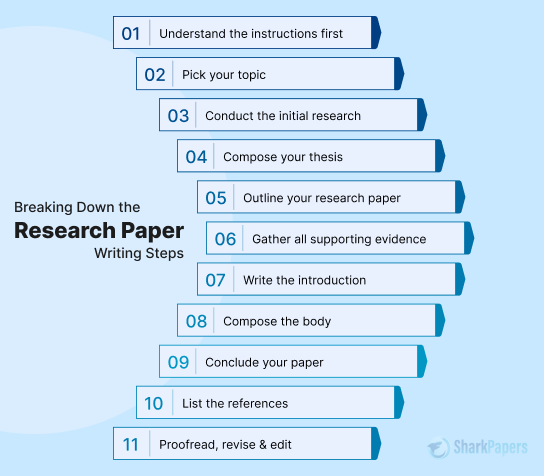
- Best 300+ Ideas For Research Paper Topics in 2024

- A Complete Guide to Help You Write a Research Proposal

- The Definitive Guide on How to Start a Research Paper
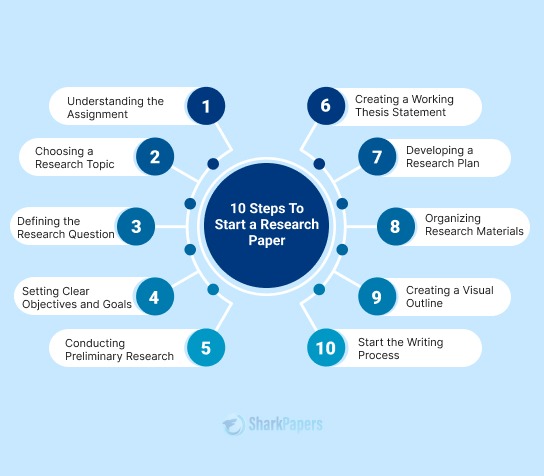
- How To Write An Introduction For A Research Paper - A Complete Guide

- Learn How To Write An Abstract For A Research Paper with Examples and Tips

- How to Write a Literature Review for a Research Paper | A Complete Guide

- How To Write The Methods Section of A Research Paper
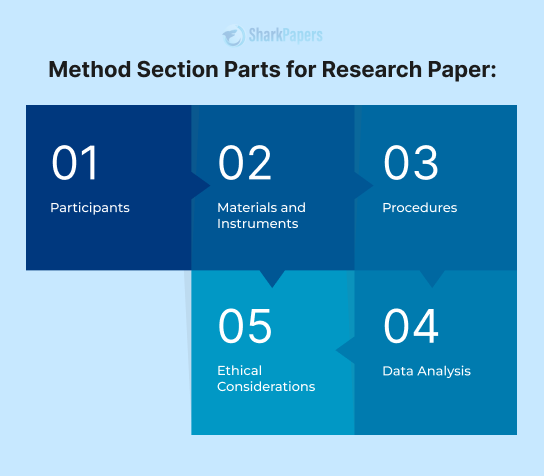
- How to Write a Research Paper Thesis: A Detailed Guide

- How to Write a Research Paper Title That Stands Out

- A Detailed Guide on How To Write a Conclusion for a Research Paper

- How To Write The Results Section of A Research Paper | Steps & Tips

- How to Problem Statement for a Research Paper: An Easy Guide

- How to Find Credible Sources for a Research Paper
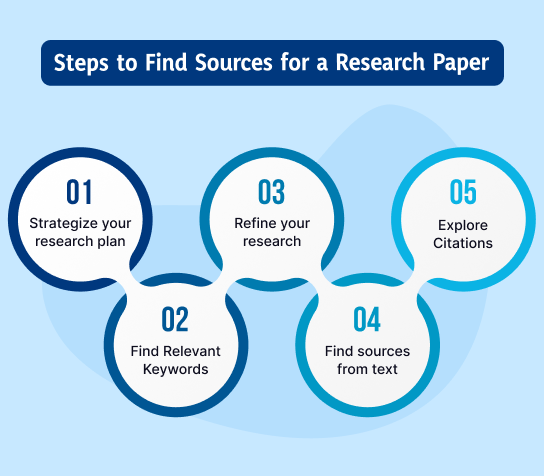
- A Detailed Guide: How to Write a Discussion for a Research Paper
)
- How To Write A Hypothesis In A Research Paper - A Simple Guide

- Learn How To Cite A Research Paper in Different Formats: The Basics

- The Ultimate List of Ethical Research Paper Topics in 2024

- 150+ Controversial Research Paper Topics to Get You Started
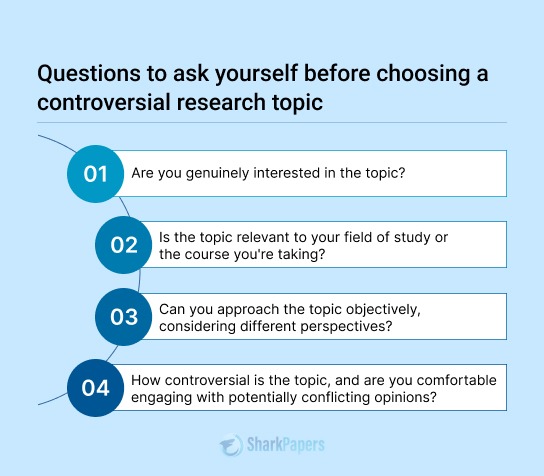
- How to Edit Research Papers With Precision: A Detailed Guide

- A Comprehensive List of Argumentative Research Paper Topics
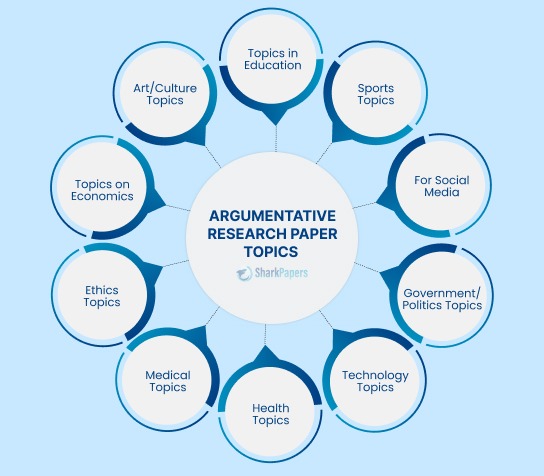
- A Detailed List of Amazing Art Research Paper Topics

- Diverse Biology Research Paper Topics for Students: A Comprehensive List
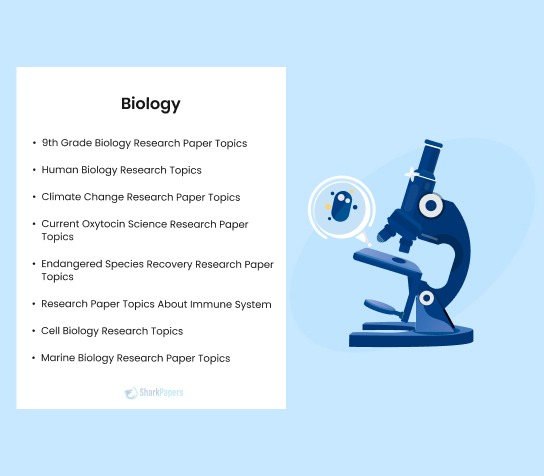
- 230 Interesting and Unique History Research Paper Topics

- 190 Best Business Research Paper Topics
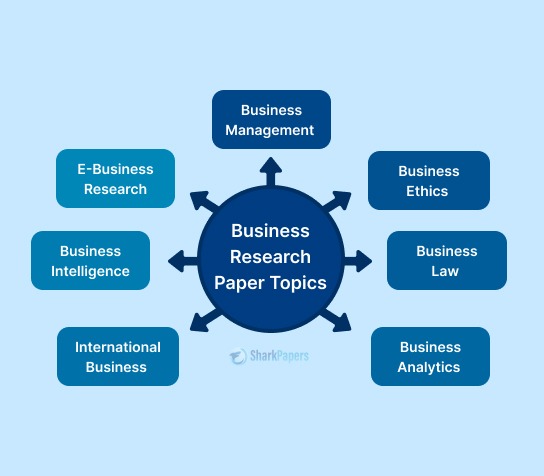
- 200+ Engaging and Novel Literature Research Paper Topics
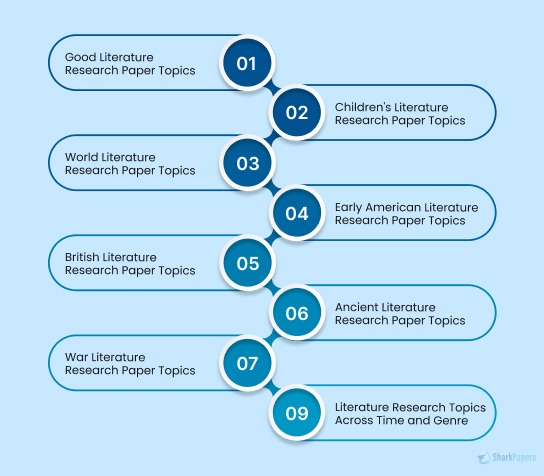
- A Guide on How to Write a Social Science Research
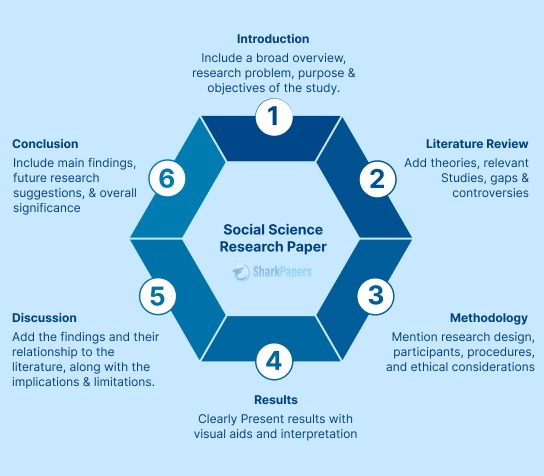
- Sociology Research Papers: Format, Outline, and Topics
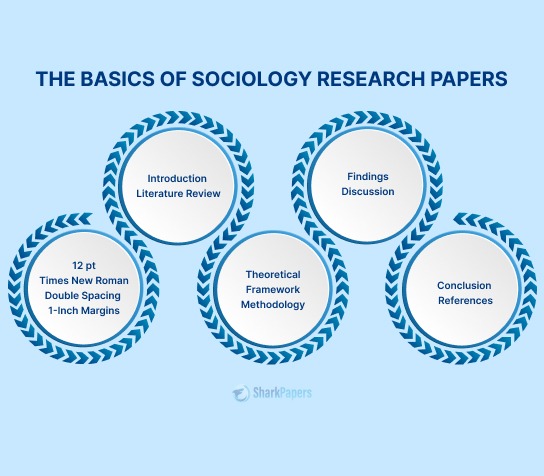
- How to Write a Psychology Research Paper: Guide with Easy Steps

- Exploring the Different Types of Research Papers: A Guide
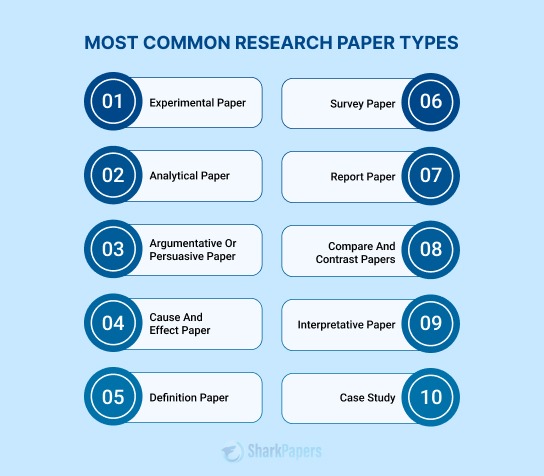
People Also Read
- qualitative research
- research proposal
- ieee citation
- informative speech topics
- research paper outline
Burdened With Assignments?

Advertisement
© 2024 - All rights reserved
2000+ SATISFIED STUDENTS
95% Satisfaction RATE
30 Days Money Back GUARANTEE
95% Success RATE
Privacy Policy | Terms & Conditions | Contact Us
© 2021 SharkPapers.com(Powered By sharkpapers.com). All rights reserved.
© 2022 Sharkpapers.com. All rights reserved.
LOGIN TO YOUR ACCOUNT
SIGN UP TO YOUR ACCOUNT
- Your phone no.
- Confirm Password
- I have read Privacy Policy and agree to the Terms and Conditions .
FORGOT PASSWORD
- SEND PASSWORD

200 Biology Research Topics For High School
Research papers are an integral part of high school. A detailed research paper is required in most of the subjects, and one just cannot back out, as this is a part of their curriculum. However, what is even more laborious than writing the whole research paper? Finding a good topic!
The same goes for biology. Although there are plenty of topics out there that a student can write about, choosing a relevant topic is often a taxing job since they may need to brainstorm various factors. However, it can be disentangled with clarity and appropriate counsel.
While this subject deals with various areas like cells, animals, plants, and human anatomy; in this post, we would appraise you with 200 biology research topics handpicked for aspiring high schoolers, to make their task easier.
Biology Research Topics- Finding the Right one
Choosing the right topic can be a long expedition. However, it can be effortless when students are clear about their requirements personally and academically. To discern the same, it can be a fair idea to look into some crucial attributes that can lead a high schooler towards a desired biology research topic.
- Know your niche
Learners often have one or more notions that they feel enticing to learn and travel with. For instance, a student may like to learn and work in cell biology, while another may love studying more about genetics. Knowing the niche in which they can excel can make their topic selection facile.
- Stick to one Narrow topic
After comprehending the choice of the niche, the scholar may need to narrow down to one topic which is intriguing and manageable at the same time. Evidently, “Study of Mitochondria and its benefits ” is a better choice than “Cell biology”. Choosing a righteous narrow topic may mitigate the constraints like taxing research and report length later.
- Consult mentors and Peers
Instructors are always available to answer the queries of pupils. Students can take their inputs to add strength to their research topics. Mentors not only assist to choose the right topic but also can advise a few changes in the choice to make it finer. Say, a student has chosen “Study of DNA”, the mentor can suggest modifying it to ”Role of DNA in Curing Diseases”. Brainstorming sessions with peers may also ameliorate the topic decision
- Ensure the School Regulations
High school research is often guided by some crucial regulations to stipulate students work efficiently. Students may need to choose a topic somehow related to the academic syllabus. Further, they may be stimulated to address burning issues to create awareness. Adhering to the guidelines can mitigate the need for rectifications later.
200 Biology Research Topics- To Start With Right Away
High School biology has several sections to choose from, which may make it taxing for students to resolute on one choice. Here is a sizable list of 201 biology research topics for high schoolers which they can start instantly:
Cell Biology
- Animal cell and its structure
- Functions of Cells
- Mitochondria- the PowerHouse of cell
- Functions of an RBC- How does it transfer Oxygen?
- Functions of a WBC- How does it retain immunity?
- Components of Plant Cell
- Plant Cell Vs. Animal Cell
- Cell Division
- Mitosis Vs. Meiosis
- Bacteria- How is it different from cells?
- Cell structure and antibiotic Resistance
- What are cancer cells? Are they Dangerous?
- Mushrooms and Molds- A brief Study of Fungi
- Curing Cancer Cells
- Stem Cells- A brief Study
- Embryonic vs Induced Pluripotent Stem Cells
- Adults vs Induced Pluripotent stem Cells
- The Build of Human DNA
- Components of DNA
- Chromosomes- A brief Study
- Double Helix Structure of DNA
- Singled celled Organisms and their DNA
- Bacteria and its DNA
- X and Y chromosomes
- Genetic INformation in DNA
- DNA modification- Its application in medicine
- Cancer and DNA modification
- DNA of dinosaurs
- Do plants have DNA?
Molecular Biology
- Gene- A Brief History
- Components of Gene
- Drugs for Humans
- Vaccine vs Drugs
- A brief study of Gregor Mendel
- Dominant vs recessive genes
- Widow’s peak illustration of Genes
- What is mutation?
- Hormones and their functions
- Artificial hormones for animals
- PCR tests for analyzing DNA
- Structure of a Molecule
- Structure of prion
- DNA transcription-Its applications
- Central Dogma
- Heredity and traits
NeuroBiology
- Human Nervous System- A brief description
- Structure and components of neurons.
- Neurons vs Animal cell
- A brief study of electric pulses in the human brain
- Altering reaction speed in the brain
- Alzheimer’s disease- its study in genetics
- Neurobiological Degeneration- does it have a cure?
- Brain injuries and cures
- Spinal Cord Injuries and cures
- Narcolepsy
- A brief study of mental health with neurobiology
- Various emotions and their neural pulses
- A brief study of the human neurological system
Genetics
- A brief study of ancient cloning techniques
- Reasons behind Abortion. Is it ethical
- Procedure of abortion
- What is human cloning?
- Side effects of Human Cloning
- Goals of Human Cloning
- Transplantation vs Human Cloning
- Perfect child theory. Is it ethical?
- Gene cloning- Removal of undesirable traits.
- Genes and ethics
- Gene therapy
- Gene therapy vs Cloning
- Curing Cancer with Gene therapy
- Cons of Cloning
Environment and Ecology
- A Brief Study of Charles Darwin
- The Evolution Theory
- Natural Selection- the complete study
- Mutation- A brief study with examples
- Adaptations in animals- Study with 5 examples
- Divergent evolution
- Convergent evolution
- Parallel Evolution
- Components of a sustainable environment
- Environmental Friendly Practices
- Role of Plastics in pollution
- Alternatives for Plastic
- Deforestation
- Solutions for Deforestations
- Ecological concerns
- History of the Ozone layer
- Change in ecology- A study of extinct animals
- Effects of Fast Food factories
- Reversing ecological changes
- Climate changes and their effects
- Global Warming
- GreenHouse effect
Plants And Animals
- A study of Endangered animals
- Melatonin therapy
- Benefits of growing plants in the home
- A brief study of popular plant diseases
- Effects of pesticides and herbicides
- Immunity in plants
- The Banana Pandemic
- Weedy and Invasive Plants
- Genetic analysis of plants
- Medicinal plants- A brief study
- Evolution in plants
- Plants in Food production
- Components of Photosynthesis
- A brief study of Phytohormones
- Antibiotics and phytocides
- A detailed study of Stomata structure
- Grafting techniques
- Roots and stem modification
- Real-life examples of taxonomy
- Study of sweet potato Virus
- Classifications of animals
- Evolution of marine life
- Prehistoric aquatic life- study of enormous creatures
- Evolution of land-based life
- Zoos and petting- are they ethical?
- Drug testing on animals
- A brief study of cows and their benefits on Humans
- Food chain and classification
- Vegans vs carnivores
- Resistance in animals
- Behavioral changes in animals due to evolution
- A brief study of intelligence in animals
- Migration of birds- a brief study.
- Study of extinct species and bringing back them
- Types of dinosaurs
- Male pregnancy in animals
Marine Biology
- Oil spilling in the ocean- strategies to mitigate
- Ocean Acidification and its effects
- Evolution in aquatic animals
- Camouflage mechanism
- Petting marine species
- Study on Ultrasonic communication in whales
- Role of marine shows and debate on its ethics
- Are mermaids real?
- A study of immortal marine species
- Plankton and its medicinal uses
- Underwater ecologies
- Freshwater And Seawater
- A brief study of coral reefs
- Medicinal values of coral reef plants
- Tectonic plates and underwater earthquakes
Cardiovascular
- Heart Rhythm and Arrhythmias
- Preventive Cardiology
- Hypertension
- InterventionalCardiology
- Heart Failure (Myocardial Biology)
- Heart Disease in various age groups
- Signs, symptoms and first aid for Heart Disease.
- A study of ECG and other apparatus
Hormone Biology
- Pregnancy and hormonal changes
- Bipolar Disorder
- Endocrine and related diseases
- MEntal health in different genders.
- Stress and immunity
Reproductive System
- Cervical Cancer and its cure
- A brief study of puberty
- Contraception
- Infertility
- Test tube babies
- The concept of surrogacy
- Tubectomy and vasectomy
- Male Reproductive complications and their cures
- Female reproductive complications and their cure
Digestive System
- Gastrointestinal tract- a brief study
- Components of Digestive systems
- A brief study of stomach and liver
- Functions of intestines
Skeletal System
- The function of the skeletal system
- Type of bones
- Functions of Sesamoid bones
- Foods for healthy bones
- A brief study of Spinal Cord
Excretory System
- The detailed study on Kidney and its Function
- Gross Anatomy of the Urinary System
- Reasons for Renal Calculi (Kidney Stones) and cures
Miscellaneous
- Coordination between muscular system and skeletal system
- Benefits of ecotourism
- Extinction of bees- A brief study
- The green revolution
- US Grain economy
- Agricultural practices for more yield
- World trade of food
- A brief study of Covid 19
- Renewable energies and their effect on plants
- Bacteria and depression
- Genes and neuron functions
- Robotic surgeries- the study of the future.
- Benefits of organic farming
- Study of various components of flower and a fruit
- Diet and obesity
- Various components of Brain
- Diabetes and its cure
- CRISPR and Genetic Engineering
- A brief on Cell tissue engineering
Having a large number of alternatives often creates incertitude. The topics we put forward are all worth considering. Determining your area of interest can make your choice facile. For instance, if you feel genetics enticing, prefer choosing relevant topics. You may consider consulting researchers, faculty and pertinent professionals to add muscle to your research. Review our picks to see if any of those can fit your choice in making a credible research paper.

Sananda Bhattacharya, Chief Editor of TheHighSchooler, is dedicated to enhancing operations and growth. With degrees in Literature and Asian Studies from Presidency University, Kolkata, she leverages her educational and innovative background to shape TheHighSchooler into a pivotal resource hub. Providing valuable insights, practical activities, and guidance on school life, graduation, scholarships, and more, Sananda’s leadership enriches the journey of high school students.
Explore a plethora of invaluable resources and insights tailored for high schoolers at TheHighSchooler, under the guidance of Sananda Bhattacharya’s expertise. You can follow her on Linkedin
Leave a Comment Cancel reply
Save my name, email, and website in this browser for the next time I comment.
- Buy Custom Assignment
- Custom College Papers
- Buy Dissertation
- Buy Research Papers
- Buy Custom Term Papers
- Cheap Custom Term Papers
- Custom Courseworks
- Custom Thesis Papers
- Custom Expository Essays
- Custom Plagiarism Check
- Cheap Custom Essay
- Custom Argumentative Essays
- Custom Case Study
- Custom Annotated Bibliography
- Custom Book Report
- How It Works
- +1 (888) 398 0091
- Essay Samples
- Essay Topics
- Research Topics
- Uncategorized
- Writing Tips
Biology Research Paper Topics: Uncovering New Ideas
June 19, 2023
A good biology research topic can be a great way to get a head start on your academic career. The following list of topics is a great starting point for your search. These are the most popular topics in the field of biological sciences, but they are by no means the only ones you can choose from!
What Is Biology?
Biology is the science that deals with living things, from origins to behavior, and of how and why they change. Biology is also the study of how living things work. Some people believe that biology had its beginnings in the ancient Greek philosopher Aristotle. Others believe that biology began with the work of English scientist Robert Hooke in the 1660s.
Biology is divided into a number of different branches. These comprise:
- cellular biology, which deals with cells;
- genetics, dealing with heredity;
- molecular biology, studying the molecular level;
- embryology, which studies development from conception through birth;
- evolutionary biology, which studies how species develop over time;
- physiology, which focuses on how organisms function at all levels (from single cells up to entire ecosystems);
- ethology (or behavioral ecology), which examines animal behavior in its natural environment.
How to Choose Biology Research Topic?
Selecting a biology research topic can be a difficult task. There are many different areas of research and many different types of experiments that you can do. However, it is easy to get overwhelmed by all the options available to you. The following list provides some suggestions for choosing your biology project topic:
- Think about what interests you most in biology. Is there a specific disease that you want to study? Do you want to find out why certain organisms live where they do? Are there any questions or problems that interest you?
- Check with your teacher or ask an expert in the field what kinds of projects they recommend their students do. Sometimes teachers will have lists of approved topics that they give their students, or they may have some tips for choosing a particular area of study for your research project.
- Look at previous projects that have been done in your college, school, or city (if applicable), as well as those from other schools around the world, to see if there are any ideas that appeal to you based on these findings. If this idea does not work out, try something else until you find one that does!
Biology Research Topics for Students
- The role of microbiota in human health and disease
- Novel targets for cancer therapy using genomic and proteomic approaches
- Neurodegeneration in Alzheimer’s disease
- Epigenetic regulation of gene expression in development and disease
- Effects of climate change on biodiversity and ecosystem function
- Immune system function
- The importance of gut-brain axis in regulating behavior and neurological disorders
- Stem cell differentiation
- The impact of environmental toxins on human health and development
- Novel gene therapies for genetic disorders and rare diseases
- Circadian rhythms and their impact on health
- Analyzing the mechanisms underlying aging and age-related diseases
- Tthe ecological and evolutionary factors driving speciation and diversification
- Drug resistance in cancer and infectious diseases
- The genetic and environmental factors contributing to obesity and metabolic disorders
- Protein folding and misfolding in disease
- The influence of microbial communities on ecosystem processes and services
- Developing novel biomaterials for tissue engineering and regenerative medicine
- The evolutionary history of human populations and migration patterns
- Plant-microbe interactions and their ecological impact
Research Topics in Cell Biology
- Protein trafficking and secretion in cells
- The role of autophagy in cellular homeostasis and disease
- The regulation of mitosis and cell cycle progression
- DNA damage and repair in cells
- Apoptosis and programmed cell death
- The importance of membrane receptors in signal transduction and cell communication
- RNA processing and gene expression regulation
- Neurodegenerative diseases
- The role of extracellular matrix in cell adhesion, migration, and tissue organization
- Cellular differentiation and development
- Ion channels and transporters in cells
- The role of cytoskeleton in cell structure, motility, and division
- Cell-cell interactions and communication
- The cellular and molecular basis of cancer and metastasis
- Mitochondria in cellular metabolism and energy production
- Protein folding and misfolding in cells
- Membrane transporters in cells
- The impact of epigenetics on gene expression and cellular differentiation
- Cell death pathways in cancer therapy
- Studying the cellular and molecular basis of immune system function and regulation
Zoology Research Topics
- The evolutionary origins and diversification of animal phyla
- The mechanisms of animal behavior and communication
- The ecological and evolutionary dynamics of animal populations and communities
- Investigating the molecular mechanisms of animal development and regeneration
- The physiological adaptations of animals to extreme environments
- The role of symbiotic relationships in animal evolution and ecology
- The mechanisms of animal locomotion and movement
- Animal physiology and metabolism
- The impact of climate change on animal behavior, ecology, and evolution
- Animal immune system peculiarities
- Studying the ecology and conservation of endangered species and biodiversity
- The impact of animal behavior on social organization and cooperation
- Animal vision, hearing, and sensory perception
- Animal reproduction and development
- The ecological and evolutionary factors driving animal migration and dispersal
- Animal cognition and learning
- The physiology and behavior of animal models for human diseases
- The impact of anthropogenic activities on animal populations and ecosystems
- Animal adaptation to changing environments
- The ecological and evolutionary significance of animal symbiosis and parasitism
Anatomy Research Topics
- Tissue differentiation
- Organogenesis and morphogenesis
- The functional anatomy of the nervous system
- The anatomical basis of movement and locomotion
- The anatomy and physiology of the cardiovascular system
- The role of connective tissue in musculoskeletal function and repair
- Respiratory function and gas exchange
- Skin development and wound healing
- The functional anatomy of the digestive system
- Sensory perception and neural processing
- Human reproductive function
- The functional anatomy of the urinary system
- Bone forming and remodeling
- The anatomy and physiology of the endocrine system
- The role of lymphatic and immune systems in health and disease
- Investigating the anatomical basis of hearing and balance
- Studying the cellular basis of the visual system
- The functional anatomy of the autonomic nervous system
- The molecular mechanisms of muscle function and adaptation
- The renal system and fluid balance
Molecular Biology Research Topics
- DNA replication and repair
- Gene expression and regulation
- The molecular pathways of protein synthesis and degradation
- Signal transduction and cellular communication
- Cellular differentiation and development.
- Genetic diseases and disorders
- Drug resistance and pharmacogenomics
- Cancer development and progression
- Viral and bacterial infections
- Protein-protein interactions and complexes
- RNA processing and regulation
- Metabolic pathways and regulation
- Epigenetic modifications and chromatin remodeling
- Protein structure and function
- Membrane transport and ion channels
- Cellular stress responses and adaptation
- Mitochondrial function and metabolism
- Stem cell differentiation and reprogramming
- The molecular basis of aging and longevity
- Neurodegenerative diseases and disorders
Marine Biology Research Topics
- The ecological role of marine biodiversity in marine ecosystems
- The effects of climate change on marine biodiversity and ecosystems
- The behavior and migration patterns of marine mammals
- The role of marine predators in food webs and trophic cascades
- The impact of pollution and anthropogenic activities on marine ecosystems
- The genetics and evolution of marine species
- The physiological adaptations of marine organisms to extreme environments
- The ecology and conservation of coral reefs
- The role of marine microbes in nutrient cycling and biogeochemistry
- The dynamics of marine communities and population ecology
- The influence of ocean acidification on marine organisms and ecosystems
- The behavior and ecology of deep-sea organisms
- The biology and ecology of marine invertebrates
- The molecular mechanisms of marine bioluminescence
- The importance of marine viruses in shaping marine ecosystems
- The role of marine protected areas in conservation and management
- The ecology and evolution of marine fishes
- Impact of overfishing and bycatch on marine ecosystems
- Investigating the role of marine ecosystems in global carbon cycling
- Studying the biology and ecology of marine turtles
Biology Research: Why You Could Need Professional Help
Biology research is a vast subject. It covers many different fields, each requiring a different level of expertise. Not only does it require specialized knowledge in the field, but also the ability to communicate that knowledge to others. Students may become frustrated with their biology research project if they don’t have the right resources or experience.
Are you a biology student and looking for custom writing services? If yes, then you have come to the right place. Our custom writing service is here to help you with assignments in any field of study. With our highly skilled writers and top-notch customer support team, we guarantee that your research paper will be completed on time and to your full satisfaction.
At CustomWriting, we provide custom essays, term papers, research papers, thesis, and dissertations written by professional academic writers. We guarantee complete confidentiality and 100% plagiarism-free work!
Sociology Research Topics Ideas
Importance of Computer in Nursing Practice Essay
History Research Paper Topics For Students
By clicking “Continue”, you agree to our terms of service and privacy policy. We’ll occasionally send you promo and account related emails.
Latest Articles
Navigating the complexities of a Document-Based Question (DBQ) essay can be daunting, especially given its unique blend of historical analysis...
An introduction speech stands as your first opportunity to connect with an audience, setting the tone for the message you...
Embarking on the journey to write a rough draft for an essay is not just a task but a pivotal...
I want to feel as happy, as your customers do, so I'd better order now
We use cookies on our website to give you the most relevant experience by remembering your preferences and repeat visits. By clicking “Accept All”, you consent to the use of ALL the cookies. However, you may visit "Cookie Settings" to provide a controlled consent.
Thank you for visiting nature.com. You are using a browser version with limited support for CSS. To obtain the best experience, we recommend you use a more up to date browser (or turn off compatibility mode in Internet Explorer). In the meantime, to ensure continued support, we are displaying the site without styles and JavaScript.
- View all journals
- Explore content
- About the journal
- Publish with us
- Sign up for alerts
Latest science news, discoveries and analysis

China's Moon atlas is the most detailed ever made

‘Shut up and calculate’: how Einstein lost the battle to explain quantum reality

Rat neurons repair mouse brains — and restore sense of smell

Mini-colon and brain 'organoids' shed light on cancer and other diseases
Scientists urged to collect royalties from the ‘magic money tree’, first glowing animals lit up the oceans half a billion years ago, plastic pollution: three numbers that support a crackdown, the maldives is racing to create new land. why are so many people concerned, ecologists: don’t lose touch with the joy of fieldwork chris mantegna.

Should the Maldives be creating new land?

Lethal AI weapons are here: how can we control them?

Algorithm ranks peer reviewers by reputation — but critics warn of bias

How gliding marsupials got their ‘wings’
Bird flu in us cows: is the milk supply safe, nato is boosting ai and climate research as scientific diplomacy remains on ice, hello puffins, goodbye belugas: changing arctic fjord hints at our climate future, nih pay raise for postdocs and phd students could have us ripple effect.

Retractions are part of science, but misconduct isn’t — lessons from a superconductivity lab

Any plan to make smoking obsolete is the right step

Citizenship privilege harms science
European ruling linking climate change to human rights could be a game changer — here’s how charlotte e. blattner, will ai accelerate or delay the race to net-zero emissions, current issue.

Surprise hybrid origins of a butterfly species
Stripped-envelope supernova light curves argue for central engine activity, optical clocks at sea, research analysis.

Ancient DNA traces family lines and political shifts in the Avar empire
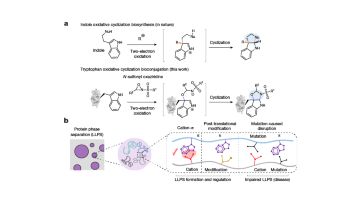
A chemical method for selective labelling of the key amino acid tryptophan

Robust optical clocks promise stable timing in a portable package

Targeting RNA opens therapeutic avenues for Timothy syndrome
Bioengineered ‘mini-colons’ shed light on cancer progression, galaxy found napping in the primordial universe, tumours form without genetic mutations, marsupial genomes reveal how a skin membrane for gliding evolved.

Breaking ice, and helicopter drops: winning photos of working scientists

Shrouded in secrecy: how science is harmed by the bullying and harassment rumour mill
How ground glass might save crops from drought on a caribbean island, londoners see what a scientist looks like up close in 50 photographs, books & culture.

How volcanoes shaped our planet — and why we need to be ready for the next big eruption

Dogwhistles, drilling and the roots of Western civilization: Books in brief

Cosmic rentals
Las borinqueñas remembers the forgotten puerto rican women who tested the first pill, dad always mows on summer saturday mornings, nature podcast.

Latest videos
Nature briefing.
An essential round-up of science news, opinion and analysis, delivered to your inbox every weekday.
Quick links
- Explore articles by subject
- Guide to authors
- Editorial policies

IMAGES
VIDEO
COMMENTS
Research Topics in Biology for Undergraduates. 41. Investigating the effects of pollutants on local plant species. Microbial diversity and ecosystem functioning in a specific habitat. Understanding the genetics of antibiotic resistance in bacteria. Impact of urbanization on bird populations and biodiversity. Investigating the role of pheromones ...
3.9 15 Plant Pathology Biology Research Topics. 3.10 15 Animals Biology Research Topics. 3.11 15 Marine Biology Research Topics. 3.12 15 Zoology Research Topics. 3.13 15 Genetics Research Topics. 3.14 15 Biotechnology Research Topics. 3.15 15 Evolutionary Biology Research Topics. Biology is one of the most magnetic fields of study these days ...
Biological Psychology Research Paper Topics. Neurotransmitters and Behavior: Examining the Role of Dopamine, Serotonin, and Acetylcholine. Neuroplasticity: Implications for Learning, Memory, and Brain Rehabilitation. Brain Imaging Techniques: Advances in Functional Magnetic Resonance Imaging (fMRI) and Neuroimaging.
A List of Researchable Topics for Biology. A list of researchable topics for biology students starts with several interesting biological topics concerning sociological perspective and ethical issues. The most debatable subjects are abortion, human cloning, genetic researches and the new ethics that should be created to resolve these issues.
Biology Research Paper Topics. You'd need to write an extensive paper on biology one day. This could be when you're in your final year in college or the university or submitting to a competition. You'd need Biology topics to research for brainstorming, and here are 30 of them: Stem cells and tissue formation processes
She is the winner of the 2015 Stony Brook Fiction Prize, and her short stories have been published in Mid-American Review, Cutbank, Sonora Review, New Orleans Review, and The Collagist, among other magazines. The 49 most interest biology research topics are explored. We also offer links to variety of resources for research topics in biology.
Biology Research Topics. Biology Research Topics are as follows: The role of gut microbiota in human health and disease. The effects of climate change on animal behavior and physiology. The molecular mechanisms of cancer development and progression. The evolutionary origins of human language. The impact of pesticides on insect populations and ...
Molecular Biology Research Topics For Undergraduates. 31. Studying the structure and function of DNA and RNA molecules. 32. Analyzing the regulation of gene expression in eukaryotic cells. 33. Investigating the mechanisms of DNA replication and repair. 34. Studying the role of non-coding RNAs in gene regulation.
Marine Biology Research Paper Topics: The impact of climate change on coral reef ecosystems. The role of marine protected areas in conserving biodiversity. The effects of ocean acidification on marine organisms. Investigating the behavior and communication patterns of marine mammals. The ecological significance of seagrass meadows in coastal ...
200 Distinctive Biology Research Topics to Write a Killer Paper. Biology research topics are crucial for students as they deepen their understanding of the natural world and its intricate processes. Engaging with these topics fosters critical thinking, analytical skills, and scientific literacy.
Top 50 Life and Biological Sciences Articles. We are pleased to share with you the 50 most read Nature Communications articles* in life and biological sciences published in 2019. Featuring authors ...
To make things as simple as possible for you, we've put together a list of biology research project ideas. You will find 100 topics on various subjects below. Of course, you can use any of our topics for free. However, keep in mind that even though we are doing our best to maintain this list fresh, other students will find it as well.
The concept includes anatomy, physiology, cell biology, biochemistry and biophysics, and covers all organisms from microorganisms, animals to plants. ... Research Highlights 22 Apr 2024 Nature ...
Featuring authors from around the world, these papers highlight valuable research from an international community. Browse all Top 50 subject area collections here .
Some biology topics are easier for non-biologists to get more excited about than others, though. Whether you're looking for a research topic for a college paper or an area to specialize in if you're majoring in biology, here are some of the most interesting things going on in the biology world right now. 1. CRISPR and Genetic Engineering
The Ultimate Compilation of Unique Biology Research Paper Topics. Studying biology is essential for us to comprehend the intricacies of life. That is why students are often asked to research the subject. One of the most important parts of this process is choosing the right topic about biology.
See our list of biology research paper topics . Biology (from the Greek bios, meaning "life") is the science of all forms of life, including plants, animals, and microorganisms. Biology is composed of many fields, including microbiology, the study of microscopic organisms such as viruses and bacteria; cytology, the study of cells ...
Stem cells are thought to alleviate the damage caused by chemotherapy drugs and to play role... YuSheng Zhang, YaNan Liu, Zi Teng, ZeLin Wang, Peng Zhu, ZhiXin Wang, FuJun Liu and XueXia Liu. Biological Research 2023 56 :47. Research article Published on: 13 August 2023.
113 Great Research Paper Topics. Posted by Christine Sarikas. General Education. One of the hardest parts of writing a research paper can be just finding a good topic to write about. Fortunately we've done the hard work for you and have compiled a list of 113 interesting research paper topics. They've been organized into ten categories and ...
A compelling topic for a biology research paper could be "The Impact of CRISPR-Cas9 Gene Editing on Genetic Diseases." This topic allows exploration into the revolutionary gene-editing technology and its potential to treat or prevent genetic disorders, offering insights into the ethical considerations and future implications of genomic interventions.
Cell biology is the discipline of biological sciences that studies the structure, physiology, growth, reproduction and death of cells. Research in cell biology uses microscopic and molecular tools ...
200 Biology Research Topics For High School. February 2, 2022 by Sananda Bhattacharya. Research papers are an integral part of high school. A detailed research paper is required in most of the subjects, and one just cannot back out, as this is a part of their curriculum. However, what is even more laborious than writing the whole research paper ...
Biology Research Paper Topics: Uncovering New Ideas. June 19, 2023. A good biology research topic can be a great way to get a head start on your academic career. The following list of topics is a great starting point for your search. These are the most popular topics in the field of biological sciences, but they are by no means the only ones ...
Find breaking science news and analysis from the world's leading research journal.